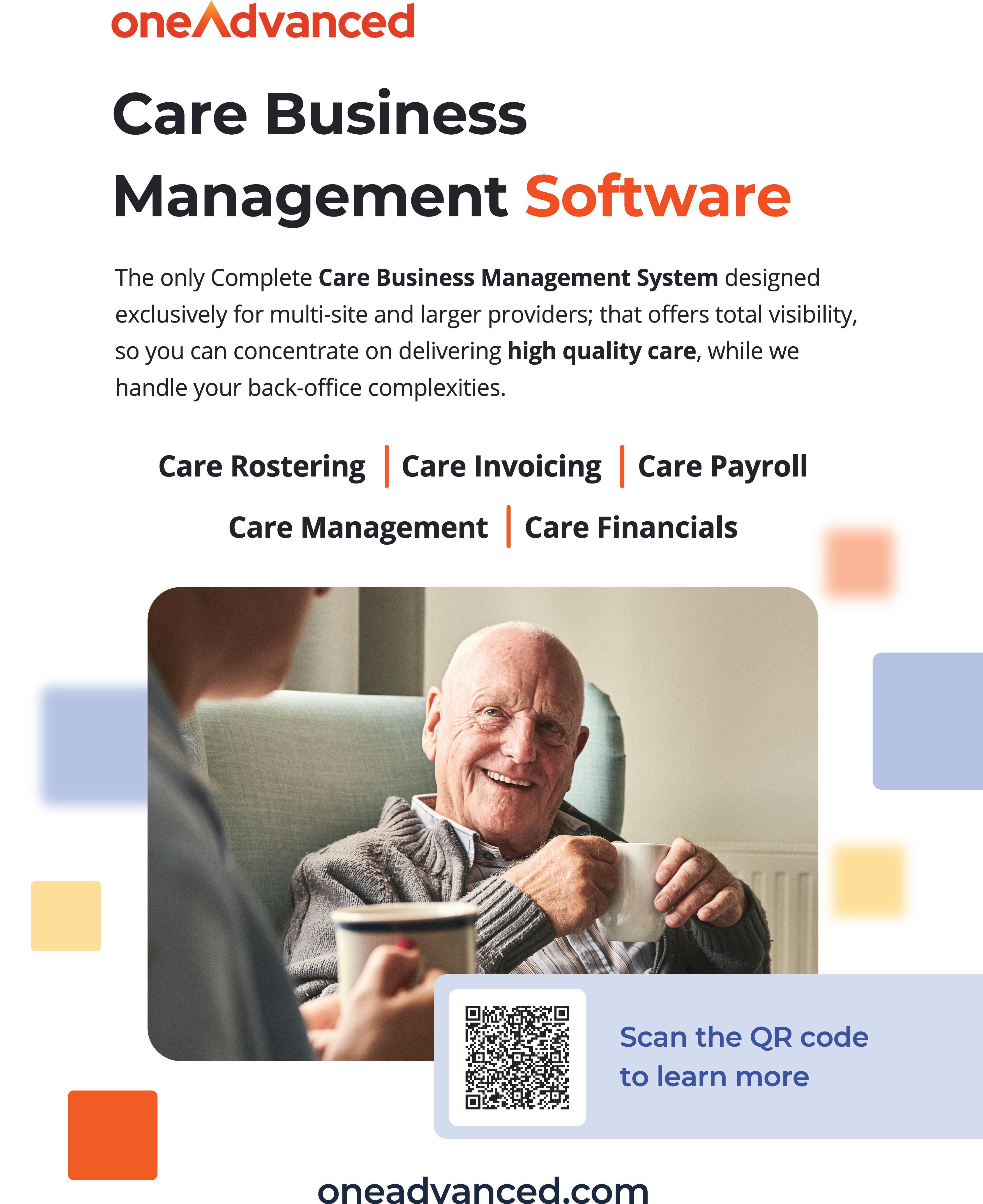

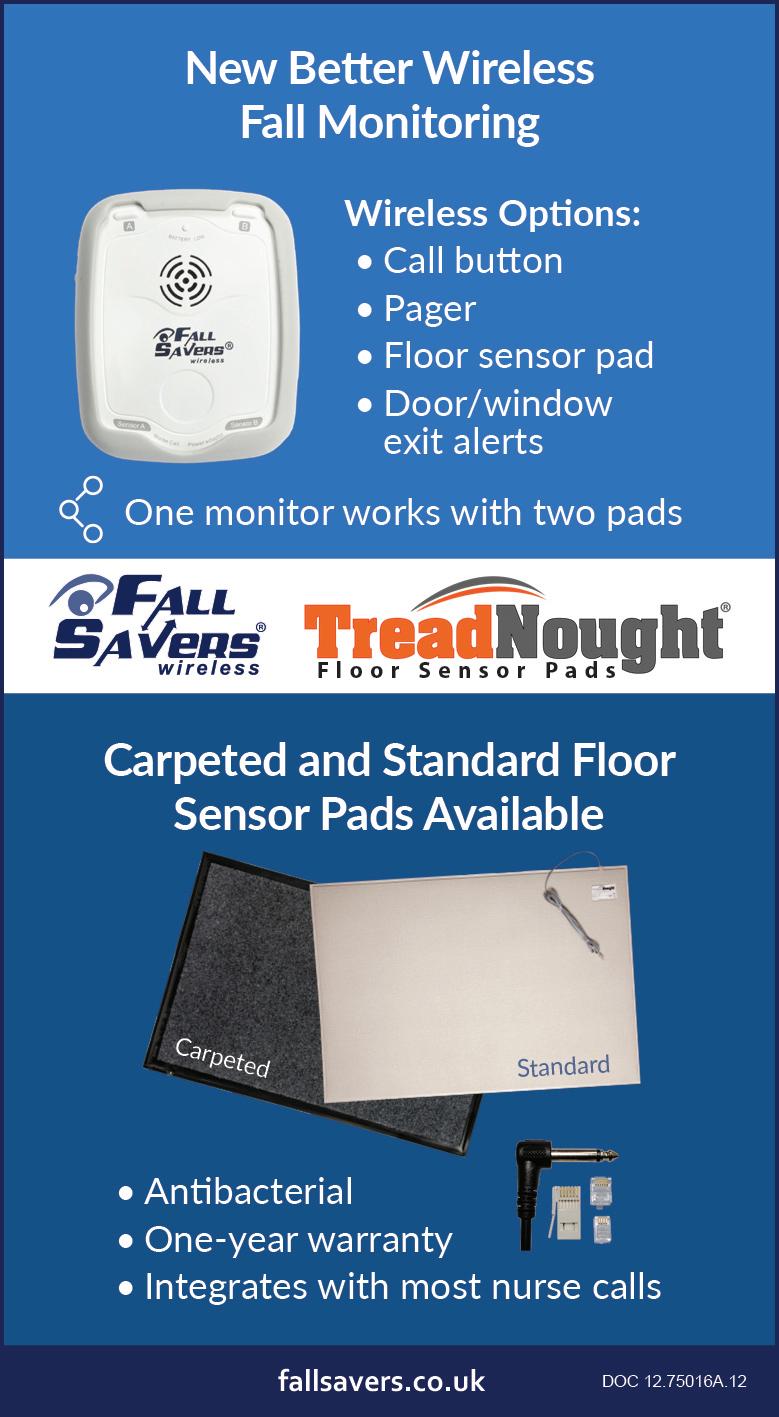













Local authority budgets for social care were overstretched by £774 million last year to meet the legal duty to provide care and support, recording the highest overspends in a decade, according to the latest annual survey from the Association of Directors of Adult Social Services (ADASS).
Local authorities across England have been forced to cut prevention spending by over 10% this year as adult social care costs continue to spiral out of control.
The organisation’s Spring Survey, released yesterday (July 15), paints a stark picture of a system under unprecedented strain. Prevention spending has plum-
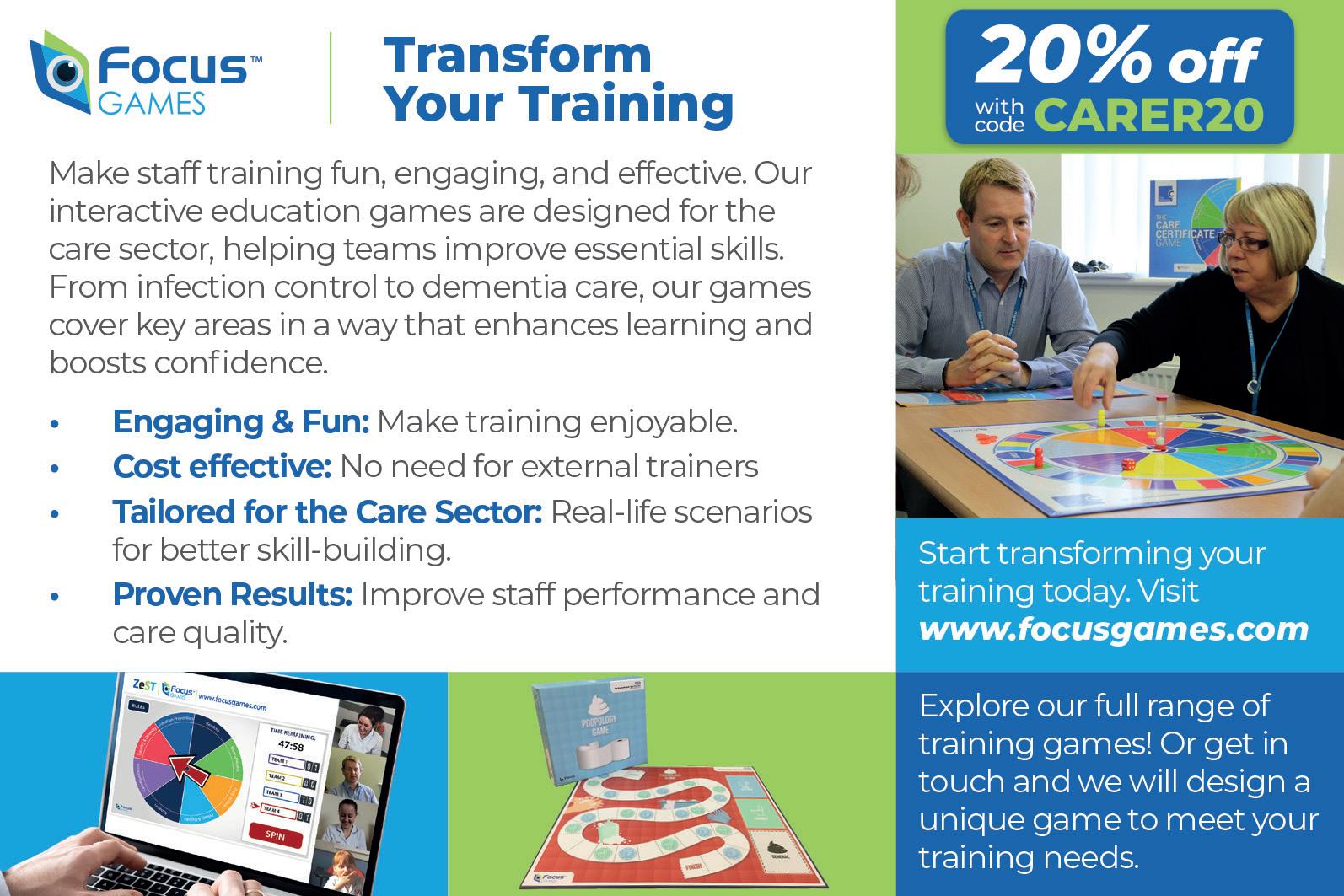
meted to £1.3 billion, its lowest level since 2021/22, as cash-strapped councils are forced to prioritise crisis interventions over early support services.
The survey findings highlight how mounting financial pressures are pushing local authorities into “crisis mode” operations. With escalating care costs and dwindling resources, councils are increasingly unable to invest in the preventative measures that could help residents maintain their independence longer.
(CONTINUED ON PAGE 3...)
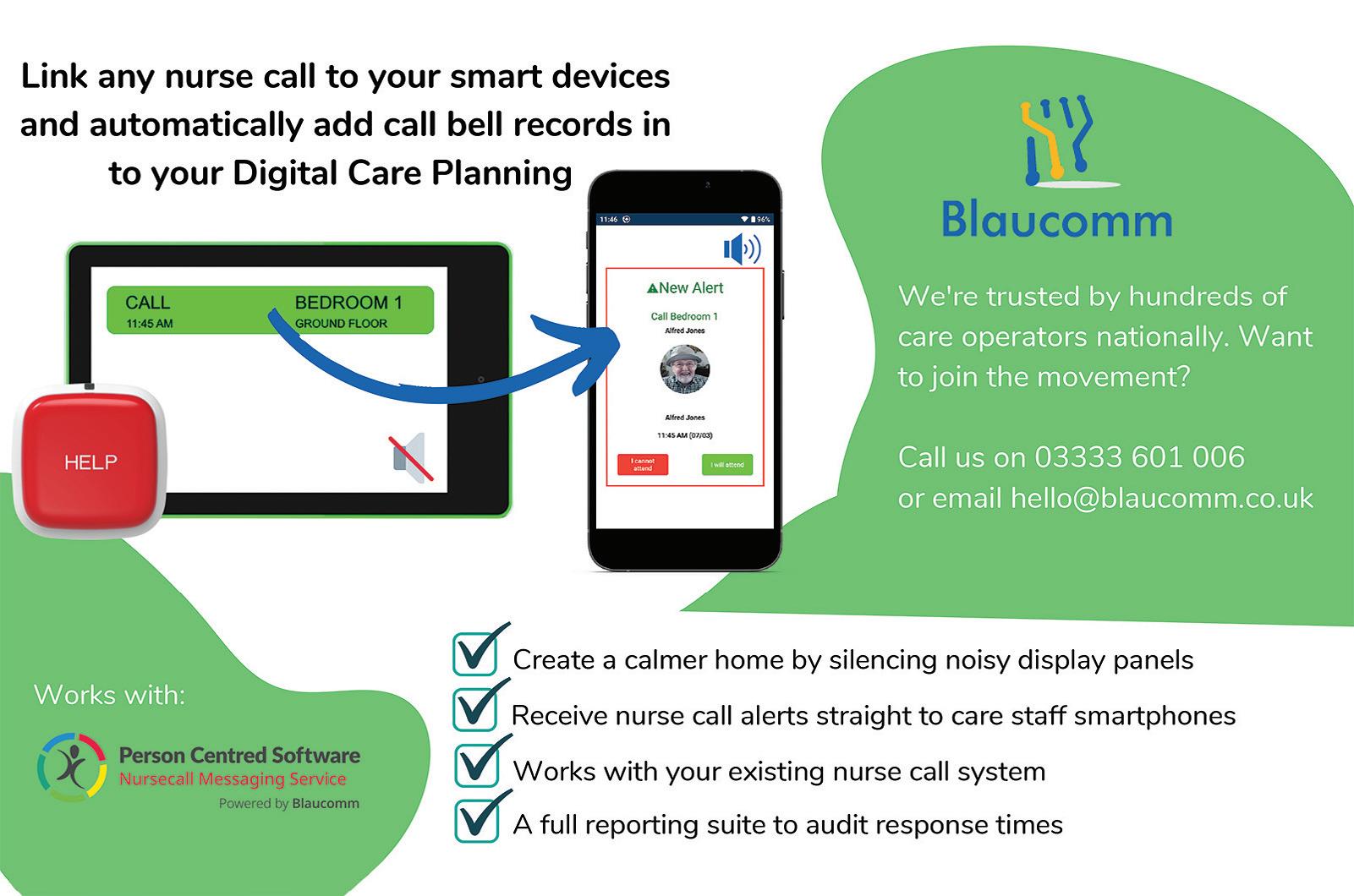
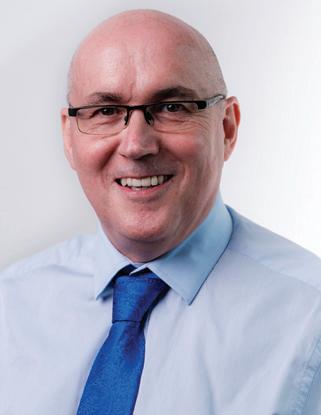
The Association of Directors of Adult Social Services (ADASS) Spring Survey, released yesterday (July 15) and our lead story paints a stark picture of a system in crisis.
With councils forced to overspend by £774 million on adult social care budgets in 2024/25 – the highest level in a decade – the financial arithmetic of social care has fundamentally broken down. Its all to easy to view this as figures on a spreadsheet. However, when 80% of councils overspend on adult social care, when prevention spending falls to its lowest recorded level at just 5.6% of budgets, and when three-quarters of directors lack confidence they can meet their legal duties around prevention and wellbeing, then we are, in my opinion, witnessing the systematic dismantling of the very foundation upon which the Government's health ambitions rest.
The most damaging irony revealed by this survey is the “prevention paradox” now plaguing social care.
At precisely the moment when government rhetoric champions "shifting from hospital to community" and embedding prevention at the heart of neighbourhood health services, councils are being forced to slash preventative spending by more than 10% this year a paradox and frankly an absurd one! This represents, as the survey highlights, a clear misalignment between policy aspiration and fiscal reality.
Directors report they "shouldn't have to choose between helping people with complex needs now and preventing others from getting unwell," yet that's exactly the impossible choice they face daily, resulting in a vicious cycle where early intervention is sacrificed to manage crisis, inevitably creating more crises that require even more expensive intervention.
Perhaps most revealing is the survey's exposure of adult
social care as the NHS's hidden service. With 100% of directors predicting that increased NHS pressures will increase pressures on adult social care next year, which in real terms amounts to an unofficial but systematic transfer of responsibility from health to social care – without the accompanying resources, training, or strategic coordination.
The data on Continuing Healthcare (CHC) is particularly damning. With 73% of directors seeing increases in people no longer receiving CHC funding who would previously have qualified, and 61% reporting increases in disputes escalated, we're seeing a postcode lottery that forces councils to pick up the tab for what should be free NHS care.
The chorus of concern from sector leaders is both unified and urgent, which we as always are always delighted to share!
ADASS President Jess McGregor's observation that "the maths simply doesn't add up" captures the fundamental impossibility of the current situation. When councils are forced to prioritise immediate crisis over prevention, they're not just failing today's service users – they're actively creating tomorrow's problems.
Kathryn Marsden from SCIE identifies the core issue: "When local authorities are forced to divert limited resources into crisis management, the opportunity to invest in preventative, early intervention is lost." This isn't just about social care efficiency – it undermines the Government's own ambitions for both social care and the NHS.
Helen Walker's stark assessment that unpaid carers are "on the brink of collapse themselves" reveals another hidden cost of underfunding. With 76% of directors reporting increases in carers needing support due to burnout, the informal care system that props up the entire
The survey reveals a care workforce increasingly asked to do more with less, taking on health tasks that would normally be NHS-funded while dealing with increasingly complex needs. With 54% of directors extremely concerned about increased costs due to complexity for working age adults, and care packages growing in size and cost, we're seeing a perfect storm of demand, complexity, and resource constraint.
The survey's findings on technology adoption and innovation investment reveal another dimension of the crisis. With fewer councils investing in digital technology, reablement,
The Carer is published by RBC Publishing Ltd, 3 Carlton Mount, 2 Cranborne Road, Bournemouth, Dorset BH2 5BR. Contributions are
damage. Views expressed within this publication are not necessarily those of the publisher or the editorial team. Whilst every care is
responsibility for any effects, errors or omissions therefrom. All rights reserved, reproduction is forbidden unless

and housing-based care models, the sector is being forced to retreat from the very innovations that might improve efficiency and outcomes.
This represents a tragic waste of potential. As Dr Rhidian Hughes notes, "there is a wealth of good practice, partnership and innovation delivered by councils, disabled people and third sector organisations," but the ability to invest in and scale these innovations is "severely limited when up against successive years of central government underfunding."
The ADASS survey doesn't just diagnose problems – it implicitly maps the solution.
Vic Rayner's observation that "high quality, responsive, community-based preventative services are the backbone of communities" points toward what needs to be rebuilt. The survey shows that when councils can invest in prevention, equipment, and early intervention, outcomes improve and costs ultimately reduce.
But this requires a fundamental shift in how we think about social care funding. The current approach – pushing costs onto councils through council tax increases while expecting them to deliver an expanding brief – is unsustainable. The £4 billion additional funding announced in the Spending Review, while welcome, comes with so many unknowns and competing demands that its impact remains uncertain.
The ADASS Spring Survey reveals a system not just under pressure but actively failing in its core mission. When directors lack confidence they can meet their legal duties, when prevention spending falls to record lows, and when the entire weight of community health ambitions rests on an underfunded, overstretched social care system, we're not just witnessing policy failure – we're watching the systematic undermining of the Government's own health strategy.
The warm words about adult social care's importance must be matched by the political will and financial commitment to make those words reality. Until that happens, every survey will tell the same story: a system managing decline rather than enabling the community-based, preventative health and care future we all want to see.
The question is not whether we can afford to properly fund social care – it's whether we can afford not to.
I would encourage our readers to sign up for our bi-weekly digital newsletter at www.thecareruk.com and follow us on social media for all the latest news.

(CONTINUED FROM FRONT COVER)
This represents a significant challenge to the Government’s ambitious 10 Year Health Plan, which emphasises three key transitions: shifting from hospital to community care, moving from treatment to prevention, and embracing digital transformation.
BALANCING ACT
The research underscores the difficult balancing act facing care leaders. As demand for intensive support services continues to rise, councils are finding themselves with little choice but to scale back early intervention programmes that could prevent more serious care needs from developing.
The survey also shines a light on the critical role of unpaid carers, who are increasingly stepping in to fill service gaps. These dedicated individuals – often family members and friends – are providing essential support that would otherwise fall to professional services.
However, the research warns that this reliance on unpaid carers comes at a significant cost, with many experiencing negative impacts on their own health and wellbeing. The survey emphasises the urgent need for enhanced local support systems to better assist these vital members of the care community.
COMPLEX CARE NEEDS
Furthermore, three quarters of Directors continue to see increasing numbers of people with some of the most complex care needs approaching their councils for support, who would have previously had their care funded free of charge through an NHS budget called Continuing Healthcare (CHC).
Data shows a postcode lottery for CHC funding, with people less likely to be successful in obtaining CHC support according to where they live in the country.
The trend of care workers increasingly being asked to carry out health tasks that would normally have been covered by NHS staff continues despite this often being unfunded, and a staggering 100% of those Directors surveyed believe increased pressure on the NHS will in turn increase pressures for adult social care into next year .
Jess McGregor, ADASS President and Director of Adult Social Care in Camden, said: ‘We shouldn’t have to choose between helping people with complex needs now and preventing others from getting unwell –we need to support people at both ends of the social care spectrum. ‘But without more investment to keep people well and independent at home, we risk undermining the shift towards prevention and neighbourhood health that Wes Streeting, the NHS and this Government are rightly championing.’
Ms McGregor added: ‘It’s vital that adult social care leaders who are well versed in delivering support at the community level are meaningfully involved in decisions about where and how resources for neighbourhood health and care are spent. After all, acute hospitals are not best placed to deliver social care at the neighbourhood level – but
Kathryn Marsden OBE Chief Executive at the Social Care Institute for Excellence (SCIE), said: “The ADASS Spring Survey offers further evidence of a system under profound strain. When local authorities are forced to divert limited resources into crisis management, the opportunity to invest in preventative, early intervention is lost. This not only undermines outcomes for people who draw on care and support but also the Government’s own ambitions for both social care and the NHS.”
“A sustainable health and care system relies on a rebalanced model—one that moves resources into community settings to enable support to be delivered earlier, closer to home, and in ways that promote independence. The Government’s Ten-Year Plan rightly looks to address this—but largely overlooks the essential role of social care.
“Social care plays a vital role in facilitating safe hospital discharge, supporting individuals to maintain their wellbeing at home and enabling them to lead independent and fulfilling lives. Although the sector is in desperate need of reform to unlock its full potential, it has already done the work to identify what the problems are through reports such as this one. It has also been developing solutions that can be deployed now to improve the efficiency, integration and quality of care through projects like the ones funded by the Department of Health and Social Care’s SCIE-supported Accelerating Reform Fund.”
“It is now up to the Government, working in partnership with social care leaders, to ensure the preventative role of social care is not sidelined but prioritised in our health and care system reforms.”
BURN OUT
Helen Walker, Chief Executive of Carers UK said: “This latest report reveals that most Directors of social services have seen an increase in unpaid carers’ approaching them for support this year due to burn-out and a lack of support from health services.”
“As services continue to be stripped back to the bare minimum for any but the most complex needs, it’s no wonder that unpaid family carers, on whom the system relies so heavily, are on the brink of collapse themselves. Many are providing more intense care themselves than ever.”
“This latest ADASS survey echoes our own research showing that an increasing number of people looking after disabled, older or ill relatives are experiencing poor mental health because of their roles. 65% said they feel overwhelmed because they have not had a break.”
“It is simply unacceptable that unpaid carers continue to bear the brunt of this crisis, finding themselves pushed to breaking point often to the detriment of their own health”
“This report sends a strong message to the Government that as part of the delivery of the 10-year NHS Plan, carers’ health and support needs must be firmly at its heart if it is to succeed. The move towards more community and home-based care is something that most carers
are in favour of, but worry about having to provide more care, with a significant and growing minority already providing very significant levels and sometimes round-the-clock care, being even more concerned.”
UNSUSTAINABLE OVERSPEND
Dr Rhidian Hughes, Chief Executive of the Voluntary Organisations Disability Group (VODG), said: “Across the country there is a wealth of good practice, partnership and innovation delivered by councils, disabled people and third sector organisations, showing care and support at its very best.”
‘Yet the latest survey of directors of adult social services once again highlights that the ability of councils to invest in early intervention, foster new ways of working and encourage innovation in social care is severely limited when up against successive years of central government underfunding and unsustainable overspends. As the report states, the numbers just do not add up.”
“ALARM BELLS”
Vic Rayner, CEO of NCF commented: “The ADASS Spring Survey shines a light on the gaps in the delivery of a holistic care and support system that meets the obligations of the Care Act, with the results showing a worsening picture, as prevention continues to be squeezed amounting to less than 6% of overall commissioned spend.”
“This should ring alarm bells for a government committed to putting prevention back on the map through the development of a Neighbourhood Health Service. High quality, responsive, communitybased preventative services are the backbone of communities, and not-for-profit providers of care and support sit at the heart of it. Putting more money into prevention is vital for the future, and we are committed to working with ADASS and the government to regrow community based preventative services that support people to meet the outcomes that are important to them.”
“Without this focus on prevention, ADASS and many others will continue to report on the recognised trend of growing complexity of need for those living within their own home, as well for those in other care settings. The impact of that changing need is being felt in the workforce, with the survey confirming that adult social care is increasingly absorbing responsibilities previously delivered by health partners in the NHS – without the associated funding, training or strategic co-ordination.”
GROWING PROBLEM
UNISON general secretary Christina McAnea said: “For years councils were repeatedly starved of funding to deal with the growing problems in social care.”
“Local authorities are now so cash-strapped they’ve had to abandon preventative measures. Councils often only intervene when families have reached crisis point. That’s how dire things have become.”
“The sooner there’s a national care service, the better. That will drive up standards and begin to replace the profit-driven system that’s failing far too many people, their families and hard-pressed staff.”


When a family member or friend is diagnosed with dementia, it can be an emotional and overwhelming time. Initial symptoms and changes in your loved one’s behaviour are not always easy to notice, so the emergence of more pronounced symptoms and a diagnosis can sometimes seem sudden, and you may not know how you can help or support them.
The good news is there are lots of things you can do to support them to be safe and content. To help, Andrea Layton, General Manager at Barton Manor, part of Danforth Care Homes (www.danforthcarehomes.co.uk) wants to share five tips for caring for someone with dementia, so you can help them continue to live a comfortable and happy life.
1. KEEP THEM ENGAGED WITH EVERYDAY TASKS
“An important thing to remember is that your loved one needs to remain as autonomous and as in control of their life as possible,” says Andrea, from the care home in Cambridgeshire.
“Help them with tasks, but leave them to do simple things they’ve always done regularly, such as brushing their teeth, food preparation or making a cup of tea, if they are doing so effectively and safely.”
“Your goal as a caregiver is to support them to be as independent as they can be and allow them to keep being social and maintain household skills. You can help by doing things such as labelling cupboards in the kitchen and bathroom, so they can better navigate if they can’t remember where things are.”
2. HELP THEM WITH EATING AND DRINKING
“Dehydration is something lots of people with dementia struggle with, as they don’t always identify when they’re thirsty. This can make their confusion and other symptoms worse. You can help them by ensuring they drink enough throughout the day, reminding them to make drinks or bringing drinks to them, and ensuring they are taking the liquids on board,” says Andrea.
“It’s important, as it is with everyone, that your loved one eats a healthy, balanced diet. Buy fresh ingredients for simple, easy to prepare meals, and involve your loved one in the decision making and production process as much as you can. Make note of what they like and don’t like, so you can remind them if they forget.”
“Adapt to them – if they struggle with cutlery, help them to make finger foods, for example. If they experience dysphagia (swallowing problems) prepare soft and easy to swallow foods and follow the advice of a medical professional.”
3. AID ROUTINES AND USING THE BATHROOM
“People with dementia do well with routines, so if possible, try to keep their bathing, dressing and mealtime routines consistent. They may struggle with incontinence; if so, look out for changes in their behaviour which may indicate they need the toilet, and try and keep going to the bathroom as part of a steady routine. Remember, be kind, incontinence is not their fault, and they may find talking about it embarrassing.” says Andrea.
“Always ask if they need help with bathing and dressing, and ask what they would like to wear that day. Their wardrobe should include loose fitting, comfortable items.”
4. HELP THEM MAKE THEIR ENVIRONMENT SAFE
“When a person is diagnosed with or is experiencing dementia symptoms, you can help them by making slight adjustments to their home environment, to ensure they stay comfortable and safe. For example, removing any rugs or mats which may pose a trip hazard. Also, ensure there is good lighting, which can reduce their risk of falls and lessen any confusion,” says Andrea. “In the garden, check for loose paving, and consider raised flower beds so your loved one can still garden if they have poor mobility.”
“You can also help them with products which can aid their daily life and help with their symptoms, such as a reminder device to remind them to take their medicines, or a clock with the date and time on in large print.”
5. LOOK AFTER YOURSELF
“Caring for someone with dementia can be rewarding, but it can also be stressful and exhausting. Looking after yourself and giving yourself a break is very important,” says Andrea. “You can get a carer assessment to see if you’re eligible to receive support to help make life easier for you and the person you care for, such as help with housework or training to help you with your caring role. Reach out to family and friends for assistance and know there are support lines and groups you can attend.”
“Sometimes it’s not possible to care for someone with dementia on your own. If you are feeling overwhelmed, or if your loved one is having more periods of low mood, anger or anxiety, it is time to seek more help. This can be in the form of additional home support or helping them move into a dementia specialised care home, where in both scenarios well trained professionals can help you.”
“Respite care is often available from care homes, so you and your loved one can trial a care home before moving in, which can make the process less daunting.”
The staff of Birmingham based care home, Priestley Rose, recently came together for a fundraising walk in support of Alzheimer’s Research UK – raising hundreds for the good cause.
On June 29, a dedicated team of caregivers and staff participated in a 5-kilometer walk to raise funds for the charity, bringing attention to the ongoing fight against Alzheimer’s and other types of dementia.
So far, the team has raised over £400 for the charity, with the amount still growing.
This cause is particularly meaningful for the staff at Priestley Rose, who witness the impact of Alzheimer’s on residents, and their families, daily.
Elizabeth Hunt, activities coordinator at Priestley Rose, said: “At Macc Care, we see firsthand the devastating impact Alzheimer’s has on the lives of our residents and their loved ones. Walking in their honour was a powerful and emotional experience – one that brought our team even closer together.”
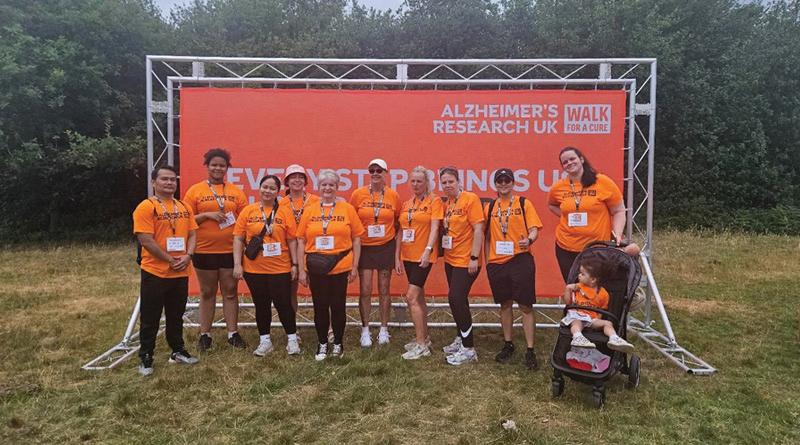
The walk was not only a way to raise funds but also to raise awareness and show solidarity with those living with Alzheimer’s. The event was an opportunity to reflect and raise both money and spirits in sup-
port of a future free from Alzheimer’s.
Priestley Rose, located in Erdington, continues to be committed to fundraising for Alzheimer’s throughout the year, with future events already in the works.
“Raising over £400 is just the beginning,” added Elizabeth. “We’re already thinking about what’s next, and how we can keep the momentum going. From coffee mornings and raffles to creative workshops and awareness talks, we’ll be continuing our efforts yearround.”
The team would like to extend a heartfelt thank you to everyone who donated and supported them during the Alzheimer’s Walk.
“We want to extend a heartfelt thank you to everyone who donated and supported our team during the Alzheimer’s Walk,” said Elizabeth. “Your generosity means the world to us – and to the countless individuals and families affected by this disease every day.The fundraising continues, and all donations are still warmly welcomed. Priestley Rose is proud to contribute to the ongoing fight against Alzheimer’s and is deeply grateful for the continued support of the local community.”
HC-One’s Ebor Court Care Home in Nether Poppleton, York, North Yorkshire, is thrilled to share the remarkable achievement of resident John Mortimer, who has successfully walked 20 meters from his bedroom to the dining room with the support of his Zimmer frame after years of relying on a wheelchair. This milestone marks a triumphant moment in John’s journey of determination and perseverance, guided by the compassionate care of Sonam Wangmo. In January 2025, John, who had rarely walked due to mobility challenges, shared his ambitious goal with carer Sonam Wangmo to walk from his bedroom to the dining room.
What began as a few short steps each day, with Sonam following closely behind with the wheelchair, grew into a weekly challenge. John pushed himself further down the corridor, pausing for rests as needed, before returning to his room.

With Sonam’s encouragement during her shifts, John’s progress was steady and inspiring. Today, he achieved his goal after walking the full 20 meters without stopping –a feat he hadn’t accomplished in years.
John Mortimer, Ebor Court resident, said: “I’m so proud of myself. It doesn’t matter if you’re walking five steps or 55, you’ve just got to keep trying. I’m sharing my story in the hope it inspires others to never give up. I’m so grateful to Sonam for all her help.”
Sonam Wangmo, whose dedication played a pivotal role in John’s success, shared her joy:
“I’m happy to help John – it’s my job. I’ve loved watching him get further each day. Seeing him make it all the way to the dining room and hit his goal was heartwarming.”
Care England has responded to the Government’s announcement on the introduction of neighbourhood health services, noting the potential benefits of more locally coordinated care but stressing that success will depend entirely on how the programme is funded and delivered.
The plans aim to bring health and care closer to people’s homes, starting with the most deprived areas in England. While the ambition to tackle health inequalities is clear, Care England notes that many of these challenges cannot be addressed without sustained investment. This must go hand in hand with genuine collaboration and cross-sector working, ensuring that social care is embedded throughout the design and delivery of these neighbourhood health services.
Care England recognises the opportunity this initiative presents to strengthen links between health and care services at a local level. However, it is vital that the social care sector is not overlooked in the implementation of neighbourhood teams, as the sector must be a strategic partner, not a

The show-stopping lineup included a 1952 Chevy Navy (which once served a very different purpose – transporting prisoners!), a 90s Dodge Ram 3500, a 1970 Plymouth Satellite, a 2010 Mustang, a 1959 Chrysler New Yorker, and a 1980s Pontiac Trans Am.

The cars had residents grinning from ear to ear, with Euphemia saying, “Oh my, ain’t these cars lovely?” Arthur, ever curious, asked one of the owners how to open the car door, as it didn’t have a visible handle. Turns out, it was hidden under the wing mirror! Arthur was amazed, saying he’d never seen anything like it. John, who loves vintage vehicles, was spotted
peering under the bonnet of one of the cars and said, “They don’t make them like that anymore!”
It was an afternoon of fun, stories, and a whole lot of nostalgia. The car show provided an opportunity for everyone to reminisce, share memories, and appreciate the craftsmanship of these vintage vehicles.
Julie Moore, Home Manager, shared: “A huge thank you to Lisa Reed and her lovely friends, the proud owners of these stunning cars, for visiting Paddock Stile Manor and sharing their incredible vehicles with our residents. We had such a brilliant time learning about them – you really made everyone’s day!”
peripheral stakeholder. Care England stresses that the right amount must be ringfenced for social care so the sector can safely and properly support care in the community in the settings that people should expect.
Crucially, there remains a lack of clarity on how the programme will be funded, who will lead delivery locally, and how it will scale. Without answers to these questions, and a clear commitment to adequate funding, there is a risk that these reforms will not meet expectations.
Professor Martin Green OBE, Chief Executive of Care England, commented:
“There is potential in the Government’s plan to bring services closer to the people who need them, but this will only be realised if social care is recognised as a full and equal partner from the start, as too often, care is treated as an afterthought in integrated models. We need assurance that the funding is there, the leadership is in place, and that the voice of social care is embedded in delivery.”

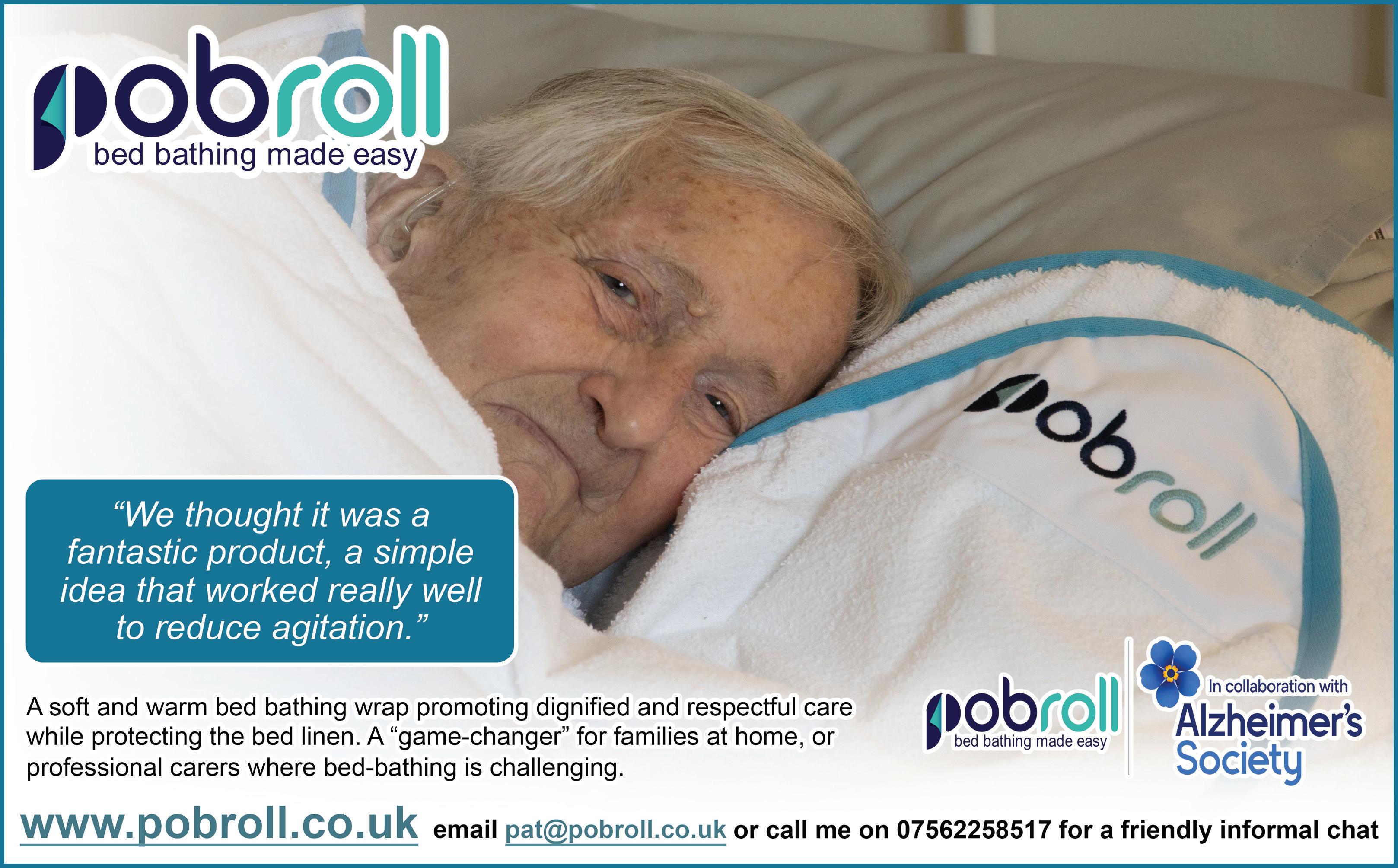

The adult social care workforce in the UK is facing an unprecedented crisis. Years of underfunding, increased care complexity, and burnout among staff have resulted in a large number of job vacancies and a high turnover rate, which are spreading providers thin. Brexit and more recent plans for immigration policy changes are reducing access to a workforce from overseas. Yet, widespread perceptions in the UK are of care being low-skilled, low-paid, and emotionally taxing. It can leave care providers feeling helpless when it comes to meeting today’s recruitment demands. However, without a stable and sustainable workforce, social care simply cannot function; there are things we can still be doing to help turn the tide.
One urgent opportunity is how we attract, retain and inspire the next generation of care professionals from here in the UK. Many young people at the moment don't perceive care as a first-choice career. There's also very little exposure to care being a purposeful, skilled profession during school or college, so young people may assume there's no real progression or personal growth in the field. It’s rare to see any showcases of positive or aspirational stories from the social care sector in the media. And thus, a career in care is often overlooked in favour of other sectors, such as retail or hospitality.
To shift this perception, we need to change the narrative to one that celebrates the real stories of care professionals thriving, making a difference, and building meaningful careers. Let’s bring these stories into schools and youth programmes with talks, placements, and ambassador schemes. Use social media and digital platforms to show the diversity and value of care roles. And continue to advocate for better pay and
By Ruth Mabika, Operations Director & Co-founder, S&P Care
recognition to match the skill, responsibility, and impact of the work that carers do every day.
It’s also vital we make career pathways more visible and structured. There are clear progression routes in care, underpinned by qualifications – from frontline roles into training, management, policymaking, and even entrepreneurship. Care work builds core transferable skills like communication, leadership, problem-solving, and crisis response. And it offers daily contact with professionals across health and social care, such as social workers, nurses, GPs, pharmacists, paramedics and other specialists in the field.
For young people or those unsure about which path to take in health and social care, this real-world interaction helps individuals better understand the various professions, assess their interests, and make more informed decisions about their future career paths. Care is a launchpad for careers across the health and social care ecosystem, and this is a strength we need to better communicate.
We can achieve this by investing in structured induction and training, promoting continuous professional development in care, and developing internal mentoring schemes and talent spotting programmes. We can introduce flexible working and wellbeing support to improve retention, and partner with local colleges and job centres to create pipelines through apprenticeships and internships.
In doing so, my hope is that we can encourage greater collaboration between providers, the education sector, and local authorities to bring about the long-term funding and strategic focus that social care deserves. A fully funded national care workforce strategy with long-term commitments is urgently needed, along with ring-fenced funding for workforce development, and even financial incentives for care workers, such as training bursaries and tax breaks. When social care succeeds, the NHS does too. So, we need both to be treated with equal value for the care workforce to grow.
My vision is of a care workforce that is recognised for its skill and diversity. A proud workforce that young people aspire to join because it makes a genuine positive impact on people's lives, and because they see a viable and rewarding long-term career path. I believe that vision is possible, but it will take greater collaboration with the education sector and local authorities – something that we as care providers will need to drive.
The secret to reaching 107 is keeping active, according to a centenarian at a Bournemouth care home.
Betty, who lives at Wickmeads care home in Southbourne, was joined by her daughters, Leonie and Stephanie, and son Richard and their partners for tea and birthday cake to mark her special day. She was delighted to receive a card from King Charles and Queen Camilla, as well as flowers and cards from her loved ones and the Wickmeads team.
According to online records, Betty is reportedly the oldest living resident in Dorset, and one of the top 100 oldest residents in the UK.
Speaking about her mother’s special birthday, Leonie said: “I feel very emotional. She’s just amazing. We were all so proud of mum, and now she’s 107! She was always very active and a very determined character. She was also very community minded as a member of All Saints Church nearby.”
Social Care TV continue to fly the flag for highest quality online training for Health and Social Care, after unwavering commitment to excellence within the sector for over 25 years.
Their widely-used health and social care specific courses - produced and edited in-house - are expertly designed to make learning engaging, informative and, therefore, highly effective for learners. Accredited by CPD, training with Social Care TV is quality assured, comprehensive and relevant.
As one of the leading online training providers in the health and social care sector in the UK, they supply training for local authorities, recruitment agencies, care home groups and other health and social care organisations.
Their feature-rich Manager platform has further been enhanced this year with the introduction of several new Manager tools designed to aid with compliance, reporting and trainee management. Features now available include:
• Compliance Dashboard with Traffic Light System
• Downloadable Trainee Matrix
• Custom Bundles
• Trainee Groups
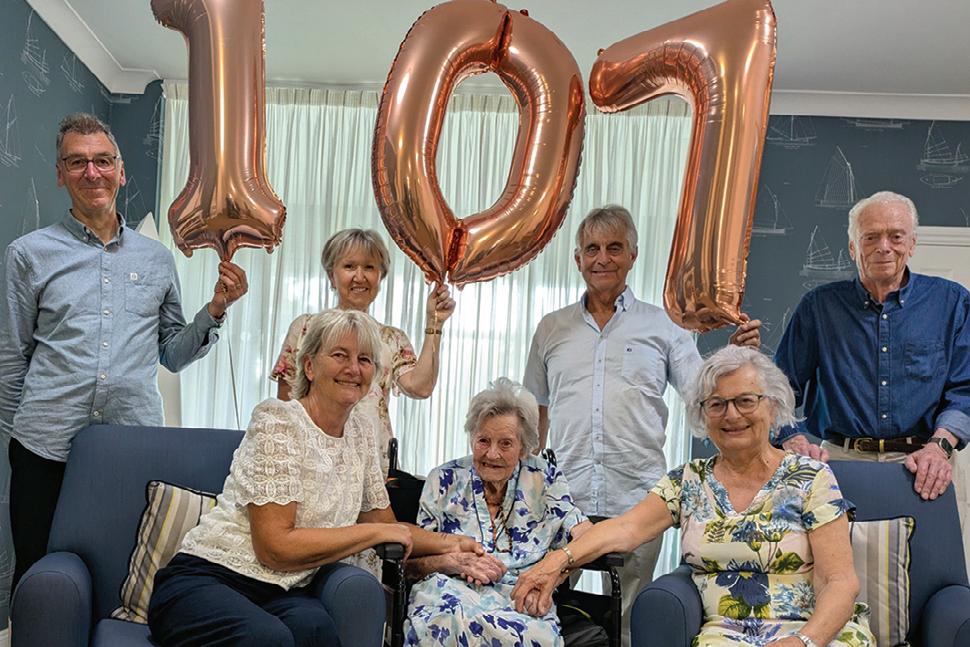
• Bulk Uploads
• Bulk Enrolment Onto Custom Bundles
• Course Enrolment Notifications
• Course Reminders
SCTV regularly release new and updated high-quality courses. Previews for all courses can be viewed at: Courses - Social Care TV (www.social-care.tv/courses/course-details)
Betty’s other daughter, Stephanie, added: “Mum used to walk us down to the beach after school and she tried to go in the sea every day. She was always busy, never had a car, never smoked and never ate ultra-processed food.”
Betty is believed to be singer Cliff Richard’s oldest fan, having received a special video message from her idol to celebrate her 106th birthday last year. Betty has previously seen Cliff perform in Bournemouth as well as travelling abroad to see him sing in Paris and Brussels.
Tracey Walker, Home Manager for Wickmeads, said:
“We are absolutely thrilled to welcome Betty’s family here to celebrate her 107th birthday. She is an inspiration to all of us and loves it when we have live singers come here to perform, as well as when our local nursery comes in to play games with the residents, which always makes her smile. It is a privilege for our team to be part of Betty’s incredible milestone celebration and to provide care to such a lovely lady.”
To enhance their learners' experience further they have created free, comprehensive subject-specific workbooks which were rolled out across all courses this year. This unique addition provides excellent value and a fully robust training package.
SCTV are delighted to have won several awards over the last 12 months including:
• Best Online Health and Social Care Learning Platform’ – Global Health & Pharma Social Care Awards 2024
• ‘CPD Provider of the Year’ – The CPD Awards
• Social Care Training Provider of the Year’ - Corporate Livewire Innovation & Excellence Awards
Gold standard customer service remains a core staple of the business, with expert support and guidance provided via telephone, email and live chat. They place great importance on the training and development of their customer services team to ensure that they continue to provide a personal, friendly and knowledgeable service.
Their much-loved ‘Care Worker of the Month’ award recognises and rewards the selfless dedication shown by care workers across the UK

and they proudly support the Care Workers Charity who aim to advance the financial, professional and mental wellbeing of social care workers.
SCTV believe that high quality training should be accessible to all and offer regular, free courses which include a digital certificate accessible via their website.
The company stands behind a clear mission and set of values which define their ethos and their dedication to both the Care Sector and those within it. These can be viewed at: Mission Statement and Core Values - Social Care TV (www.social-care.tv/about/mission-statement-and-core-values)
Social Care TV are a responsible business, committed to ensuring that their actions have a positive impact on their employees, customers, the wider health and social care community and the environment.
Above all, SCTV consistently strive to make a meaningful contribution to the wellbeing of those being cared for.
For more information please see: Homepage - Social Care TV (www.social-care.tv) and see advert on the facing page.
Two of the UK’s leading health charities, Marie Curie and Alzheimer’s Society, have announced five new research projects as part of a millionpound partnership to improve end-of-life care for people with dementia and their carers.
Dementia is a terminal condition and the UK’s biggest killer. Yet significant gaps in both evidence and service provision mean that people dying with dementia often receive end-of-life care that fails to address their unique and complex needs.
People living with dementia can often face barriers to accessing highquality end of life care. According to Marie Curie just 25% of people with dementia receive specialist palliative support, compared to over 80% of those with cancer. Care is often fragmented, poorly coordinated, and falls short of what people with dementia need.

To address these gaps in end-of-life care, Alzheimer’s Society and Marie Curie are funding five new pioneering research projects which will develop practical tools, training, and guidelines to improve homecare support, empower carers and cut unnecessary hospital admissions.
The projects will be overseen by leading dementia researchers and academics from University College of London, Kings College London and the University of Strathclyde.
Dr Richard Oakley, Associate Director of Research and Innovation at Alzheimer’s Society, said:
“Dementia is the UK’s biggest killer – yet when people with dementia reach their end of the life the care they receive falls short of meeting their individual and complex needs.
“Too often, the distressing reality for people with dementia is they face unmanaged pain, agitation, and breathlessness, and die in places they never would have chosen, typically hospitals or care homes.
“We are proud to partner with Marie Curie on this research and combine our unique expertise in dementia and end-of-life care. Our goal and shared commitment is to transform the quality of care and provide peo-
ple with dementia and their loved ones with dignity, compassion, and tailored support at the end of life.”
Lesley Baldrian, Marie Curie Senior Nurse, said:
“I’m incredibly proud of the care and support we offer for people living with a late-stage dementia diagnosis here at the Marie Curie Dementia Care and Respite Service in West Glamorgan.
“Sadly, however, we know huge gaps remain, not only in the provision of specialist palliative care for people with dementia but in the understanding of the complex needs of end of life dementia care.
“Increasing the amount of research, support, respite and end of life care could be transformative for patients and their families. There is only one chance to get end of life care right.”
Stuart Jennings, 67, who is a Vice President of Alzheimer’s Society and whose wife, Carol, died aged 70 from Alzheimer’s disease and played a pivotal role in dementia research for decades, said: “Carol and I were married for almost 50 years, and I was her carer for 12 – it was one of the greatest privileges of my life. Carol was warm, headstrong and confident.
“We know exactly what good end-of-life care should entail, having had brilliant support from a range of carers, nurses and family members, but sadly, we know this is not a universal experience for many people living with dementia.
“Getting good end-of-life care and support should not be a postcode lottery. It should be universal. We all have a right to spend our final moments in a place of our choosing, free of pain, with our needs and conditions fully understood.
“I welcome this new research focusing on end-of-life care for people with dementia. I hope more people will be able access the quality of care and support we did at the end.”
The projects are due to start later this year.
Barton Manor care home in Wisbech, operated by Danforth Care Homes, surprised 96-year-old Joe White with a new resident greenhouse to support his passion for growing fruit and vegetables.
Alongside the new greenhouse, Joe has also been officially named ‘Site Manager’ of the care home’s garden, complete with a personalised sign.
Joe has a lifelong love of growing his own produce—a skill he first picked up during wartime Britain when homegrown food was a necessity. Joe said,
“I started growing food during the war because that was the only way we could eat vegetables or get them. I just enjoy it; I ask what people want, and I just grow it for them for pleasure.
“My favourite things to grow are tomatoes or any kind of fruit tree, but I mostly grow potatoes. The hardest part is making sure you label everything, but you just have to start with the basics.”
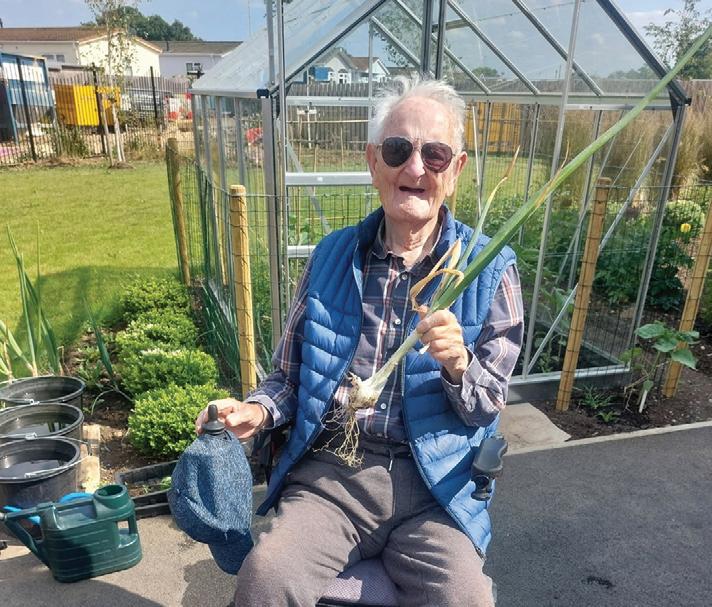
Joe’s story spans far beyond gardening. From working as a crane repair engineer to opening nine training centres for young people in Dereham, and even building a golf course for RAF Marham, Joe has spent a lifetime helping others.
The team at Barton Manor recognised Joe’s dedication and wanted to provide a space where he could continue his hobby. Andrea Layton, the General Manager at Barton Manor said,
“We’re always looking for ways to help residents keep doing the things they love. The greenhouse was the perfect way for us to support residents like Joe with their gardening passions.
“Joe is especially enjoying the greenhouse now we’ve kicked off our Ground to Plate initiative with our sister homes at Danforth. We can’t wait to see what delicious meals the residents can enjoy thanks to Joe’s talents.”


The UK’s care sector is in crisis. Years of chronic staff shortages have placed sustained pressure on providers, many of whom rely on international workers to maintain safe, consistent care. At the same time, regulatory and compliance demands, from DBS and immigration checks to CQC inspections and rightto-work verification, have grown increasingly complex and resource-intensive.
For many care homes, the combination of limited staffing options and slow, manual vetting processes is becoming increasingly difficult to manage. Millions are spent navigating outdated systems that delay recruitment and heighten operational risk. In 2023 alone, the CQC issued over £5 million in fines, while right-to-work breaches can carry penalties of up to £60,000 per case.
Against this backdrop, Labour’s proposed changes to care worker visas, outlined in Keir Starmer’s recent white paper, have raised concern across the sector. Plans to reduce visa availability and tighten settlement rules could further restrict access to a critical international workforce, just as demand for care continues to grow. Without careful consideration, these reforms risk compounding existing pressures and placing even greater strain on a system already close to breaking point.
VISA
Starmer’s proposed visa reforms arrive at a time when the care workforce is already at breaking point. While the intention is to reduce long-term dependency on overseas labour, the reality is that care homes are still grappling with unfilled vacancies, limited local interest in care roles, and few viable pathways to scale up domestic hiring quickly. For many providers, international recruitment isn’t a choice; it’s a necessity born from years of structural workforce shortages.
These proposed changes could also disrupt recruitment pipelines that providers have invested heavily in building, particularly through sponsorship and settlement routes. With little clarity on transitional arrangements or support for affected employers, there’s a risk that care homes will be left in limbo, unable to plan ahead or confidently maintain staffing levels. This uncertainty compounds the strain already created by complex compliance demands and rising operational costs.
Rather than addressing the root causes of workforce fragility, visa restrictions may instead accelerate
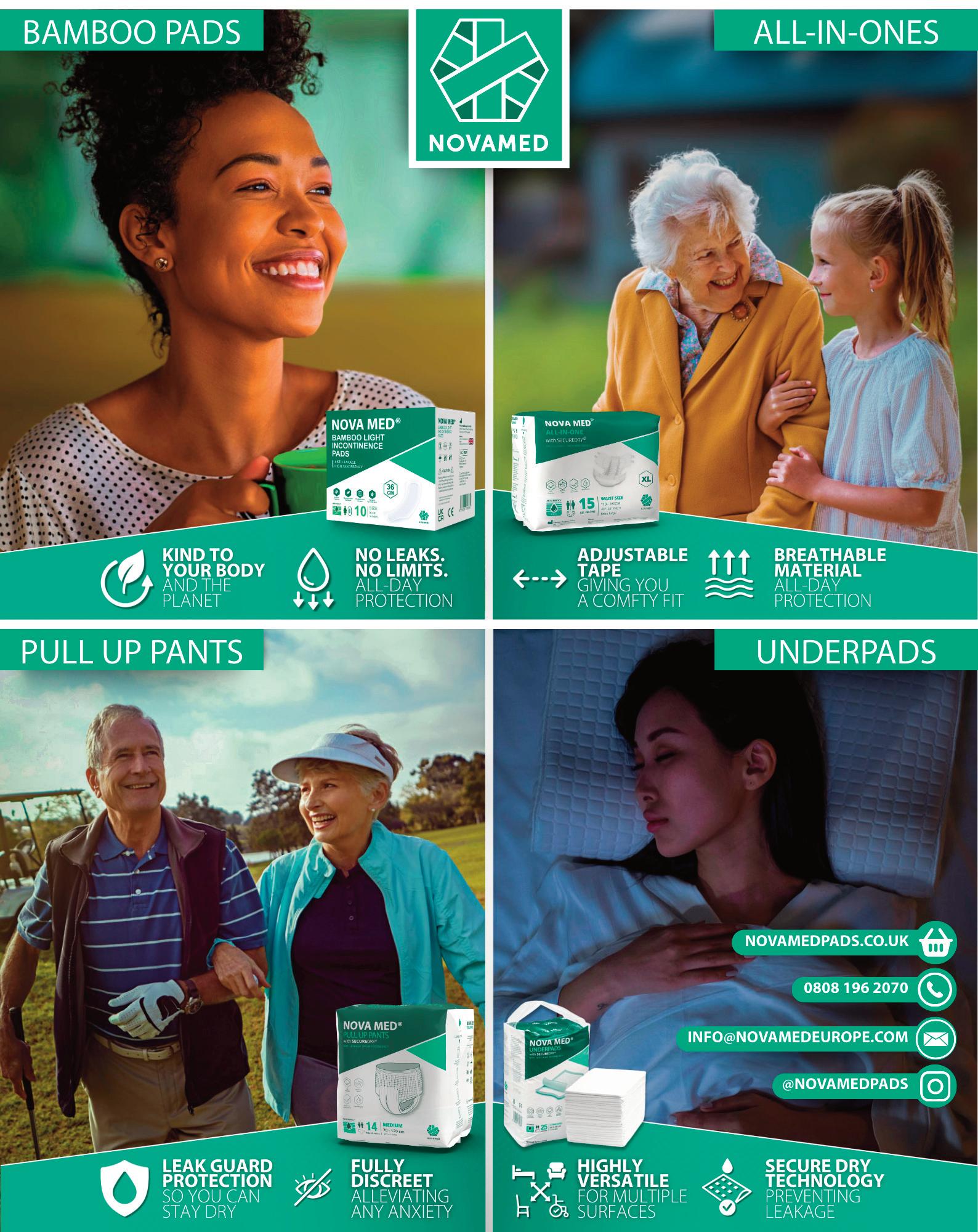
By Hamraj Gulamali, Head
churn and increase reliance on costly agency staffing, further destabilising a system that urgently needs sustained investment and workforce planning, not tighter constraints.
KEEPING UP WITH CHANGING REGULATIONS
As seen with the advent of Starmer’s proposed reforms, constantly evolving regulations are creating significant legal and financial risks for care providers. Rules around immigration, employment eligibility, and safeguarding are shifting rapidly, placing growing pressure on legal and HR teams to stay compliant. The pace and complexity of these ongoing changes can be difficult to manage without the right tools and support. When updates are fragmented or introduced with little notice, even experienced teams may struggle to respond effectively. Without streamlined processes, there’s a risk that key steps in vetting or documentation may be missed, potentially exposing organisations to liability or reputational harm.
These oversights can have far-reaching consequences. Incomplete or incorrect right-to-work checks, for instance, may invalidate an organisation’s statutory excuse, leaving them vulnerable to fines of up to £60,000 per worker. Errors in immigration status verification or DBS disclosures can also lead to penalties, legal challenges, or reputational harm. In a sector already under financial strain and regulatory scrutiny, even minor compliance failures can carry outsized consequences.
At the heart of the issue is a lack of accessible, streamlined systems to support frontline staff and compliance teams alike. Too often, providers rely on outdated processes or manual checks that are inherently prone to human error. Without better technology tools and clearer guidance, care organisations will continue to face unnecessary risks not from negligence but from the difficulty of navigating a system that’s no longer fit for purpose.
High staff turnover is another major driver of compliance risk across the care sector. When experienced team members leave, they often take with them crucial institutional knowledge, especially around vetting procedures, right-to-work documentation, and regulatory checks. In many cases, there are no formal handovers or systems in place to ensure continuity, meaning newer or temporary staff are left to navigate complex processes without adequate support or training.
This loss of knowledge can quickly lead to compliance gaps. Key steps in onboarding, such as verifying visa conditions, maintaining audit trails, or conducting thorough DBS and sanctions checks, may be missed or inconsistently applied. Even minor lapses can result in invalid checks, exposing providers to significant legal and financial penalties. For organisations already stretched thin, these errors aren’t just administrativethey represent a breakdown in the safeguards designed to protect vulnerable people and ensure legal integrity.
Without a more resilient approach to knowledge transfer and process standardisation, the sector risks becoming trapped in a damaging cycle: high turnover creates compliance vulnerabilities, which in turn lead to regulatory penalties, legal exposure, and staff burnout, only accelerating further churn. Breaking this cycle will require more than policy tweaks; it demands a coordinated effort to modernise systems, support frontline teams, and ensure regulatory frameworks are workable in practice, not just on paper.


• We specialise in the sale and purchase of quality used wheelchair accessible vehicles and ambulances.
• They can be bought as seen or refurbished and sign-written to your own requirements.
• Fully serviced, new mot & warranty
• Engineers inspection supplied if required.
• Free delivery service available
• All buses comply with new legislation
•
• Lease hire and purchase


The Professional Standards Authority (PSA) has published a report confirming that the Care Professionals Register – administered by the National Association of Care and Support Workers (NACAS) – has provisionally met the public interest test for accreditation, also known as Standard One.
The test marks an important step towards accreditation for a workforce that plays a vital role in supporting people in care settings, in the community and in their own homes. The PSA recognises that care professionals – also known as care and support workers – are an eligible group for accreditation, and that their work benefits the public.
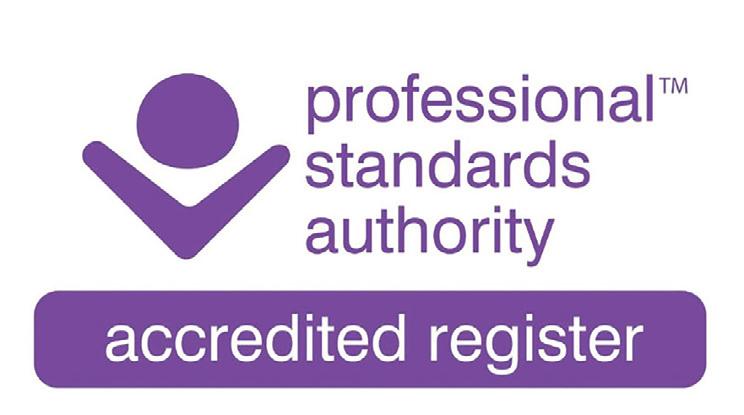
In England, care professionals are not subject to statutory regulation, unlike in other UK nations. Accreditation through the PSA offers a route to greater oversight and accountability and supports improved recognition for a workforce that is essential to our health and care system.
Care professionals work with some of the most vulnerable people in society. PSA accreditation of the Care Professionals Register will foster expectations for appropriate qualifications, safe and ethical practice, and values that promote dignity and respect.
The PSA will now continue to work with NACAS as it prepares its application for full accreditation.
The decision comes as the Casey Review considers the future of adult social care in England. This workforce, and the standards that it upholds, will be pivotal in delivering on any recommendations made. Accreditation can play an important role in strengthening public confidence in care services, by providing a clear route for raising concerns and an assurance that registrants meet recognised standards.
“We’re pleased to confirm that the Care Professionals Register has provisionally met our public interest test – the first step on the path to accreditation,” said Alan Clamp, Chief Executive of the Professional Standards Authority.”
“This decision recognises the essential contribution of care and support workers in England and the importance of strong standards to underpin their work. We look forward to working closely with NACAS as they prepare their full application.”
Professor Martin Green OBE, Chief Executive of Care England, said,
“The news that NACAS has been awarded Standard One from the Professional Standards Authority is a key milestone in the journey towards the registration of social care staff. Social care is a complex and challenging profession, and it is important that care staff receive professional recognition, and registration is part of that process.”
Portland-based national care provider Agincare has announced the appointment of Kelly Nash as Head of Operations for its national home care service. Kelly first joined the organisation over twenty years ago as a care worker.
Kelly’s journey with Agincare began in July 2001 when she joined the Weymouth and Portland home care service as a care worker. From the outset, she demonstrated a deep commitment to delivering compassionate, high-quality care to those in need.

Her talent and dedication did not go unnoticed. Kelly steadily progressed through a range of increasingly senior roles, each building on her frontline experience and expanding her leadership capabilities.
She was first promoted to the role of Field Care Supervisor, supporting and mentoring new care staff, then advancing to Care Co-ordinator, where she helped manage scheduling and care delivery logistics.
After a few years getting to know every aspect of the service and the many clients the people supported, Kelly took on the
role of Registered Manager, where she oversaw day-to-day operations and ensured compliance with regulatory standards, all while nurturing a supportive team culture.
Ecstatic with her promotion, Kelly said: “There are too many people to thank who have helped me on my journey! I’ve been very lucky to work with some amazing people during my two decades at Agincare.”
Most recently, Kelly served as Business Development Manager, contributing to Agincare’s strategic expansion and helping to identify new opportunities to enhance and extend Agincare’s services.
Now, in her new role as Head of Operations, Kelly will be responsible for overseeing the delivery of Agincare’s home care services across England.
Delighted with Kelly’s success, Agincare Chief Executive Officer Raina Summerson said: “Kelly is truly a shining example of what a career in care looks like, marked by absolute commitment to her local community.
“She’s stepping into an exciting new chapter, and I know she will thrive!”
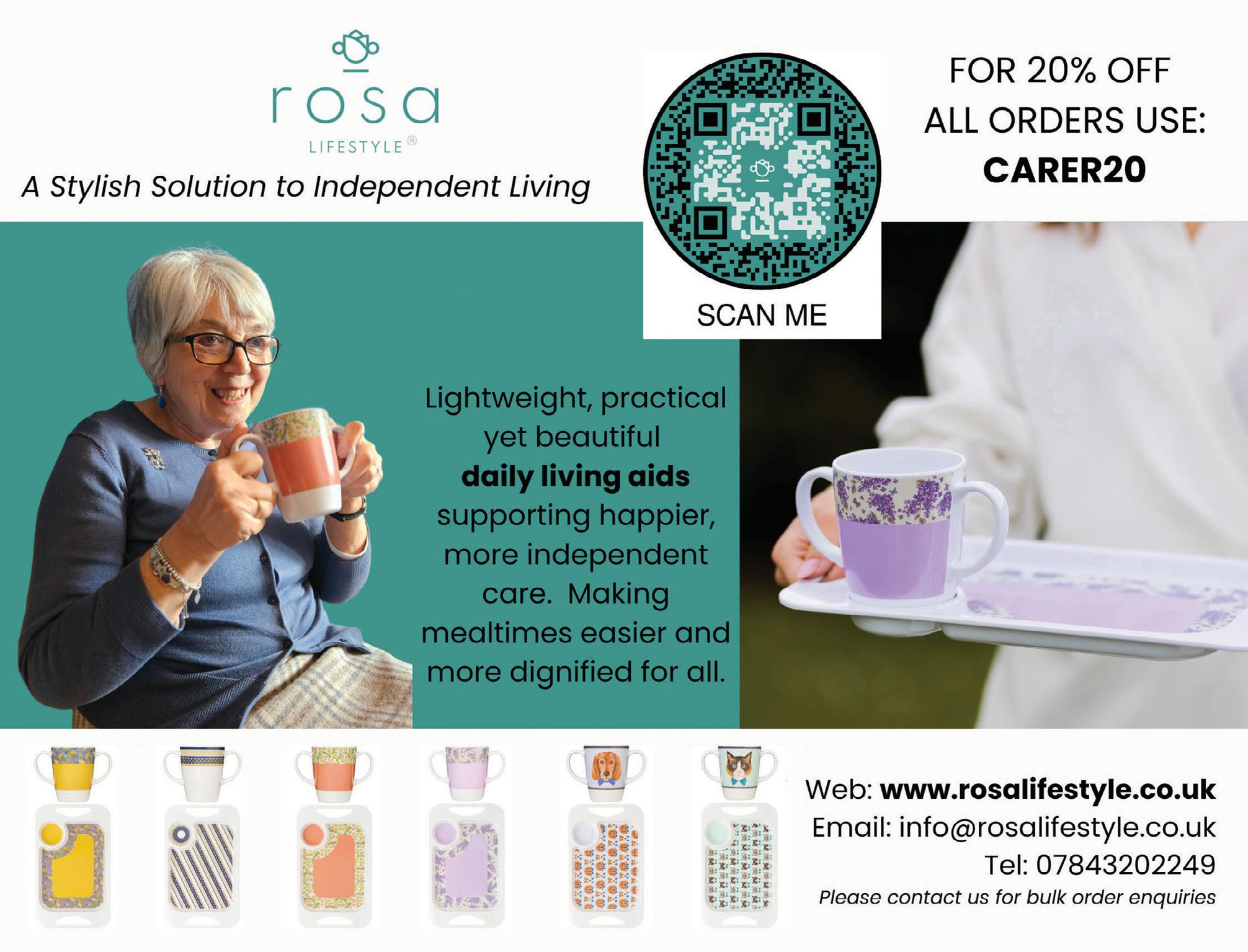

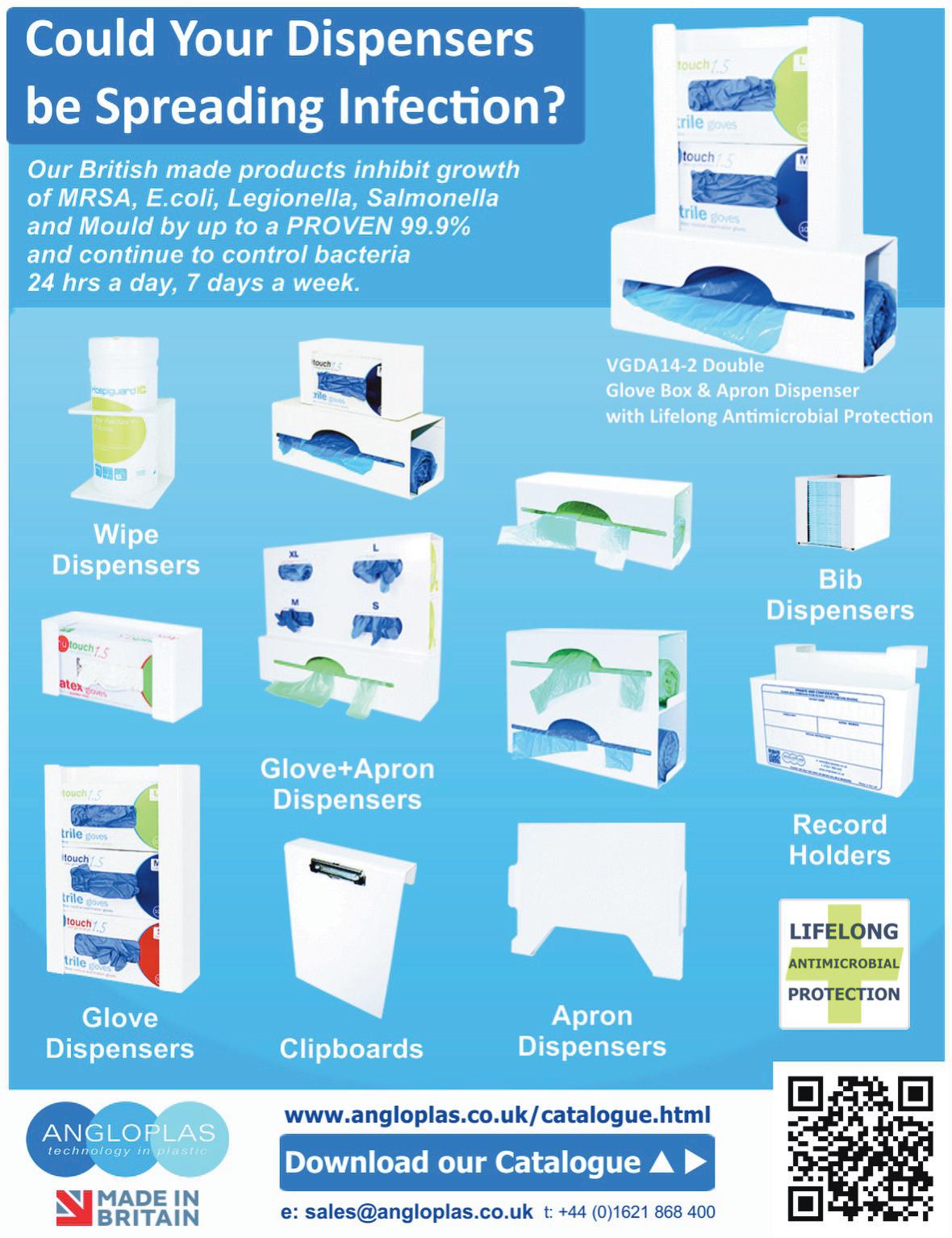
By Steve McGregor, Executive Chairman of the DMA

Improving sustainability while reducing costs are two challenges facing all buildings. In the care sector, which manages a fine balance between bottom-lines and patient/resident experience, drives to reduce carbon footprints through technology adoption and operational improvements can in-fact enhance the end user experience. Kevin Mcguane, Energy Services Director for the DMA Group, discusses the right approach to balancing these often complex aims.
Comfort and wellbeing is particularly important in the care environment, which means HVAC and other building services must be operating efficiently. This should be the priority for care home owners and their facilities management teams, followed by a focus on sustainability and reducing carbon – the two aims are not mutually exclusive, however.
Any effective sustainability drive should begin with an audit, providing a benchmark to work against. Identifying energy wasters, and therefore reducing energy demand as a priority, will help fund more significant changes. To help balance books and contribute to future activities, care homes should start with the path of least resistance, looking for quick wins that will save such as LED lighting and how the main plant is controlled, which can save a significant amount of money.
The big win from a renewables point of view is solar photovoltaics (PV) combined with a battery. The price of the hardware has come down significantly in recent years, making a return on investment fairly swift, as demonstrated by Five Villages Home Association in Icklesham, East Sussex, which provides safe and affordable housing for people aged 60 and over.
Comprising several flats designed for independent living, Five Villages residents live completely self-sufficiently with communal hubs to socialise and connect with their neighbours. To cut energy usage in these communal areas and improve the overall sustainability of the development, we designed an innovative energy solution comprising solar photovoltaic (PV) panels alongside a robust battery storage system. This
Residents and staff at Iris Court Care Home care home, in Hitchin laced up their trainers and warmed-up for their annual sports day.
Staff took to their marks in the egg and spoon, wheelbarrow and three-legged races as residents were encouraged to join in and guests to cheer us on. The teams battled it out to be crowned sporting champions by the homes general Manager Babu being awarded a special trophy for the winning team!
General Manager Babu Rangarajan said:
“We always encourage our residents to keep active. With summer here we had a great opportunity to
process first began by analysing existing energy consumption patterns.
The finished scheme consists of 87, state-of-the-art PV panels alongside two Tesla Powerwall batteries, which store up to 81kWhs of surplus energy between them. Installed in phases across two buildings, since 13th March 2024, the panels have generated 52.7 MWh of solar energy, and exported 18.8 MWh, resulting in a 57% grid dependence (80% of which is at night) and a C02 reduction of 38.2 tones, the equivalent of planting 631 trees.
The batteries were fitted on 3rd October 2024 and since their installation, have provided an additional 6.5 MWh of energy, which would have been exported back to the grid.

Battery storage also mean that Five Villages has days where it imports very little energy, as low as 8% this spring.
What’s particularly good for residents is that the reductions in utility bills will be passed on to them in reduced fees. The cost of care is a concern for residents, their families and the government, so this ‘win win’ scenario could be a model that more establishments employ.
A wholistic approach to carbon reduction should focus on staff too, preventing unnecessary site visits and the consequent travel involved, ensuring right first time works by using workflow management software that can track the experience and qualifications of maintenance teams sent to a job, will all contribute positively. For large organisations with multiple sites, the impact can be significant.
I advise any care home going down the automation route to start with a pilot project focussing on one area at a time, testing the key features and gather feedback from everyone involved. A word of caution here, not all workflow management solutions are created equal, make sure you choose one that is future proof with the potential to integrate with AI – even if you’re not using this tool yet, it’s likely you will in the future.
What’s crucial, is that businesses invest wisely and scale-up the right way. Whether an energy saving drive or any other strategy, the first step must be to define the problem. This is where audits are so essential in highlighting what’s not working, what data is required while defining what the upgrades and any new technologies needs to do.
move our activities outside to make the most of the weather. Our residents and their guest really enjoyed today and it was lovely to see so many of them getting involved. It reminded all of us of when we were kids at school!”
Residents were thrilled with the afternoon and many reminisced at memories of their own sports days as children with many commenting on the on the races they had won and proudly still claiming that title!
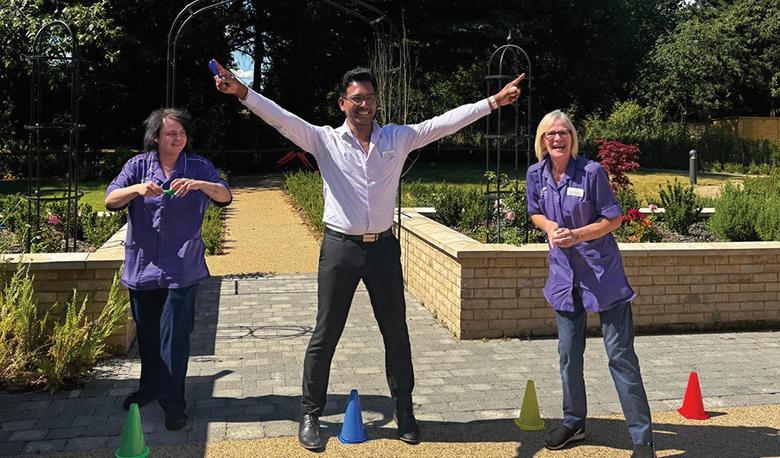


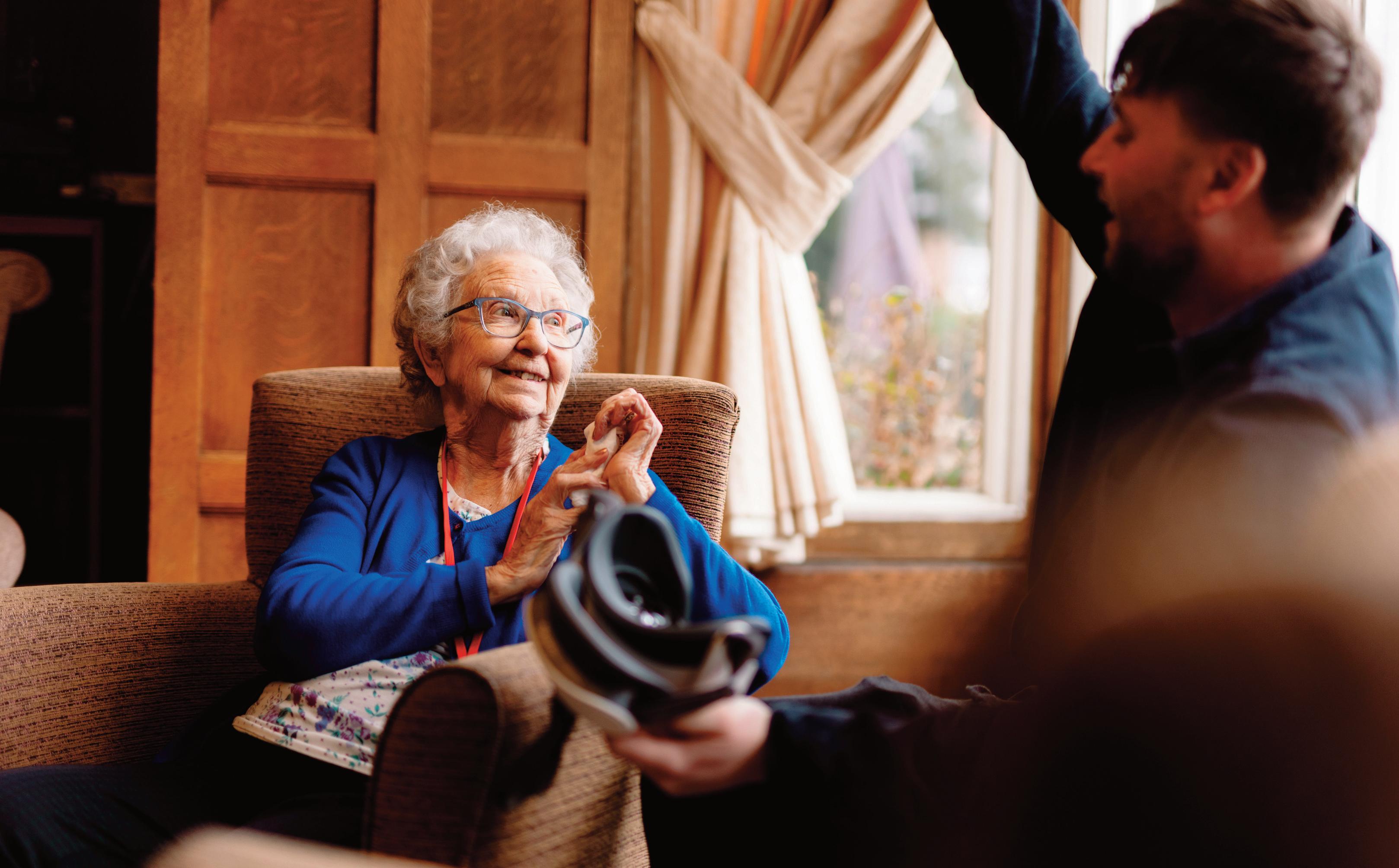

UK care homes market attracted record-high investment volumes of £4 billion in the 12 months since July 2024, according to real estate services firm Cushman & Wakefield.
Transactional volumes in the sector reached over £1.75 billion in H1 2025, the highest ever total for a six-month period and 108% higher than H1 2024. Occupancy reached nearly 90% in Q1 2025, driven by limited volatility and consistent demand due to the UK’s ageing population.
US investors are the predominant driver of this activity, accounting for more than 70% of transactions, up from 56% in 2024. This reflects strong international confidence in the UK care homes market, with the country’s ageing demographic profile drawing investors to the sector. Early indicators suggest that the UK Government’s National Living Wage and Employers’ National Insurance increases – combined with typical timing of annual operator fee uplifts – are driving up Average Weekly Fees (AWFs).
Paid by care home residents and often subsidised by Councils, these fees stood at £1,260 in Q1 2025, the highest rates on record. Preliminary data from Q2 shows that they have continued to rise, driven by the
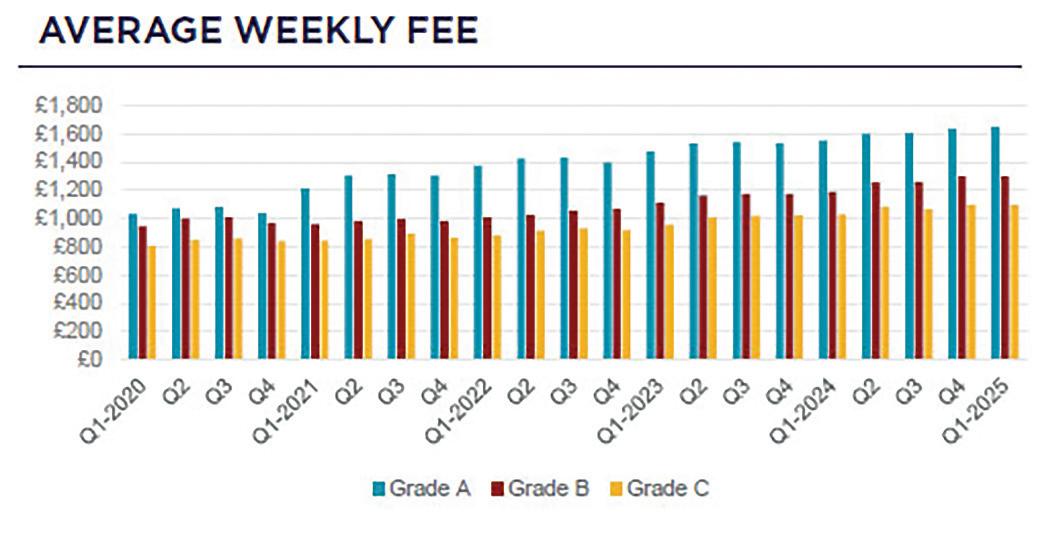
Source: Cushman & Wakefield
The investment environment is characterised by high-value portfolio acquisitions, says Cushman & Wakefield, including the £640 million acquisition of Care REIT plc by CareTrust REIT, as well as growing mid-
market transaction activity – with investors such as Omega Healthcare actively targeting midmarket assets.
Jack Kelleher, Data and Analytics Associate, Healthcare, at Cushman & Wakefield, said:
“Interest and activity in the UK care home market have skyrocketed in the last 12 months, driven in part by strong appetite from US investors.
“US funding sources have dominated the sector in 2025, reinforcing their strong and growing presence with investment across asset grades and structures. Occupancy levels remain robust due to the UK’s ageing demographic profile. Average Weekly Fees showed steady Year-onYear growth, supporting resilient profit margins across all asset grades.
“However, Q2 cost headwinds – notably the National Insurance and National Minimum Wage increases – will impact margins across the sector. In many cases, this additional cost will be passed on, meaning residents are likely to face higher Average Weekly Fees as a result.
“Despite the lower private fee levels and profitability compared to Grade A stock, Grade B and C assets still offer appealing investment opportunities, due to the fragmented ownership and attractive pricing characterising the UK market.”
With Yorkshire basking in glorious sunshine and record-breaking temperatures, the team at Guiseley Manor decided to bring a slice of paradise to their doorstep with a vibrant Hawaiian themed party celebrating the care home’s 2nd birthday.
The event, which was attended by residents and their families, took place within the luxury care home as well as in the beautifully landscaped gardens, both of which had been transformed into a tropical oasis bursting with colour.
The Lord Mayor of Leeds, Councillor Dan Cohen, attended the event, enjoying a tour of the impressive 72 bed care facility and light refreshments with residents. He also said a few heartfelt words to mark the care home’s milestone.

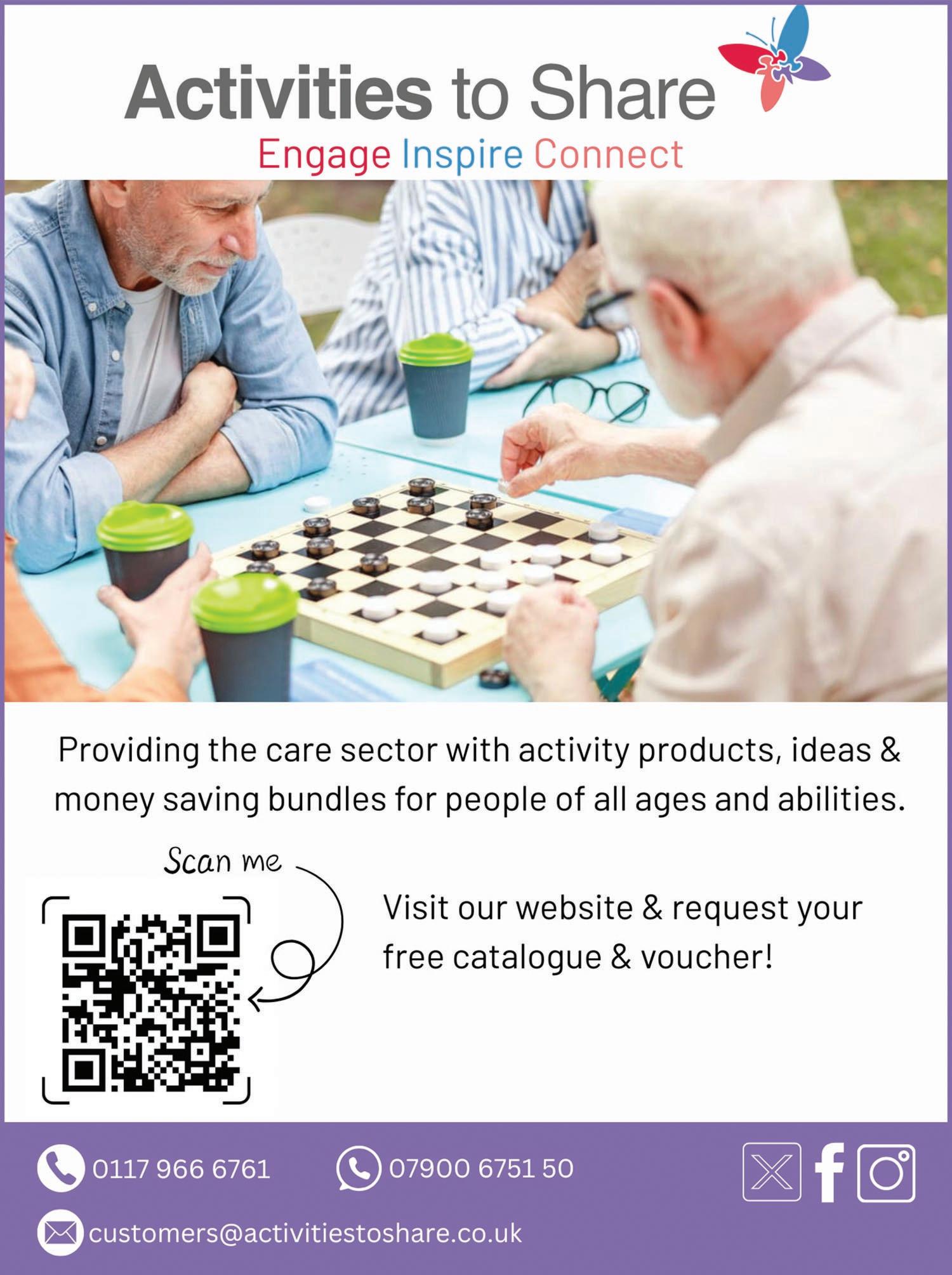
Guiseley Manager home manager, Adel Pangilinan, comments: “We wanted to create something special for the care home’s second birthday, and having enjoyed plenty of warm weather recently, a Hawaiian Aloha! themed party felt like the perfect way. It was lovely to see the residents’ faces light up throughout the day and watch families come together for an afternoon of fun."
Guiseley Manor’s very first resident, Elizabeth Porter, aged 79, reflected: “I’m very happy at Guiseley Manor and am glad I am here as I have been well looked after for the last two years. I was excited to meet the Lord Mayor – it’s nice that he wanted to visit. I enjoyed the music as I love singing and wore my best dress for the party.”
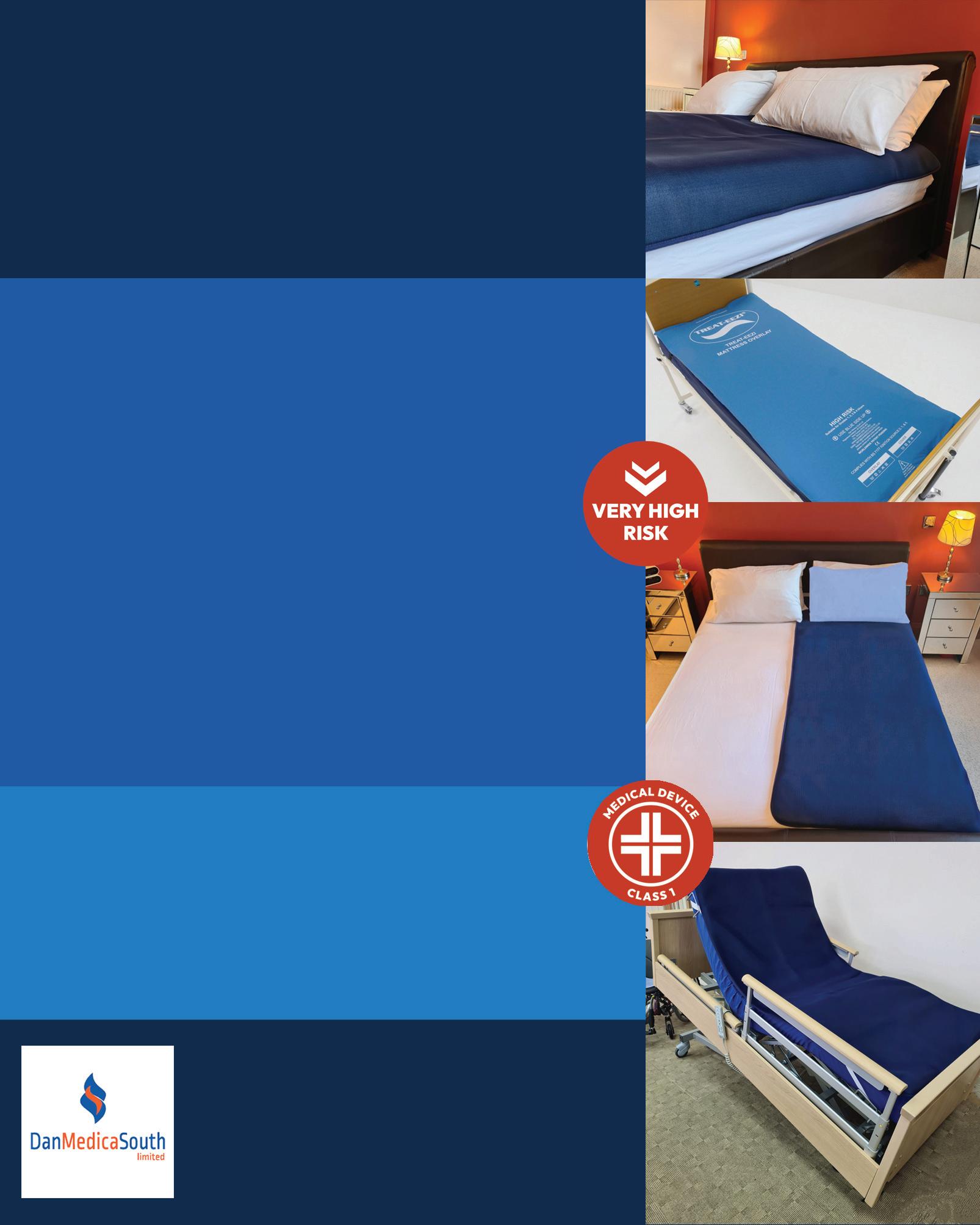
By Lauren Dennis, Trainee Solicitor at Birketts LLP

The care sector provides essential support to individuals who need assistance. While carers dedicate their time to the well-being of others, the pressures of the job often leave their own mental health overlooked. The emotional toll of caregiving, combined with systemic challenges, has led to increasing concerns about mental health within the sector.
New research published by the International Longevity Centre UK (ILC) finds that serious mental health conditions are hampering people’s ability to live more fulfilling long lives. Health and Social Care workers are at high risk of experiencing anxiety, depression, and burnout due to the weight of their responsibilities. Burnout is a state of emotional, physical and mental exhaustion which can occur when
experiencing long-term stress and pressure; it is a major concern in the sector. When carers are physically and emotionally drained, both their health and the quality of care they provide can suffer. It can also lead to more serious consequences including suicidal thoughts, or increased risk of accidents caused by fatigue.
HSE GUIDANCE
The HSE has focused on preventing work-related stress and promoting mental well-being among employees. Their guidance can be found here: https://www.hse.gov.uk/stress/.
Employers have a legal responsibility to help their employees. As with other hazards at work, work-related mental health issues must be assessed to measure the levels of risk to staff. Once risks are identified, steps must be taken to minimise it as far as reasonably practicable.
The HSE links poor mental health and stress with an increase in both suicide and workplace accidents. Fatigue is particularly relevant to the care sector, arising from prolonged exertion, sleep deprivation, and disruption of circadian rhythms—factors commonly experienced by care workers due to long and irregular shifts. The HSE highlights that fatigue leads to slower reaction times, reduced attention, and impaired decision-making, all of which increase the risk of errors and injury.
Where such factors contribute to a death—whether through accident, misadventure, or suicide—there is a clear risk that a care provider or employing organisation may be called as an Interested Person (IP) to an inquest. This is particularly the case if organisational practices or working conditions are alleged to have contributed to the deceased’s state of fatigue or mental ill-health. The coroner may consider whether
systemic issues such as staffing levels, shift patterns, or support mechanisms played a role, thus bringing the organisation’s actions and policies under scrutiny during the inquest.
The Thriving at Work Report sets out a framework of actions which employers of all sizes can, and should, put in place. The full report can be found here:
https://assets.publishing.service.gov.uk/media/5a82180e40f0b623026 9acdb/thriving-at-work-stevenson-farmer-review.pdf.
Ways to support your staff:
Implement a mental health at work plan which promotes good mental health and outlines the support available for employees.
Increase awareness of mental health.
Encourage open conversations.
• Provide good working conditions with a work life balance.
• Have management structures in place for employees to go to for support.
Monitor employee mental health by talking to your employees and understanding risk factors.
Our Regulatory and Corporate Defence Team have extensive experience representing employers during inquests and proceedings brought by the HSE. Our team can also assist with employer training and health and safety audits to ensure that the necessary steps are being taken to protect employee mental health and prevent future deaths.
Say Goodbye to long lines, chasing down prescriptions or scrambling to find you medications in store!
At Automeds Pharmacy, we’re reshaping the way healthcare is delivered. Serving the South of England with over a decade of expertise, we’re proud to be a distance-selling pharmacy that is truly dedicated to the evolving needs of our patients alongside specialising in care home dispensing.

Whether you’re a care home looking for reliable medication management or are in need of hassle-free prescriptions, Automeds Pharmacy is here to streamline your experience. Our team is specially trained to provide bespoke, efficient medication solutions tailored to your needs.
We partner with a range of eMAR providers, offering flexibility and variety—because every patient deserves a solution that fits just right. From same-day deliveries to bulk dispensing for care homes, we ensure you get the medications you need, when you need them.
We understand that repeat prescription ordering can be a hassle. That’s why our experienced team takes the pressure off our care home staff by handling this process for them. No more wasting time hunting down prescriptions—just more time for what matters most: quality care for residents.
With a daily cut-off time Monday to Friday, urgent items are delivered the same day, so no one has to wait.
As Automeds Pharmacy continues to grow, our mission remains steadfast: to offer tailored medication solutions that make a real difference in the lives of our patients.
We’re not just a pharmacy—we’re a partner in your healthcare journey, and we’ll be with you every step of the way.
Enquire today for your bespoke package! 01305 230091 or wecare@automeds.co.uk or visit www.automeds.co.uk


A former Welsh health minister has acknowledged that, with the benefit of hindsight, more could have been done in the early days of the COVID-19 pandemic to protect care home residents from potential infection.
Vaughan Gething, who held the position of Health Minister in Wales when the coronavirus crisis first unfolded, recently gave evidence at the UK Covid-19 Inquiry. During the session, he reflected on the challenges faced by government officials as they worked to respond to an unprecedented public health emergency.
One of the key issues under scrutiny was the early policy of discharging hospital patients into care homes without mandatory COVID-19 testing. The aim at the time was to free up hospital beds in anticipation of a surge in coronavirus admissions. However, concerns have since been raised about the risk this posed to vulnerable care home residents.
While giving evidence, Mr Gething explained that the official advice available to him in March 2020 did not recommend testing all patients before they were discharged into care settings. He stated that there was no scientific guidance presented to him at that point which advised universal testing for hospital discharges.
“There was no advice brought to me at that time recommending testing for every person leaving hos-
pital,” he said. “It simply wasn’t the guidance we were receiving, and I had to make decisions based on the best evidence available then.”
When asked about the potential for people without symptoms to still spread the virus, he said that while asymptomatic transmission was not fully understood or confirmed in mid-March 2020, it could not be completely ruled out.
Reflecting on the issue, he admitted that earlier testing might have helped reduce the risk of transmission into care homes. “In hindsight, had we had the capacity and rapid turnaround for tests, introducing routine testing earlier might have been a helpful additional safeguard,” he added.
The inquiry also addressed a delay in formal guidance being issued. Although ministers in Wales decided on 15 April 2020 that no one should be discharged into a care home without a negative COVID19 test result, the official guidance was not published until 29 April – a two-week gap.
When asked about this delay, Mr Gething acknowledged that it should not have happened.
“That is something I fully accept,” he said. “The guidance could and should have been issued sooner once the decision had been made.”
He also noted that Wales, like other parts of the UK, faced challenges due to limited testing capacity and a lack of shared information from the UK Government in the early stages of the pandemic. Nevertheless, he admitted that these constraints did not fully account for the delay in issuing care home guidance.
The impact of early pandemic policy on care homes remains a key concern for the ongoing inquiry. Many in the care sector, including managers and frontline staff, continue to seek clarity and reassurance that lessons have been learned to ensure better protection for residents in any future health crisis.
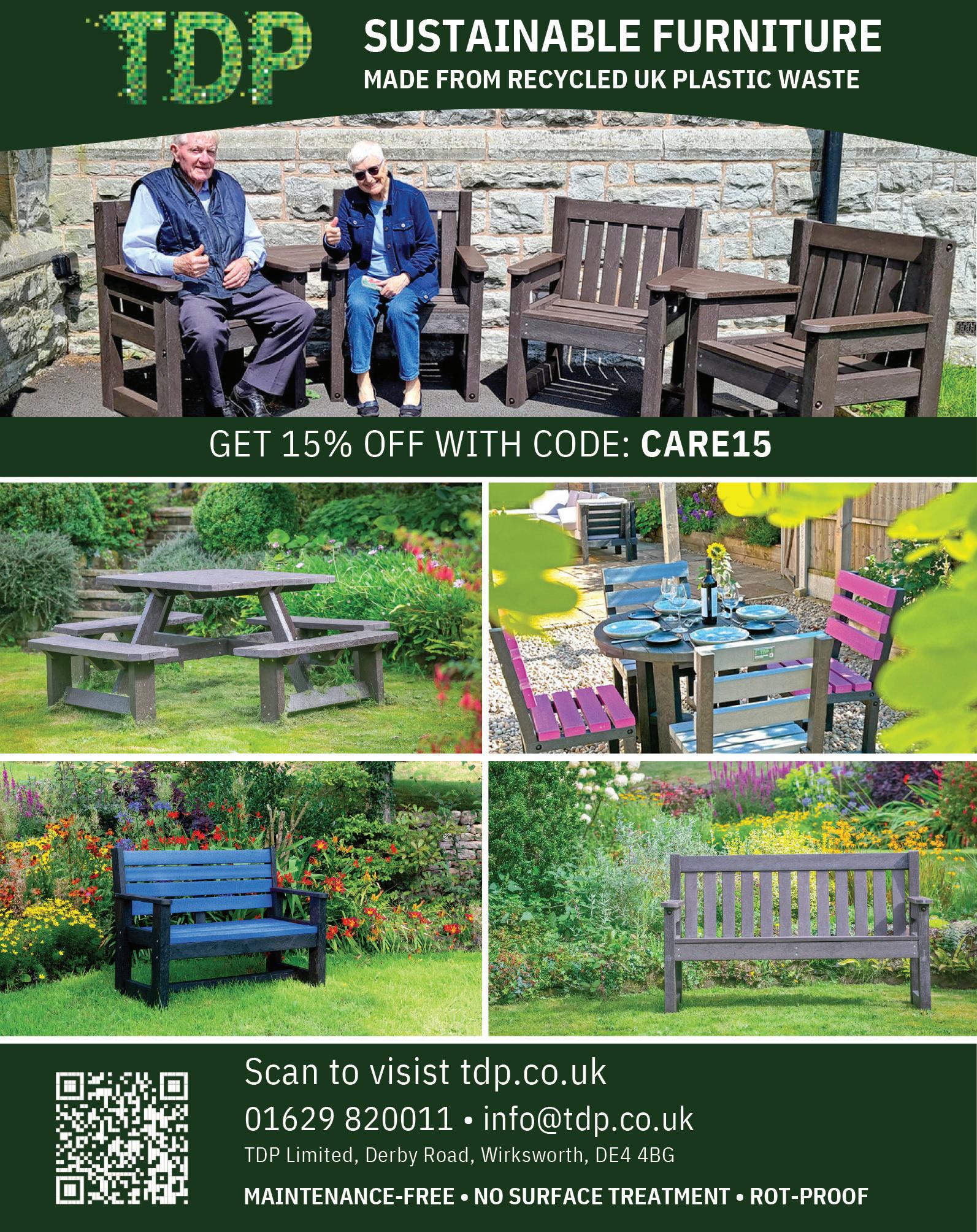



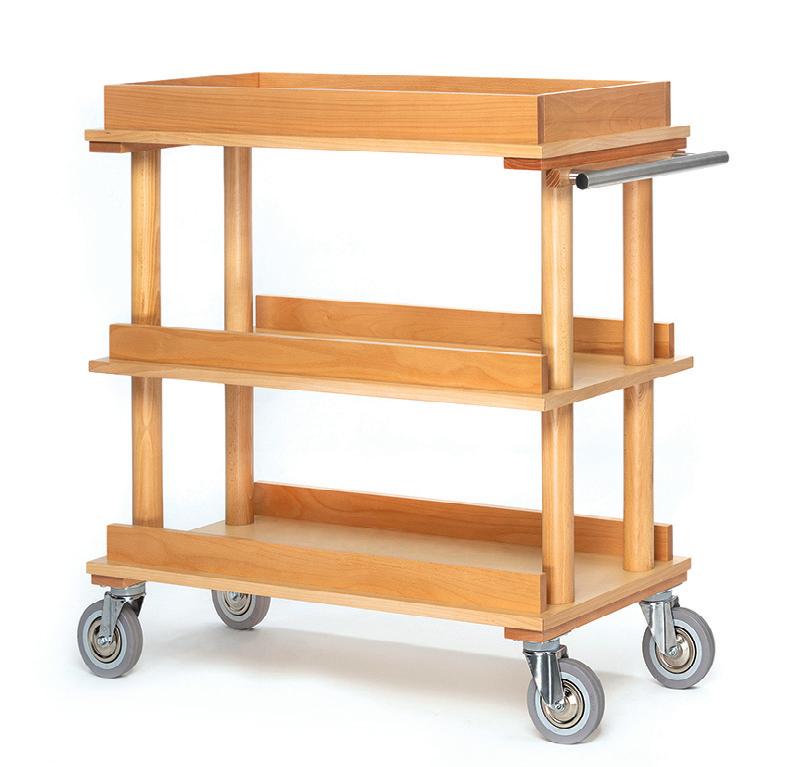

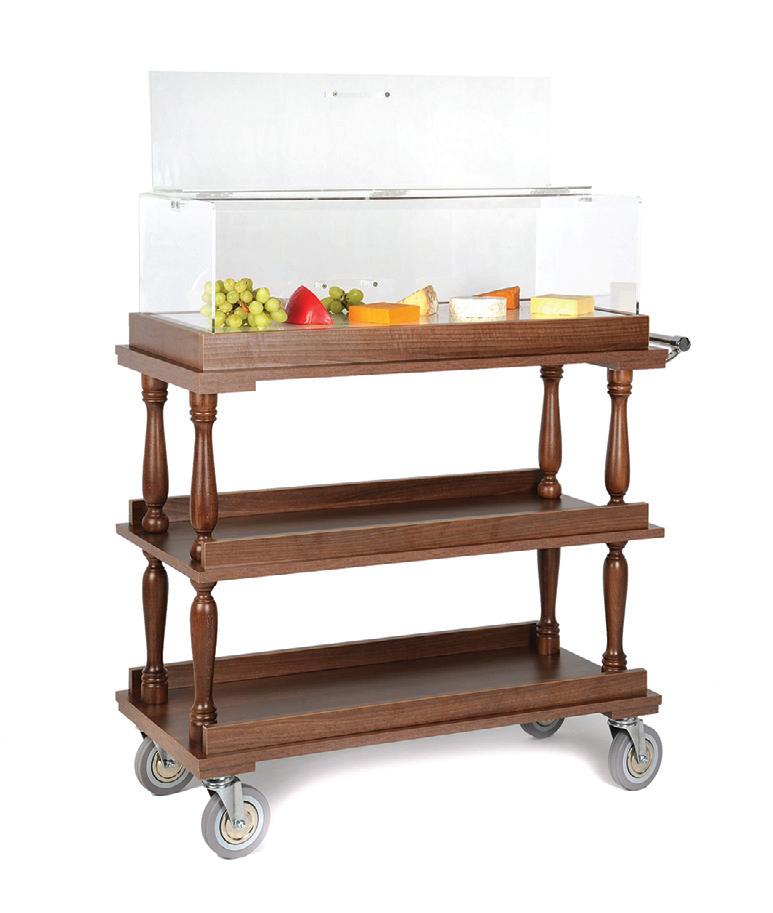
UNISON general secretary Christina McAnea said that if ‘another pandemic were to happen tomorrow, the big worry is that social care would be in exactly the same position as before.’
Christina was giving evidence on behalf of the TUC regarding the impact of the pandemic on social care, the sector’s response during Covid, and the lessons to be learned.
During questioning, Christina said at the start of Covid social care had been regarded as an ‘afterthought’ by the government, with staff in some cases forced to make their own personal protective equipment (PPE).
When asked about reports of care workers resorting to wearing Marigold gloves in the absence of proper safety kit, she said: “It was shockingly bad. UNISON set up a Covid helpline and on the morning of the launch it received over 1,000 calls, many of them from care staff.
“Policy was made up by ministers as they went along with no proper centralised system in place for PPE distribution.”
In her evidence, Christina said that during the pandemic it was hard to find guidance online about how staff should use and dispose of safety kit. She said she’d raised the issue with a senior Health and Safety Executive official:
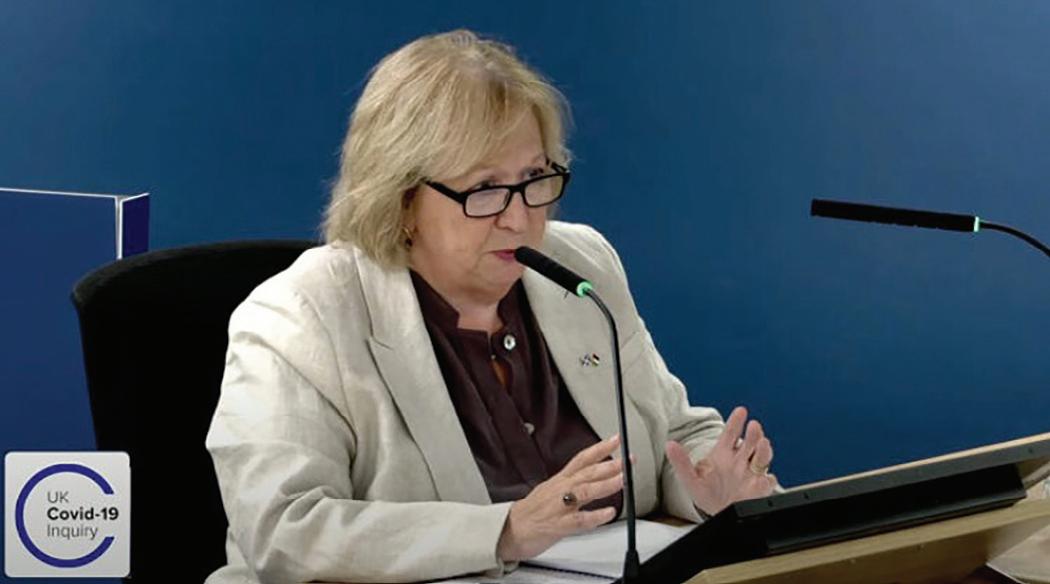
“I couldn’t find the guidance and I wasn’t a busy care worker. The official then looked and he couldn’t find anything either. When he did finally locate the guidance, the text was complete gobbledygook. I don’t know who it was aimed at, but it certainly wasn’t written for care workers.”
“FAQ documents or short videos about how to put PPE on and take it off would have been much better.”
Christina said staff working in domiciliary care were particularly affected by the lack of guidance around safety kit:
“The quality of the information going out was appalling. It felt like it was being made up on the hoof.”
“Care workers were being told they could use a mask for a whole day, but some were seeing as many 20 clients a day. When UNISON
raised problems like these, the guidance would then change.”
The fact that the Care Quality Commission (CQC) stopped doing inspections during the pandemic also had a major impact, Christina added. It meant no one was going in to care homes to pick up on problems like managers locking safety kit in cupboards, for example.
“Inspections could have identified high levels of infection in particular care homes. Questions could have been asked, but none of this was happening because no one from the CQC was going in.”
A national care service would give the sector equal status with the NHS and ensure staff were properly trained to deal with a future pandemic, Christina said. “But if another pandemic were to happen tomorrow, social care would be in the same position as before.”
“Care workers with Covid were going in to work every day to deal with elderly people and those with learning disabilities. But there was no training on what was appropriate for each of those settings.”
The lack of sick pay, Christina told the inquiry, was another major failing exposed by the pandemic – and this has still not been resolved.
“When care workers fell ill or needed to isolate, they had no safety net, no money in the bank to tide them over. A lack of sick pay was a driver of infection in the pandemic. Care workers had no choice but to keep turning up to work. They couldn’t afford to stay at home.”
Christina did acknowledge that the current government has set up a workforce forum that’s now started meeting. She said she hoped the forum would make a difference.
Staff, residents and supporters of HICA Group, a Yorkshire headquartered not-for-profit social care provider, have raised more than £2,600 from its annual Tour De HICA event. They reached an impressive 1,962 miles in just 24 hours to support wellbeing initiatives across the organisation.
During the challenge, five bikes and a treadmill at HICA’s central office were kept in near-constant motion, with teams cycling through the day and night.
Among the standout efforts was Pat Godney, the 72-year-old mother of Information and Systems Manager Paula Jory, who clocked up 60 miles. Also stepping up was Tanya, a care worker from HICA at Home Grimsby, who arrived with her son at 1.30am after travelling from Cleethorpes and cycled for four hours straight.
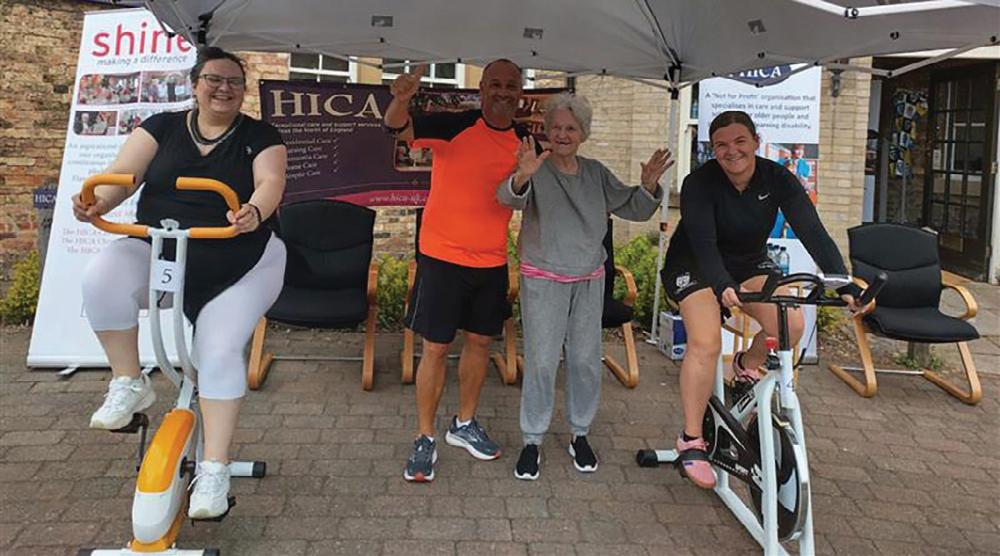
HICA Group CEO Terry Peel was one of two staff members who stayed for the full 24 hours. He said: “The energy and commitment on display was incredible. People came in on their day off, turned up with family and returned in the evening after work just to contribute a few
more miles. It was a real team effort and one that makes a difference to the lives of the people we care for.”
Residents played an important part too. The Hollies, a Hull based care home, helped launch the challenge, with one resident clocking up the first six miles, while residents from Isaac Robinson Court, another one HICA’s care homes in Hull, helped bring the event to a close.
The bulk of the mileage was completed at the Hesslewood main office, where teams racked up an astonishing 1,1210 miles. Other contributions came from the HICA at Home offices at Doncaster, Grimsby, Chorley and Hull HICA at Home Hull who clocked up an amazing 668 miles, and also at care homes Elm Tree Court, The Grange, Overton House and The Hollies who managed 84 miles.
Reflecting on her mum’s involvement, Paula Jory added:
“It was brilliant to see so many people getting involved whether for five minutes or five hours. My mum was determined to play her part and just kept going! The whole event had a real buzz about it.”
The pobroll® is the invention of Pat O’Brien, a physiotherapist, Moving and Handling trainer, and Conflict Management tutor with over two decades of experience in care homes and nursing homes
Care home managers often face challenges in delivering intimate care while balancing efficiency and managing costs, particularly when these essential tasks provoke behaviours that can be challenging to safely manage. Traditional methods—especially for bed-bound residents—often lead to lengthy processes and frequent linen changes, driving up costs and consuming valuable staff time. The pobroll® provides a transformative solution that supports dignified care, achieves significant cost savings, and reduces the need for additional staffing.
The pobroll® is an innovative bed-bathing wrap specifically designed to enhance comfort and dignity during personal washing for individuals who require in-bed care. Centred on the resident’s experience, it minimizes distress by providing sensory comfort. Crafted with two layers of high-quality cotton-terry toweling and a waterproof layer in between, it delivers a soothing, calming experience while keeping the bed completely dry. Sized for a standard single bed, the pobroll®’s dual-layer design offers warmth and a sense of security and privacy, allowing residents to maintain comfort and dignity during bed-based bathing routines.
BOOSTING COST SAVINGS AND OPERATIONAL EFFICIENCY
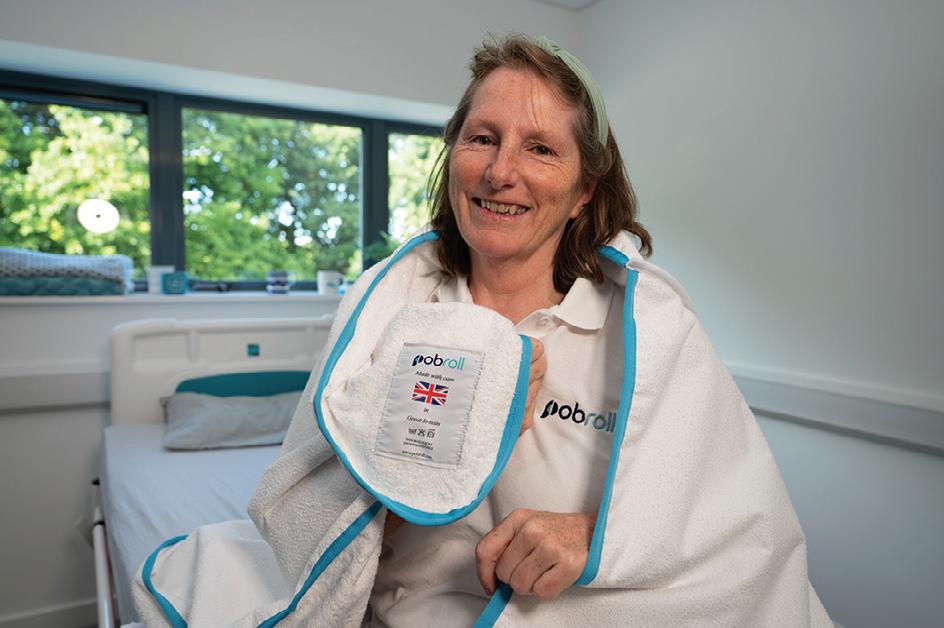
Managing resident agitation—particularly for those with dementia—often requires specialised training in restraint techniques. The pobroll® significantly reduces the need for physical intervention by providing a warm, secure covering that alleviates resident distress. This gentle approach minimizes aggressive or defensive reactions, reducing the number of staff needed for these interactions. As a result, facilities can potentially lower staffing levels without compromising care quality, yielding substantial cost savings.
Additionally, reduced dependence on physical intervention decreases training costs associated with restraint techniques. By simplifying the process of intimate care, the pobroll® reduces the need for specialised training, making onboarding smoother and lowering turnover-related training expenses.
The pobroll® supports compliance with restraint reduction guidelines, helping facilities minimise documentation burdens and regulatory liabilities linked to physical interventions. This non-invasive solution improves safety for both residents and caregivers, fostering a culture of dignity and respect that boosts satisfaction among residents and their families.
CONCLUSION: A VALUABLE ASSET FOR QUALITY CARE AND COST MANAGEMENT
The pobroll®'s waterproof design enables caregivers to provide a complete wet wash without the risk of soaking the bed, minimising the need for frequent linen changes. This leads to fewer laundry loads, reducing labour and utility costs, as well as wear on linens. By reducing logistical tasks, caregivers have more time to focus on direct resident care, enhancing productivity overall. Additionally, reduced reliance on disposable wipes results in further cost savings and supports environmentally sustainable practices. With its durable, reusable design, the pobroll® maintains hygiene standards and allows for extended use across multiple residents. As care homes face increased pressure to adopt sustainable practices, the pobroll® provides an effective solution that supports both economic and environmental goals.
For care homes, the pobroll® represents a strategic investment, offering measurable savings by reducing reliance on disposable products, lowering laundry and training costs, and enabling efficient staffing. Most importantly, it prioritises resident dignity and comfort, setting a high standard for compassionate, personcentred care. For facilities seeking to enhance financial performance and care quality, the pobroll® is an invaluable addition to their resources.
For further information, see the advert on page 5 or visit www.pobroll.co.uk

We offer high-quality residential, nursing, dementia and respite care in a welcoming and engaging environment. Arrange a visit to discover comfort, companionship, and expert care. Find your
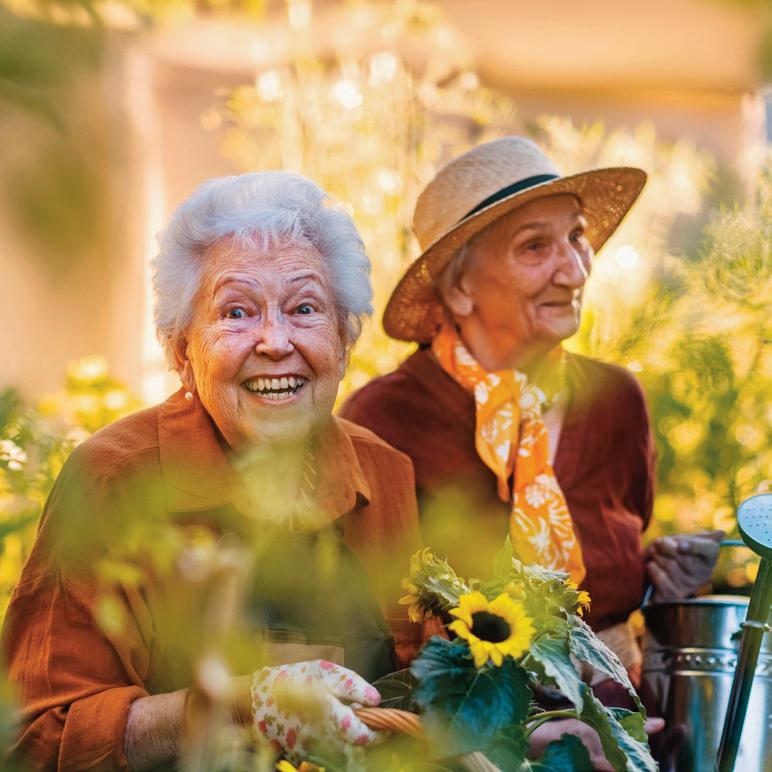


Last night, as the Employment Rights Bill was debated at Report Stage in the House of Lords, Peers discussed an amendment that was supported by Carers UK to turn the existing right to unpaid Carer’s Leave into a new statutory entitlement to paid Carer’s Leave.
During the debate, the Government made some new announcements regarding the review of Carer’s Leave that it has already committed to undertake. The review will now have a clear timetable, to be published this Autumn and a public consultation on balancing work and care will also be held in 2026 to provide carers, charities and businesses with the opportunity to directly share their views on how employers should best support carers in the workplace.
In the Government’s blueprint for workers’ rights and support, Make Work Pay, the Government said that they would review the implementation of Carer’s Leave and examine all the benefits of introducing paid Carer’s Leave, while being mindful of the impact of any changes on employers, particularly small employers. Last night’s amendment now puts that review about carer’s leave on a more open footing.

“While the Government spokesperson responding, Lord Leong, was clear that the Government would not be supporting the amendment, he recognised the strength of feeling from carers, carers’ organisations, employers and Peers about unpaid carers and paid carer’s leave. The Bill will continue to be examined in the House of Lords on Wednesday 16 July.
Responding, Helen Walker, Chief Executive, Carers UK, said:
“We are pleased to see the Government put the review of Carer’s Leave on a clearer footing and look forward to working with Government to share the excellent practice and knowledge of our Employers for Carers forum.
“The consultation on support for carers who are juggling work and care must lay the foundations for the introduction of paid Carer’s Leave. We have carried out extensive engagement and research with unpaid carers and there is simply no time to lose. Government must make good the promises the party made in Opposition to introduce paid carer’s leave,
helping more unpaid carers stay in work.
“We are incredibly grateful to Peers who spoke in support of the amendment; Lord Palmer of Childs Hill, Baroness Tyler
There was plenty of laughter, friendly competition, and even a few strikes at HC-One’s Kirkwood Court Care Home in Kenton, Newcastle upon Tyne, as residents took part in a lively Active Sporting Day, designed to promote physical wellbeing, social connection, and mental stimulation in a fun and inclusive environment.
The event, which took place in both the home’s lounge space, featured a variety of classic games including bean bag toss, 10-pin bowling, and hoopla, with residents, colleagues, and visiting family members all getting involved in the action.
The bean bag toss was a clear favourite, with residents aiming for colour-coded targets to test their accuracy, balance, and hand-eye coordination. Staff noted a remarkable sense of focus and determination from participants, who encouraged one another with rounds of applause and cheerful banter.
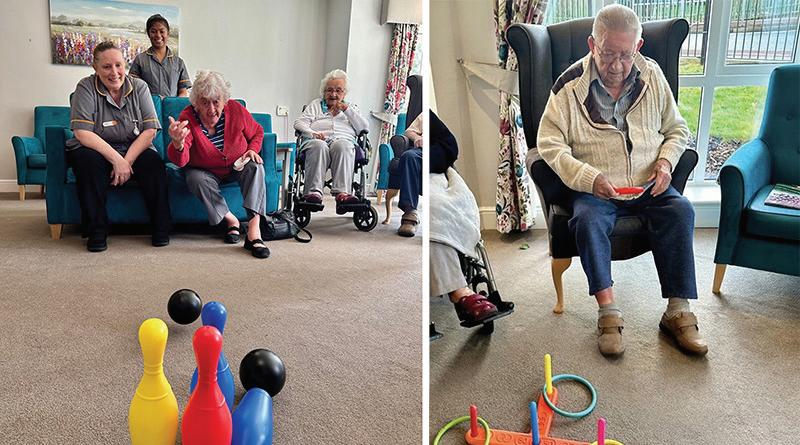
Meanwhile, the 10-pin bowling alley, saw an impressive number of strikes and spares. Residents teamed up and took turns rolling the ball down the lane, cheering each other on with every pin toppled. The game sparked plenty of fond memories, with some residents reminiscing about bowling nights with family in years gone by.
The hoopla game rounded out the day, with colourful rings flying through the air in a bid to land them
A family-run West Devon care home has joined the elite few UK social care settings to have adopted of the acclaimed ‘Butterfly Approach’ – establishing an exemplary dementia care culture where people can thrive.
West View Care Home, in Bere Alston, recently completed the significant 18-month transformation to provide a more personcentred care model and elevate its “excellent” offering even further.
Following rigorous monthly support with the team at the 28-bed home, along with those who live there, West View received accreditation in the prestigious Butterfly Approach from Meaningful Care Matters. The care and culture consultancy group specialise in focusing on the development of resilient, relationship-centred cultures of care shaped by the people living and working within them.
on pegs. As well as providing a light physical workout, the game was a brilliant test of coordination, aim, and patience, and kept residents both engaged and entertained.
Throughout the day, the atmosphere was filled with laughter, music, and joyful chatter, creating a festival-like buzz that brought everyone together.
HC-One Home Manager Karen Stewart, said:
“We believe in the power of play, regardless of age. This sporting day was a wonderful way to bring our residents together, promote movement and coordination, and spark joyful memories. The smiles on everyone’s faces said it all, we’re already planning the next one!” In addition to the physical benefits, the activities offered valuable cognitive and emotional stimulation, helping to build confidence, enhance mood, and foster a sense of achievement. The home’s wellbeing team regularly plans themed days like this as part of its commitment to meaningful, person-centred care.
The event was such a hit that the home is now exploring plans to host a seasonal “Care Home Games” series, inviting residents to compete in fun events throughout the year, with themed decorations, light refreshments, and prizes for participation.
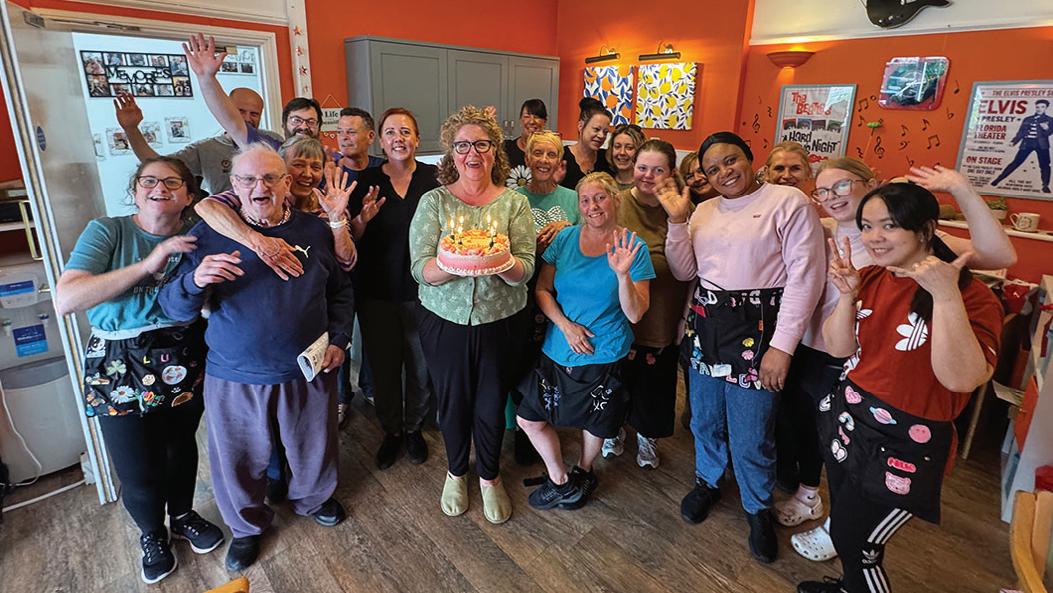
The Butterfly Approach has a meticulous focus on creating a culture where people are ‘free to be me’. It values emotional intelligence and the core belief that everyone has a unique story that has meaning and matters. It also encourages care providers to put the focus back on the people they care for and their emotions, by engaging in the reality of people’s lived experience in the ‘here and now’.
The transformation at West View included splitting the home into two separate living areas – Wren and Robin – where people with early-onset dementia or without dementia live together and people who experience more complex needs or later stage dementia live together. This fundamental change to a small household approach has enabled holistic care to flourish, where emotions-based care is balanced with clinical care best practice.
The home has also been decorated with vibrant colours and murals to bring warmth, with items of interest all around representing each individual and their life story – what Meaningful Care Matters calls the ‘stuff of life’, creating a family atmosphere.
Diane Kehoe, Manager at West View Care Home, said: “As a second-generation family-run business, we always aspire to create a stimulating, engaging and enjoyable environment – and the Butterfly Approach has provided us with the platform to offer that around the clock. I was already familiar with the approach
and saw the potential West View had in achieving it. The transformation was not easy, and we had a few challenges along the way, but the rewards upon completion have made it so worthwhile.
“We believed in the whole process from the outset and the staff embraced it – showing so much patience and kindness. They treat the residents like family, enjoying life together with lots of laughter and fun. When you step into the home now you can really sense the buzz of the place, and the level of care is both phenomenal and heartwarming.”
The overall findings from Meaningful Care Matters during a final audit last month identified the home as “excellent”, offering a highly engaged service that prioritises meaningful moments and where emotion-focused care is consistently seen, felt and heard in interactions with people. It also reported that individuality and self-expression are encouraged within the home, allowing people to freely be themselves.
Peter Bewert, Managing Director of Meaningful Care Matters, said: “West View has transformed into a truly wonderful home. The team have clearly embraced the desire to change and have achieved amazing results, being guided and supported by Diane. They have also lifted their CQC rating from ‘Requires Improvement’ to ‘Good’ and are aiming over the course of the year to reach ‘Outstanding’. They have also been supported by the local service improvements team, who were so impressed at the transformation that they plan to use West View as a role model for other homes.”
Peter continued: “The journey has been incredible. From what we would call a ‘traditional’ care home, West View has come alive and now has a genuine feeling of family, togetherness, love and purpose for the people living there.”
The home aims to continue elevating its high standard of care, with ambitious plans to be acknowledged and approved by the National Dementia Care Accreditation Scheme. It also plans to achieve the ‘gold standard’ for end-of-life care by the Gold Standards Framework.
For more information on West View Care Home, please visit https://westviewcarehome.co.uk/.
For more information
The UK Digital Health and Care (UKDHC), the professional organisation representing clinical and non-clinical health informaticians, today outlined 10 key strategies to support the delivery of the NHS 10 Year Plan, Fit for the Future. The strategies focus on strengthening the digital capabilities of the health and care workforce, fostering cross-sector collaboration and embedding innovation to help build a more sustainable patient-centred system.
The NHS 10 Year Plan sets out three transformative priorities: shifting care closer to communities, focusing on prevention and harnessing digital technology to improve outcomes. UKDHC strongly supports these ambitions and believes that delivering them will require committed leadership, shared responsibility across sectors and a willingness to challenge systems that no longer serve patients or professionals. The pace of innovation during the Covid-19 pandemic proved what is possible, and that same urgency and collaboration must now underpin long-term change.

UKDHC sees the NHS 10 Year Plan as a vital springboard to revitalise health and social care across England and the devolved nations. The agility shown by the health and care workforce during the pandemic demonstrated that rapid progress and change are achievable when there is clear focus and shared purpose. However, success depends on more than vision; it requires sound planning, securing stakeholder buy-in and creating small tangible wins that build momentum over time.
Recognising the challenges that come with digital transformation, UKDHC provides a safe space for conversation among digital healthcare leaders and activists to explore both the benefits and practical chal-
lenges of the plan. This includes addressing workforce well-being by reducing digital friction and technostress, ensuring that health and care professionals are supported as they adapt to new technologies and ways of working.
Achieving the plan’s goals will require broad collaboration with local councils, health and care organisations, professional bodies, private sector partners and voluntary groups. UKDHC emphasises the importance of inclusivity, ensuring both smaller and larger stakeholders have a voice in shaping the future of digital health and care.
UKDHC also highlights the need for evidence-based innovation, recognising that digital solutions should be properly evaluated and integrated. Challenges remain such as digital tools being implemented onto staff without adequate evidence or commissioning, which can undermine adoption and impact. Addressing these issues is essential for fostering a positive culture of innovation within the NHS.
To support the NHS 10 Year Plan, UKDHC offers a comprehensive set of strategies designed to enhance capabilities across health and care, encourage partnership working, uphold responsible data use and accelerate the adoption of new solutions. These initiatives aim to create a more effective and sustainable health system that puts patients at its heart.”
“The success of the NHS 10 Year Plan depends on our ability to turn ambition into action,” said Professor Angus Wallace, Chair of the Board of Directors at UKDHC. “That means equipping health and care professionals with the digital skills, data confidence and leadership support they need to drive meaningful change locally and nationally. UKDHC is part of that journey.”
The Mayor of Winchester, Councillor Sudhakar Achwal, has officially opened the new extension at Hartford Care’s ‘Outstanding’ rated Tegfield House care home on Chilbolton Avenue, Winchester.
The £5 million extension and renovation work includes a dining room with lifestyle kitchen, an additional lounge overlooking the garden, a hair salon and a new courtyard, along with 15 new en suite bedrooms.
The local community attended the unveiling event which also included live music, an opportunity to view the home and chat with residents and staff.
The Mayor of Winchester, Councillor Sudhakar Achwal, comments: “It was a pleasure to be a part of this special occasion and an absolute

honour to cut the ribbon to officially open the new facilities at Tegfield House, which has been extensively renovated including a beautiful courtyard space. I could feel the genuine joy and appreciation amongst everyone present and it was especially heartwarming to meet and speak with the residents and the wonderful, dedicated staff.”
Sarah Robertson, Home Manager at Tegfield House, comments:
“Our new extension has provided our residents and visitors with an improved social environment, and our lifestyle kitchen in particular helps our wonderful residents maintain their independence. It was great having members of our local community come and take a look around our home and see the improvements we’ve made.”
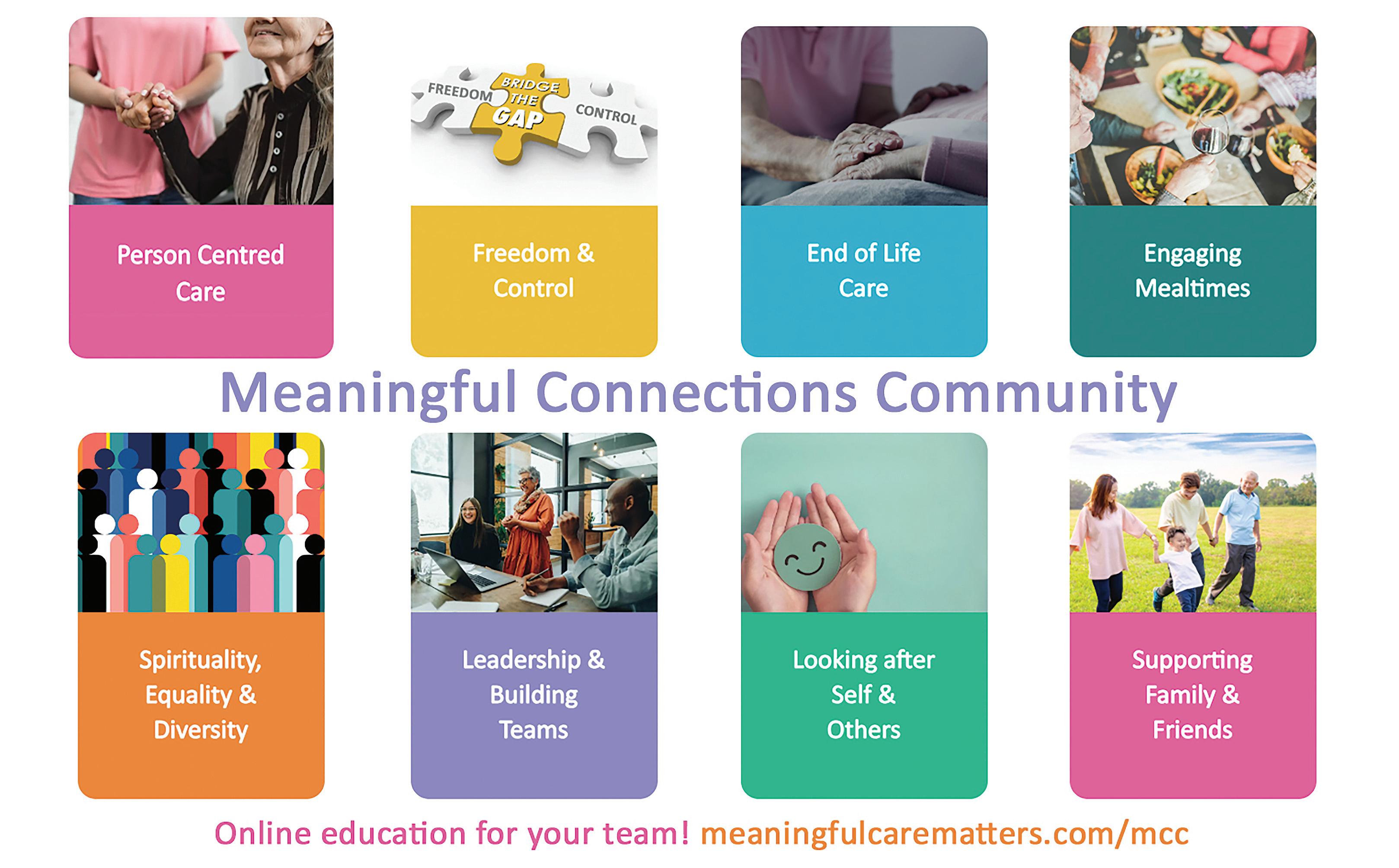
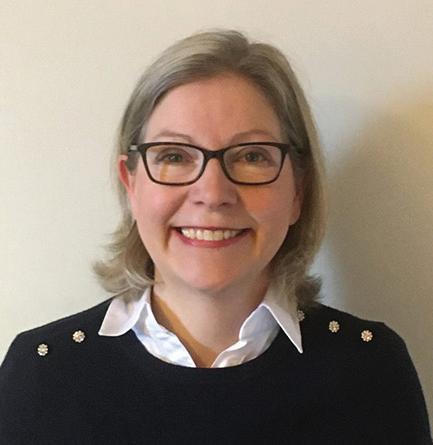
Clubs, schools, day centres and other community settings could help to make health and care more accessible, new research suggests.
Familiar places like these could remove barriers to care, like not being sure if there is a health or care issue, where to go, how to get there, who to see or what to tell the health or care practitioner.
This is one of more than 20 recommendations made by people across the UK who researchers say are rarely consulted about the design of health and social care services.
The report, titled Designing the future of care with seldomlistened-to people, encompassed ten projects across the UK, from Kent in south east England to the Highlands and Islands in Scotland.
“The people in our study are from communities which aren’t often listened to or included in discussions about the design of health and care services,” explained Professor Mary Stewart, academic lead for the project and Director of Social Interaction, Mental Health and Wellbeing at Heriot-Watt University in Edinburgh. “And yet these com-
“Joined
munities can experience profound health and care inequalities that can impact on their physical and mental health, quality of life, and the ability to live well – not only for the individual – but also their families and the wider community.
“Our research sets out the specific ways in which staff, organisations, stakeholders, and policymakers can place seldom-listened-to individuals and communities at the heart of the design of the future of health and care.”
“We show not only that this is possible – but that it’s vital to co-design the future of health and care with these people and communities to improve health and care for everyone.”
Through a series of activities and workshops, the seldom-listened-to participants ‘reimagined’ health and social care services which could give them more say in decision-making, help them to access and engage with care – and use safer spaces to build trust and rapport.
Research co-author Bryony Nisbet, a Psychology Research Assistant at Heriot-Watt University, explained: “By safer spaces, we mean community places that are already familiar to people, and where they may already have support from trusted others. For example, if you’re an autistic adult with learning disabilities, accessing health and care in a day centre you already attend potentially removes the huge physical and sensory overload of trying to get to and navigate around a new place you’ve never been to before. For the NHS and social care, the practical change we’re proposing is moving the point of care from GP surgeries into the community. This in turn can help to tackle the growing burden on primary care in the UK.”
Social care collaboration and use of an “outside the box” approach to recycling of community equipment means daily life is now safe for teenager Rhianna Maness.
The 17 year-old has complex disabilities, including seizures and being non-verbal. Her parents Melissa and Darren themselves have health issues.
Getting Rhianna up and down stairs was becoming a risk, but the conventional solutions- a stairlift or through-floor lift- were not viable.
Rhianna’s Occupational Therapist at Calderdale and Huddersfield NHS Trust found out about AAT’s Sella stairclimber, and reached out for assessment support. It worked!
A Sella was available at Medequip’s stores for Kirklees’ Council, as were some of the accessories needed to ensure Rhianna was sat secure and properly supported as she needed. As a result, using the re-issue capability of the stairclimber, Rhianna’s carers can now transfer her up and down the stairs without risk to her or themselves. Should Rhianna have a seizure en route, the stairclimbing process can be safely paused for as long as required.
“It’s been a real life saver,” says Melissa. “Rhianna’s face shows that she enjoys it, and it’s made the world of difference to us all.
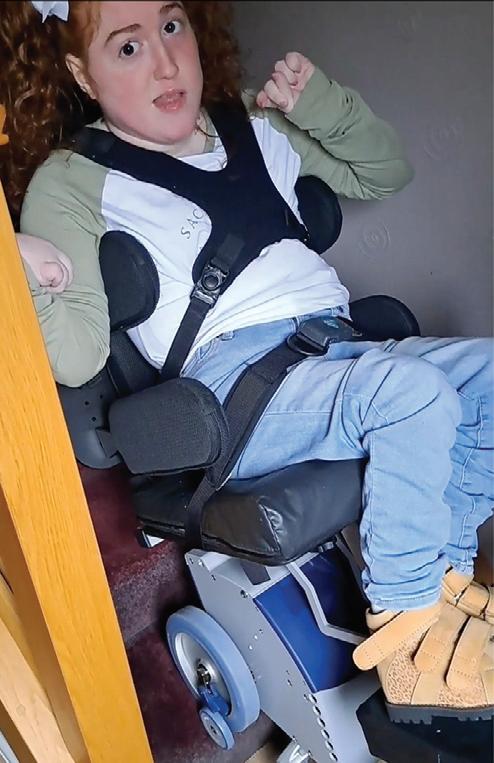
“It was a bit scarey to start with at the top of the stairs, but AAT trained us fully in how to use the stairclimber safely. If Rhianna has a seizure, we just stop until it’s passed and we can resume.”
Adds Gareth Brown of AAT, “Rhianna requires significant support to sit. We had most of the accessories she needed in stores @ Kirklees, so there was only need to purchase a couple of small additions. Her access to all levels of the family home has been made safe, including assessment, equipment and training, for around £1000- a fraction of the cost of other solutions, had they been viable.”
AAT’s re-issue facility for stairclimbers is unique within the sector. It means that- where appropriate- necessary, reasonable and practical changes can be made to make stairs safe for someone with reduced mobility, for <£1000/ £650 pa(1). There are no structural alterations nor permanent restriction of the stairs for other members of the household.
Full details can be found here:
www.aatgb.com/taking-steps-to-reduce-adaptation-delay-for-650-recycle/
Care UK is leading the way with implementing the Veteran Friendly Framework. The provider is now the most accredited in the country.
A total of 37 Care UK homes currently operate under the Veteran Friendly Framework, with a significant number of homes working towards the accreditation.
Care UK’s journey started last year; its homes in the north west of England being some of the first to sign up to the initiative, with Macclesfield’s Hollins Park care home being the first to secure the accreditation for Care UK. Since then, homes have continued to gain this recognition, and The Willows, based in Middlesbrough, was the 100th care home in the UK to take on the scheme.
The Veteran Friendly Framework (VFF) is a collaboration between Armed Forces charities Royal Star & Garter and Royal British Legion, and NHS Veterans’ Covenant Healthcare Alliance (VCHA).
The VFF is designed to support veterans living in care home settings. This includes those who took part in National Service across Care UK homes, the VFF accreditation allows colleagues to provide emotional support, daily structure, and community outreach for those who have a history with the Armed Forces.
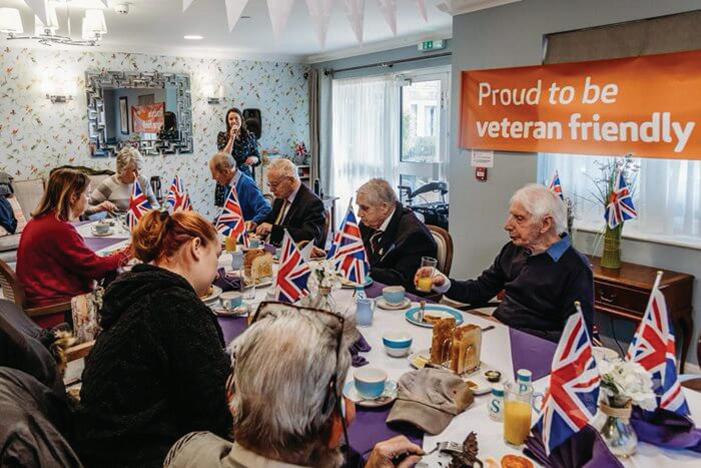
To become accredited, providers or individual care homes must meet eight standards. For two of these, Care UK has reaffirmed its commitment to those who have served by signing the Armed Forces Covenant and agreeing to support the Armed Forces community as an employer.
At a home level, these standards include: noting Armed Forces status within care plans; addressing social isolation; and signposting to support services, such as their local Royal British Legion branch, and other charities that provide support for veterans or partners of veterans.
Major Tony Finch, Head of the NHS Armed Forces Network for the South East regularly visits Care UK’s Invicta Court care home in Wavering, Kent. He said: “The most important part is coming together with peers and people who understand – whether they’re Navy, Army, Air Force – that whole atmosphere brings back that sense of belonging [for veterans]. Care UK is being forward-thinking and innovative in making use of their facilities by inviting other people in – it helps to support the veterans who are here.”
Rachel Harvey, Director of Care, Quality and Regulatory Governance at Care UK, said:
“We believe in person-centred care. It is crucial that every resident receives this thoughtful and considered experience from colleagues and, with the support of the Veteran Friendly Framework, we can deliver this in a holistic way.”
“Since implementing this accreditation, we have noticed that former veterans in our homes have, overall, become more sociable and that their distressed behaviours have lessened. By learning and honouring their stories, and reintegrating them into their Armed Forces community, it means we can give veterans the best support possible during their care journey.”
Kathryn Glass, VFF Project Lead at Royal Star & Garter, said:
“This is a great commitment to continuous improvement in the delivery of person-centred care for veteran residents and their partners.”
“This programme will benefit both current and future residents, along with team members, who are able to access enhanced training and guidance to better engage with the unique military experiences that residents and their partners have lived through. Being a VFF care home means that there is an increased understanding and recognition for the veteran community.”

The tenth annual Co-Production Week, hosted by the Social Care Institute for Excellence (SCIE), has revealed compelling new insights into how co-production is reshaping adult social care. With the theme ‘Innovation through co-production’, the week, which ran from 30 June – 4 July 2025, served not just as a celebration, but as a turning point and call to action.
At the heart of the week’s activities was the launch of SCIE’s new report, Embracing change: scaling innovation in care in practice, setting out how urgent action is needed to scale up innovation in adult social care and meet the growing demands on services, particularly for unpaid carers. The report draws on Englandwide evidence from a rare, extensive practice-based testbed for social care innovation, sharing invaluable learnings for the social care sector from SCIE’s hands-on support provided to local authorities via the Department of Health and Social Care’s Accelerating Reform Fund (ARF).
The Fund has supported over 120 projects requesting co-production from the start, aiming to improve adult social care through innovation and scaling, with a particular emphasis on supporting unpaid carers.
A key learning from the week has been that co-production is no longer a ‘nice to have’ but is a necessary means for innovation. Local and national leaders should be looking to build innovation into policy reform, starting with co-production with people and communities; people with lived experience want genuine, transparent co-production that includes their voices at the start in the planning stages of projects, in delivery and throughout, leading to visible change. People seeing the impact and the difference co-production is making means including ongoing feedback about how their

insights and expertise are being used to improve services.
Kathryn Marsden OBE (formerly Kathryn Smith OBE), SCIE Chief Executive, said:
“This week has shown us that innovation and co-production go hand in hand. While huge strides have been made up and down the country, there is much more work to do in embedding co-production in policy and practice and creating equal partnerships to develop better ways of doing things in social care. Co-production offers the chance to transform health and social care into a model that offers people real choice and control.
“The strength and creativity that comes from genuine collaboration is clear from our report, webinars and online conference sessions. We’ve seen bold ideas emerge, grounded in the real experiences of people drawing on care and support, unpaid carers and professionals alike. What’s been most powerful is the shared willingness to challenge assumptions and rethink how we work together. That spirit of curiosity and openness is what will drive real, lasting change.
“Now is the time to act. Together, we can reshape social care into a system that is fairer, more inclusive, and fit for the future.”
Kevin Minier, Co-production Network Member at SCIE, said:
“National Co-production Week is where we celebrate what has been achieved and recognise what still needs to happen. Co-producing the week ensures that the things which matter to people who draw on services, including carers, are kept front and centre. The projects we have seen are innovative because they have been co-produced and have changed culture. Co-produced projects not only provide better outcomes, they are scalable and spreadable, reach more people and the lessons learnt can be applied to other projects.”
In a heartwarming display of intergenerational engagement, eightyear-old Spencer Whittenham from Burton has embarked on a unique mission: teaching older residents the joys of modern gaming.
This initiative highlights the benefits of activities between young and older people, and the crucial importance of keeping them connected in an increasingly digital world.
Spencer, a keen gamer himself and owner of global YouTube channel Spencer Arcade, noticed a gap in digital literacy and social interaction among some older members of his community and inspired to make a difference, he began volunteering his time at local community centres and care homes, offering personalised gaming lessons to seniors eager to learn.

From navigating virtual worlds in Roblox to mastering simple puzzles, Spencer patiently guides his new friends through the digital landscape, fostering a sense of achieve-
ment and fun.
"It's really cool to see them laugh and get excited when they win a level," says Spencer. "Gaming isn't just for kids, it's for everyone and it's fun to teach."
The initiative has quickly gained traction, with participants reporting not only improved digital confidence but also a significant boost in mood and social interaction.
"I never thought I'd be playing video games at my age, but Spencer makes it easy and enjoyable," commented Ireene Bower, 78, a participant at Carlton Court retirement village in Burton. "It's wonderful to connect with the younger generation and learn something new. It really brightens my day."
"The importance of keeping older people is so important," said Spencer’s dad Jason. "Isolation can have serious impacts on health and happiness and I’m really proud that Spencer's own initiative is a brilliant example of how simple,
ideas can make a huge difference in fostering vital connections.”
In care environments where hygiene and safety are paramount, Jangro’s Professional Nitrile disposable gloves (DG130) offer a dependable solution, meeting the rigorous demands of daily care tasks. Designed with caregivers in mind, these gloves provide a comfortable fit without compromising on protection.
Made from high-quality nitrile, these gloves are both powder and latexfree, making them an ideal choice for individuals with latex sensitivities. Nitrile technology provides an exceptionally soft and pliable material that conforms naturally to the shape of the hand. This flexibility reduces hand fatigue during prolonged use and extended wear, allowing caregivers to perform tasks with comfort and ease. Textured fingertips enhance grip, even when wet, ensuring precision during delicate procedures. Whether assisting with personal care, handling food, or performing cleaning duties, these gloves support a wide range of applications within care settings. They’re more than just protective, these gloves are fully compliant with EN455 standards for medical use and EN ISO 374-5 for protection against bacteria, fungi and viruses, underscoring their suitability for infec-
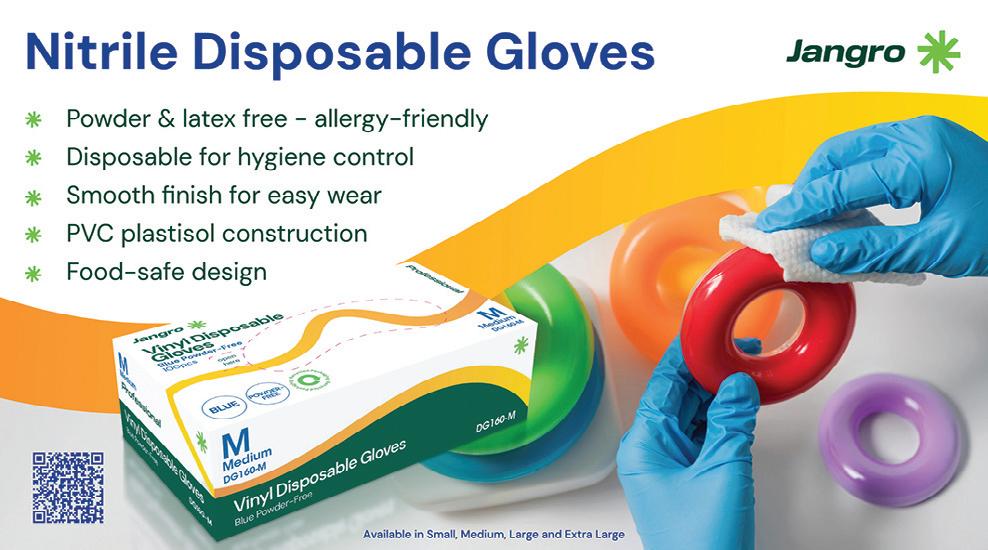
tion control protocols. They also comply with the Medical Devices Regulation (EU) 2017/745 Class I and are manufactured in accordance with the Personal Protective Equipment Regulation (EU) 2016/425. Plus, they’ve been tested for food safety compliance under Commission Regulation (EU) No 10/2011, meaning these gloves are as versatile as they are protective.
The design features, including ambidextrous fitting and ridged cuffs for easy removal and their vibrant blue colour to aid visibility, have been carefully considered to streamline workflow for busy care professionals.
At Jangro, we understand that the right protective equipment isn’t just about meeting standards, it’s about supporting the people who care for others every day. That is why our nitrile gloves are manufactured under stringent quality controls to meet the demands of healthcare environments, providing peace of mind for both staff and residents.
For more information or to view the full range of disposable gloves visit Jangro’s official website. www.jangro.net
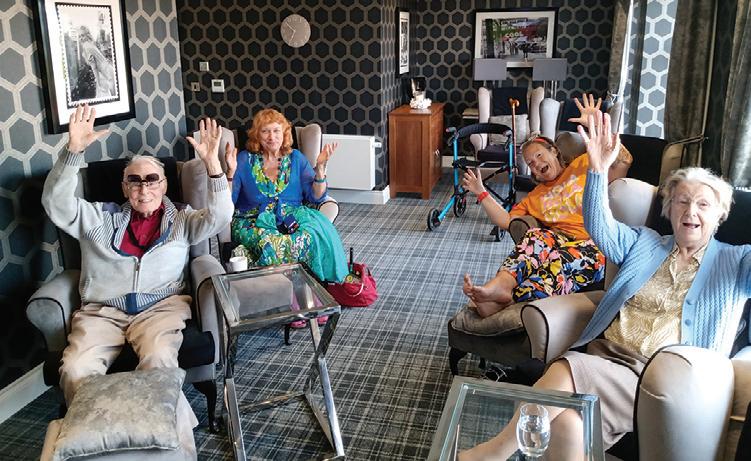
Resident, Lesley Richards commented: “I
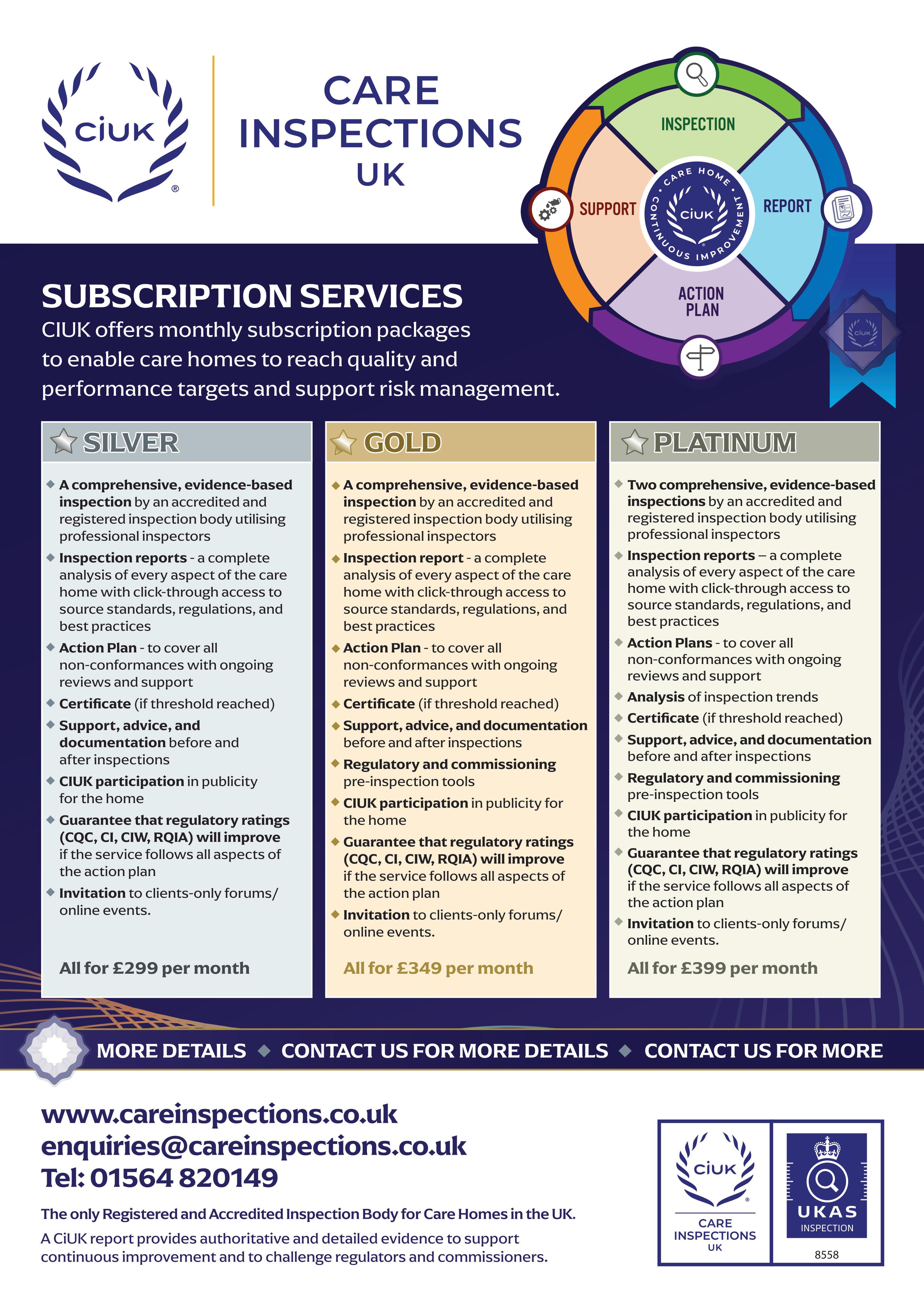
By Becky Mundie, RotaCloud (https://rotacloud.com)

How much time do you spend on admin?
How long are you locked away in your office to make the rota, only having to go back again and again for amends? How often have you realised you’re understaffed, resulting in overspending on agency staff? How frequently do payroll errors, messy audit trails, and chasing staff who missed a shift update occur?
It’s constant, the stress of it all. It’s enough to carry the care of your service users on your shoulders without being overwhelmed every day by repetitive admin and errors. You never thought you’d be spending more time amending schedules, chasing for cover, and correcting issues than your actual job.
But those inefficiencies — staff shortages, payroll errors, missed shift updates, and multiple spreadsheets you juggle — cost you money, time, staff retention, and, in some cases, compliance.
It’s easy to suggest investing in budgeting tools or certain tech to help you understand spending before it happens and to automate certain processes. Budgets are tight in care, after all. But there are simple fixes to cut your operating costs without cutting back on care if you can’t yet turn to digital systems. Cutting costs doesn’t just mean spending less. It’s about making smarter decisions – reacting to and fixing
the cause of the problem, not the effect. And it all starts with your rota.
There are ways to take better care of your rota, which will, in turn, improve efficiency and staff morale. One main way: putting your staff first.
First, give your team more say in when they work by allowing them to submit their availability. Try making a rolling rota with a mix of most and least preferred shifts so everyone gets a fair share of them. It means far less admin for you when the rota repeats, far fewer last-minute amends, a more accurate payroll, an easier audit trail, and no more miscommunications on when everyone’s working.
Second. Share rotas at least two weeks in advance. Doing so allows enough time to make amends and for everyone affected to be updated. Sticking to this process is more efficient, which means less admin – which means more time to focus on service users.
Third Put in a more seamless process for holiday requests. Whether a submitted form or limiting to one means of messaging, sticking to one process means fewer lost or forgotten requests and much less paperwork. Plus, allow staff to arrange shift swaps themselves, leaving managers to simply approve or deny. Again, less time on admin means more time for service users.
All in all, your saviour is flexibility. Flexibility in rotas means less admin for managers, more efficient teams and safe staffing levels, happier staff (and higher retention rates), and, in return, happier service users – all saving costs in the process. After all, when you aren’t making last-minute changes or relying on agency staff to cover no-shows, you stick to the staffing levels and labour budgets you’ve forecast. So long, overspending, lost time, and inefficient processes.
Hilton Park Care Home in Bottisham
of Hilton Park will provide free food and drink to all emergency service staff.
Geanina Tinca, the General Manager of Hilton Park Care Home has extended the invitation throughout the local area, stating that “to say
thank you for all of the great work our emergency services do for us, we here at Hilton Park are inviting all members of the police, ambulance and fire services to pop in and take their duty break on us for free.
“We are pleased to offer all of our local service workers who stop in tea, coffee, juice, chilled water, delicious homemade cake and biscuits and a healthy selection of fruit, available free of charge. Our comfortable facilities include free Wi-Fi and service with a smile; do stop in and say hi, we would be delighted to see you!”

The Rookery care home in Ebbw Vale has undergone a major refurbishment as part of a significant investment designed to enhance the comfort and wellbeing of its residents.
Communal areas throughout the home – including corridors, the lounge, dining room and conservatory – have been completely transformed, bringing a fresh, modern feel to the much-loved care home. In addition, six of the bedrooms have been fully refurbished, with plans in place to upgrade the remainder on a rolling basis to ensure minimal disruption to residents.
Known for its strong community spirit, The Rookery has established deeprooted connections with local organisations, schools and churches, helping residents maintain an active role in the wider community and enjoy a varied and fulfilling social life.

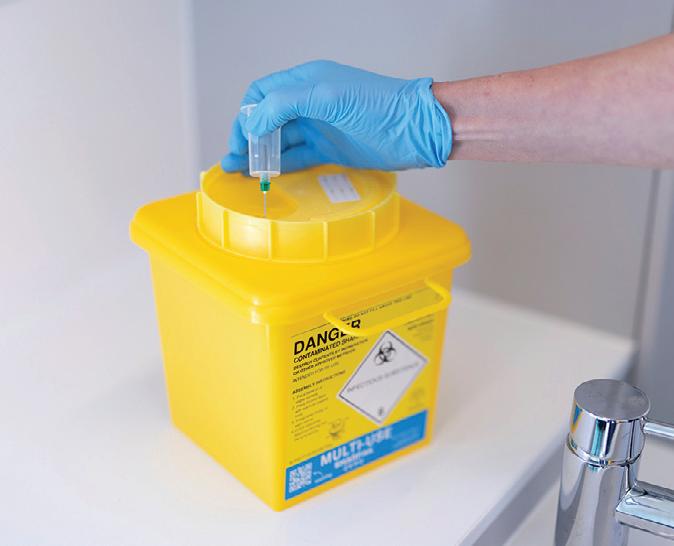
Sanaway, a leading clinical waste, sharps, and washroom hygiene service provider, has introduced new reusable and recyclable sharps containers as part of its auditable ‘Zero Waste to Landfill’ service commitment.
The initiative is part of Sanaway’s ongoing focus to reduce environmental impact for both the company, and its nursing and residential care home customers.
The new reusable recyclable sharps container enables one container to be reused 10 times before being recycled into new reusable sharps containers. The container’s VisiLOCK system optimises safety by eliminating the risk of content spills that may lead to cross-contamination or accidental needlestick injury.
The family-owned business operates across the South of England, servicing customers that demand a reliable, personal and high standard of service at a competitive price.
Co-founder and director, Patrick Martin says: “We are exceptionally proud of our environmental philosophy and commitment, which has been at the core of the company since day one.
“Providing the new reusable sharps service is now standard for all our customers, and at no extra cost. This not only demonstrates our dedication to help minimise the impact our industry has on the environment, but can also help customers achieve up to an 87% carbon saving. This being in line with the NHS’s targets for a 50% reduction in emissions by 2026.”
REDUCE, REUSE AND RECYCLE
Each sharps container has a VisiLOCK closing mechanism to ensure optimum user safety. Once full:
• The containers are collected by Sanaway delivered to the processing facility.
• A robot opens and photographs the contents before:
o Sharps are incinerated.
o Containers are sanitised and recovered.
“There’s never a dull moment at The Rookery,” said Alison Boote, Operations Director at HCMS, which operates the home. “We’ve created a vibrant and engaging environment, both inside and out, that supports residents’ independence, interests and wellbeing. This refurbishment reflects our continued commitment to providing a home where people not only live but thrive.”
Residents at The Rookery enjoy a busy activities programme that caters to all tastes – from gentle exercise classes to lively karaoke afternoons and calming arts and crafts sessions. During the summer months, the home’s picturesque courtyard garden becomes the heart of the action, with its raised planters allowing residents to indulge their passion for gardening and contribute to the colourful floral displays that brighten the space.
• The sharps containers are thoroughly checked before being returned for reuse.
• Containers are tracked using barcode scanning to monitor their usage cycles, after 10 uses, the container is granulated and remanufactured into a new sharps container.
• This process is repeated 10 times, meaning the original plastic is reused 100 times.
• After completing 10 full cycles, the plastic is granulated again and repurposed into non-medical products, such as road traffic cones.
Sanaway’s Zero Waste to Landfill philosophy is a market leading standard, based on Energy from Waste (EFW) technology, which means it is a sustainable solution for both waste management and energy production. 99.995% of the process is recyclable and all the recyclable elements are removed before the incineration process
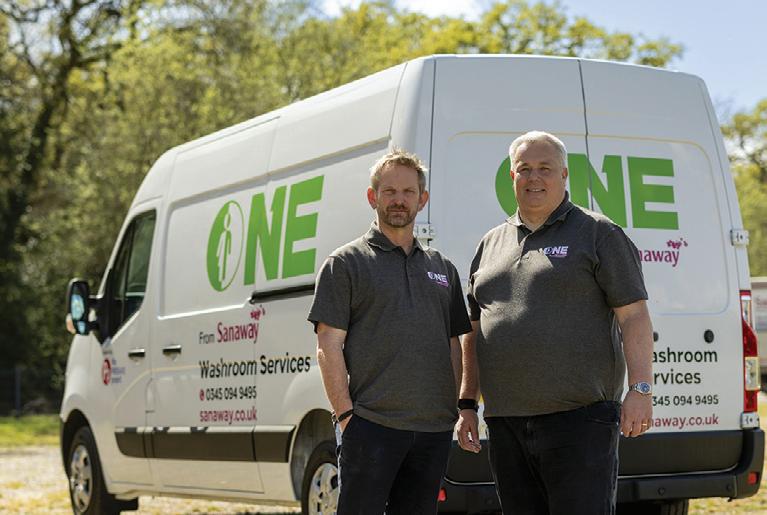
The company’s auditable Zero Waste to Landfill service diverts
pany collects from its customers every year from landfill, and
the power supply for more than 50,000 homes. The company’s ISO 9001 accreditation also gives the added peace of mind from a day to day management perspective, providing a benefit for nursing and residential care homes with ISO 14001 certification, enabling them to fulfil their continuous improvement requirements. Commenting on the new service, Martin concludes: “We believe considered improvements like these to our customer first, high service standards are the main reason many of our clients have been with us for so many years, contributing to our enviable 95% customer retention rate and year on year

The finalists for the National Association of Care Catering (NACC) Care Chef of the Year 2025 have been announced.
Following some fiercely contested heats the line-up of care chefs set to compete in the national final of the National Association of Care Catering (NACC) Care Chef of the Year 2025 competition has been announced.
This, the 25th anniversary of the competition saw five regional heats being held with care chefs demonstrating that they can compete with the best when it comes to culinary skills. The prize is to represent their region in the national final scheduled to take place on 1st October 2025. Head Judge Steve Munkley, Vice President of Craft Guild of Chefs, was accompanied by specialist judges at each event. The chefs had to demonstrate to the judges their full understanding of the meals they are providing for their residents whilst introducing their own flair through contemporary flavours.
The finalists who intend to impress the judges one more time include:
• Lorna Parsons, Colten Care
• Jack Wood, Colten Care
• Anna Koziarska, Meallmore Ltd
• Jessica Vreede, Guthrie House Care Home
• James Adcock, Aaron Court, Abbey Healthcare
• Matthew Burke, Care UK
• Dawn Louise Brown, Greenholme Care Home, Avery Healthcare
• Alex Connell, Vegetarian for Life
• Ilona Tomaz, Porthavent Care Home
• Clare Broadbent, Devonshire House, Harbour Healthcare

• Steven Wright, Caring Homes
• Caitlin Goodall, AbleCare Homes
The ninety-minute regional heat focused on the importance of food, nutrition and positive mealtime experiences as part of quality care, entrants are challenged to create an appealing and delicious twocourse menu (main and dessert) appropriate for people in a care setting. The combined food cost for both courses should be no more than £4.50 per head based on three portions and it must be nutritionally balanced. The menu must also feature at least one product from Unilever Food Solutions’ sector-relevant catering range.
Head Judge, Steve Munkley said: “This is the fifth year I have been involved and it’s going brilliantly. The standards continue to improve year on year and we have some great cooks out there in the Care Sector. This competition is a brilliant example of showcasing that talent.”
Neel Radia, National Chair of the NACC, said: “Congratulations to all those making the final of the NACC Care Chef of the Year Competition 2025! We are celebrating the Silver Jubilee of this fantastic event. The standards that we see in this competition is as high as it has ever been and the dishes served would bring delight to any diner, wherever they were eating. The finalists should be immensely proud of their efforts so far. I am sure that they will want to impress the judges once more in October.”
The NACC is supported by main sponsor Unilever Food Solutions along with longstanding event sponsor, the Worshipful Company of Cooks. This year they will be joined by new sponsors including crockery sponsor, Foodcare Systems, small equipment sponsor, Metcalfe Catering Equipment, heavy equipment sponsor, Rational UK. and hygiene sponsors Blueleaf Care.
For more information on the NACC Care Chef of the Year 2025 competition visit https://nacccarechefoftheyear.co.uk/2025
For the past couple of months, residents of HC-One’s Ashington Grange Care Home in Ashington, Northumberland, have been delightfully visited every day by a very friendly young cat. As the team noticed her growing pregnancy and became concerned for her safety, their hearts were set on finding her the care she deserved.
Home Administrator, Ann Foggin, took to social media, reaching out on Facebook to see if anyone recognized the cat or knew her owner. When it became clear she was a stray with no home, the care home promptly contacted Minnie’s Haven Cat Rescue, a local rescue centre known for its compassionate animal care.
Thanks to swift action, the cat was taken in just in time. The following day, Minnie’s Haven shared the wonderful news that she had given birth to five
beautiful kittens in the early hours. The residents at Ashington Grange are now eagerly awaiting photos and updates of the new family — a truly heartwarming conclusion to the story.
Andrea Pringle, Home Manager at HC-One’s Ashington Grange Care Home, said:
“It was lovely that the cat came here for reassurance from our residents as she had built a lovely relationship with them. This experience has brought joy to everyone and highlights the special bond between our residents and the community around us.”
This happy ending exemplifies the care home’s commitment to kindness, community, and the wellbeing of both residents and animals alike.

A resident living at a Stainton home was reunited with a fellow “Aycliffe Angel” ”thanks to a coffee morning arranged by the home.
Jo Allan (103) lives at MHA Montpellier Manor and thanks to a coffee morning set up by the home she was reunited with her former colleague and fellow Aycliffe Angel Gwen Meggison, also 103.
Both ladies were part of around 17,000 women employed at the ROF munitions factory in Aycliffe during the Second World War.
Jo worked as a final inspector who inspected the bullets before they were sent out and Gwen worked in payroll.
They were known as “the Aycliffe Angels” after Nazi propagandist Lord Haw-Haw threatened “Those little angels in Aycliffe will never get away with it.”
Gwen's daughter Gill contacted the home after they put out an appeal looking for Aycliffe Angels to come and visit Jo and be part of the coffee morning. The families of both Jo and Gwen had bought in some memorabilia and

At Simply Food Solutions, we believe that everyone deserves access to delicious meals tailored to their specific dietary requirements. Founded over 20 years ago, the company began with a vision to provide high-quality halal meals to hospital patients. Today, as part of the Bidfood family, Simply Food Solutions offers an extensive range of food solutions designed to meet the diverse needs of healthcare providers, care homes and individuals across the UK.
Our Product Ranges
SIMPLY PUREE
Designed for individuals with swallowing difficulties (dysphagia), the Simply Puree range offers texturemodified meals compliant with IDDSI guidelines. From Level 3 (Liquidised) to Level 7 (Regular), our meals ensure safety without compromising on taste. Options include soups, main courses, desserts and snacks, all crafted to the highest safety standards. Additionally, the Simply Puree Junior line caters to paediatric needs, providing meals that are both safe and appealing for children. SIMPLY HEALTHCARE
some information which was printed off by the home and turned into a reminiscence board.
A member of the local community Kenny, who also served in the forces bought some bomb casings as well as the uniforms worn in the War.
MHA Montpellier Manor provides residential and residential dementia care for 85 residents.
Kelly Deane, deputy home manager said: “It was amazing to listen to the two ladies, and they had some very interesting stories.
“It was lovely to see their reactions when they saw each other.
“They really connected with one another and their memories from their time of working at the factory were fascinating.
“We all had a great time trying on the equipment from the War, and it was a lovely day.
“We received some lovely feedback from Gwen's family, who thanked us for putting out the appeal which allowed the two to reunite.”
Meeting the needs of patients with allergies, intolerances, or specific dietary requirements, the Simply Healthcare range includes gluten-free, allergen-aware and renal-suitable meals. Each dish is pre-plated and ready to serve, ensuring convenience and consistency in meal preparation. The range encompasses a variety of meat, fish and vegetarian options, all designed to support patient health and satisfaction.
SIMPLY WORLDFOODS
Reflecting the UK's rich cultural diversity, Simply Worldfoods offers a selection of cultural meals, including halal, kosher and Afro-Caribbean meals. This range allows healthcare providers to offer patients a taste of home, enhancing mealtime experiences and promoting cultural inclusivity.The range also provide multiportion dishes that are ideal for staff or visitor feeding cafes.

Explore our full range of products and discover how Simply Food Solutions can enhance your mealtime offerings, please visit https://simplyfoodsolutions.co.uk


Alzheimer’s Research UK is supporting the UK launch of the documentary Taking Care in which Hollywood stars Seth Rogen and Lauren Miller Rogen share their experience of Alzheimer’s disease.
Directed and produced by award-winning filmmaker James Keach, Taking Care is a 38-minute documentary following the journey of Seth and Lauren as they navigate the complexities and heartbreak of Lauren’s mother’s young onset Alzheimer’s disease.
Lauren’s mum, Adele, was diagnosed with Alzheimer’s aged just 55. She died in 2020.
Through humour, heart, and an unwavering commitment to change, Taking Care imparts a message of hope, resilience, and the profound impact individuals can have when they seek solutions to society’s greatest challenges.
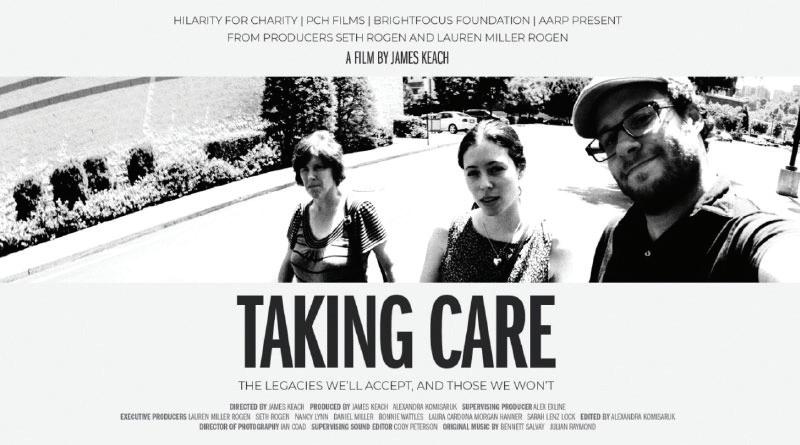
“This film is a part of us, as deeply personal as our journey with Alzheimer’s. We want to foster a sense of hope, empathy, and understanding in our audiences. We hope viewers will be inspired to improve their brain health, support caregivers, and advocate for a future centred on dementia prevention, treatment, and support.”
Alzheimer’s Research UK has joined forces with Seth and Lauren’s charity, Hilarity for Charity, and BrightFocus Foundation to support the film and highlight its vital messages.
Samantha Benham-Hermetz, Executive Director of Alzheimer’s Research UK, said: “We are so grateful to Seth and Lauren for sharing their experience of Alzheimer’s disease.
“In the UK, the US and around the world there remains a lot of stigma and misunderstanding around dementia. So, having two people with such a high profile shining a light on the condition will be hugely impactful.
“It is estimated there are 55million people living with dementia worldwide, including nearly one million people in the UK. This number is projected to triple by 2050, rising to more than 150million.
“Dementia is one of the biggest global health crises, so the important messages highlighted in the Taking Care film are so vital and urgent.
“The film highlights the need to improve diagnosis, find new treatments and spread the message of the steps people can take to improve their brain health and reduce their risk of developing dementia.
“We hope this film will spark conversations and bring about change for people with dementia and their families.”
The film can be watched on Amazon Prime and via other streaming services. To find out more about the film, go to www.takingcarefilm.com
PASS by everyLIFE, the leading care management software provider, has announced a major recruitment drive following the successful launch of PASSgenius™ - its new suite of AI, data, and automation tools designed to help care providers make smarter decisions and improve service performance.
The company is expanding its team across the board, targeting overall annual headcount growth of 25% by the end of 2025. This includes more than doubling its Customer Growth & Engagement functions, enabling the business to meet growing demand while continuing to prioritise customer support and success.
"PASSgenius™ has opened up a new chapter for PASS," said Robin Batchelor, CEO of everyLIFE Technologies, the company behind PASS.
"We’re not only seeing increased demand from care providers, but also growing interest from talent who want to build technology that genuinely makes a difference

in people’s lives. This is about scaling responsibly and investing in the people who will take us forward."
The recruitment drive spans multiple departments, including Engineering, Customer Success, and Growth, with roles offered on a hybrid or remote-first basis across the UK.
This expansion comes as digital transformation in the care sector continues to accelerate, with providers under pressure to deliver more with fewer resources. PASS’s latest innovations - including real-time performance dashboards and AIpowered care insights - have positioned it as a trusted partner to providers navigating operational and regulatory challenges.
For more information about current vacancies, visit www.everylifetechnologies.com/careers
In care homes, where hygiene, safety, and reliability are paramount, it’s essential that laundry operations run seamlessly. Forbes Professional’s Complete Care solution is tailored to meet the specific demands of this environment, offering fully supported and cost-effective laundry systems.
With Complete Care, care homes benefit from access to premium commercial laundry appliances without upfront capital expenditure. The all-inclusive rental plan covers installation, routine servicing, maintenance, and repairs; enabling staff to focus on resident care rather than laundry appliance logistics. Unexpected breakdowns can severely disrupt operations, which is why Forbes provides nationwide, award-winning support with a same or next-day engineer response to minimise downtime.
Preventative servicing is central to Forbes’ approach. Their offering includes routine maintenance, full certification, annual gas safety checks, and professional dryer duct cleaning - ensuring systems meet all legal and regulatory standards. Whether supporting existing machines or those rented through Forbes, this

proactive strategy improves operational efficiency and reduces risk.
Under Regulation 35 of the Gas Safety Regulations 1998, annual gas inspections are mandatory. Forbes’ Gas Safe-registered engineers conduct these checks to ensure safe, legally compliant environments. Additionally, regular duct cleaning - often overlooked - is vital not only for performance but also for fire prevention. Forbes’ nationwide service mitigates these risks while optimising dryer efficiency.
Whether you need new rental equipment, service and maintenance for existing appliances, or a full purchase, Forbes offers flexible procurement routes to suit different operational models and budgets. Their expert consultants work closely with care providers to design tailored solutions for each setting.
With decades of experience in the care sector, Forbes Professional is a trusted partner to care homes across the UK; delivering dependable, fully supported laundry solutions that prioritise safety, compliance, and peace of mind.
forbespro.co.uk | info@forbes-professional.co.uk | 0345 070 2335
The residents and staff at Barchester’s Elm Bank care home in Kettering enjoyed a truly unique and enriching afternoon recently, as they welcomed local beekeeper, Mark for a fascinating and educational talk on the wonderful world of bees.
Mark who arrived with an array of intriguing props, captivated the residents and staff with his personal journey in to beekeeping, explaining how he first started out in to the business and the dedication involved in to looking after his buzzing bees. Mark who is from Desborough covered various aspects of beekeeping from the intricate social structure of a bee colony to the vital role bees play in our ecosystem. The residents were enthralled as Mark described the process of honey production, the different types of bees within a hive, and the challenges and rewards of his profession. His
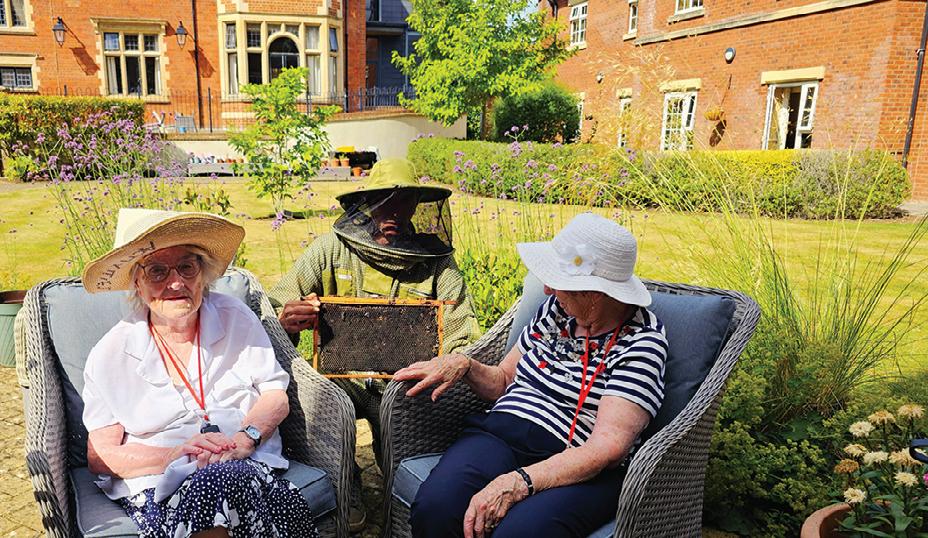
passion for bees was infectious, sparking a lively questions and conversations among the attendees.
Activities Co-ordinator, Tina, said “We really try to organise a diverse range of activities and events that are designed to stimulate, entertain and engage our residents. The visit from Mark is a prime example of our commitment to providing enriching experiences the go beyond the everyday.”
General Manager, Marvellous Bindura said: “The talk from Mark was a resounding success. It was not only educational but also so incredibly hands on for our residents, our residents enjoyed learning about the bees, and we thank Mark for sharing his knowledge and passion with us.”

The 2025 GP Patient Survey has revealed a concerning trend: the health of unpaid carers in England has worsened.
The survey reveals that carers were more likely to have felt isolated from others in the last 12 months (18% compared with 14% non-carers).
Carers were also more likely to say they had a long-term condition, disability or illness (61% compared with 49% non-carers). In terms of specific conditions, carers were more likely to report a long-term mental health condition (14% compared with nine per cent), and arthritis or an ongoing problem with their back or joints (22% compared with 15%).
Carers were less satisfied with the appointment they were offered (78% satisfied compared with 84% noncarers). Looking into potential reasons for this, carers were more likely not to take the appointment they were offered because they couldn’t see their preferred GP, the type of appointment they wanted was not available and because they couldn’t book ahead.
Carers were more likely to contact an NHS service when their practice was closed (27% compared with 18% non-carers), and more likely to resort to A&E services instead (27% of those who contacted an NHS service when their practice was closed went to A&E compared with 22% non-carers).
at Carers UK, said:
Helen Walker, Chief Executive
“This year’s GP Patient Survey reflects a worrying trend for unpaid carers’ health. 72% of carers said that they have a physical or mental health condition or illness expected to last 12 months or more – an increase from 70% in 2024.”
“There is a growing health gap between carers and non-carers, 61% of whom say they have a long-term condition or illness. These results reflect our own research which shows that the pressures of caring often take their toll, impacting on unpaid carers’ ability to prioritise their own health needs.”
“More than half (57%) of people responding to our latest State of Caring Survey say they feel overwhelmed ‘often’ or ‘always’. Over a third (35%) say they have ‘bad’ or ‘very bad’ mental health, compared to 27% in the previous year’s survey.”
“Now is the time to get serious about caring for our carers. Changes in the NHS 10-year plan can’t come soon enough as far too many carers are overwhelmed and at risk of burnout. Challenges with underfunding in social care are also impacting on peoples’ ability to take a break and recharge their batteries.”
“Over half (55%) of unpaid carers looking after a family member or friend take a year or more to realise they are caring. We must see systematic and routine identification of unpaid carers by healthcare professionals and targeted support to deliver practical and emotional help.”
A chef at a Sutton-in-Ashfield care home has won Anchor’s Chef of the Year competition following one final showdown at The School of Artisan Food on Thursday 3 July.
Shaun West, a Chef Manager at Anchor’s Kingfisher Court care home on Kingfisher Way, went up against chefs from across the care home portfolio of Anchor, England’s largest not-for-profit care and housing provider.
Entrants in Anchor’s prestigious Chef of the Year competition submitted a three-course recipe – starter, main course, and dessert. The judges looked at the nutritional value of the meals, the presentation, the taste, sustainability including how much food waste was produced, and how residents had been involved in choosing the menu.
The four finalists then came together to produce their recipes in a cook off at The School of Artisan Food. Among the judges on Thursday was the 2024 Chef of the Year winner Lewis Cutler, representing West Hall care home in Surrey.

In the end though, there could only be one winner. Shaun was crowned at the official ceremony later that day. For his menu, Shaun served: Pan fried mushrooms-
Anchor’s Director of Care Quality Cath Holmes, who was one of the judges at the final, said:
“Congratulations to Shaun, this year’s competition was of the highest standard, and all four finalists excelled, and they should be rightly very proud. Chef of the Year for me is one of the most important moments in the year that showcases not only the quality of our chefs and their passion for preparing wonderful meals for our residents to enjoy, but also the absolute talent we have across Anchor as a whole.”
Shaun was delighted to win, saying:
“Winning the Chef of the Year competition means a lot to me. Lots of hard work and thought went into my menu, and it’s been both a high pressure and enjoyable experience being involved in the competition. I’m very proud of challenging myself and pushing myself outside of my comfort zone.”

At Rosa Lifestyle, we believe that daily living aids should do more than just meet functional needs - they should spark joy, preserve dignity and reflect individuals’ personalities. This belief is at the heart of every product we create, and it’s a vision born from a very personal place.
Our founder, Sarah, established Rosa Lifestyle after experiencing first-hand the lack of practical yet dignified and stylish solutions available for her own grandmother, who was living with dementia. She found that too often, the market was saturated with clinical-looking, uninspired products that did little to support wellbeing or enhance the experience of those living with cognitive or physical challenges. Rosa Lifestyle was created to change that.
We design products that support people to continue eating and drinking more independently, but also with more confidence and comfort. Our core range of produces includes lightweight, two-handled mugs, compatible mug lids, and matching snack trays - all made from high-quality melamine to give the look of a china or ceramic mug but importantly, without the weight. Each item is carefully developed to be functional, durable, and attractive - bringing a sense of warmth and homeliness to mealtimes.
WHAT THOUGHTFUL DESIGN CAN DO
The impact of beautifully considered daily living aids extends far beyond aesthetics. As a resident living with early-onset dementia shared in her heartfelt response: “I am a youngster in a care home and was needing to use their plastic two-handled beakers which I hated! Found your beautiful, colourful mugs! They are great and don't remind me of my disabilities and much nicer when visitors join me for afternoon tea!” This testimonial cuts to the very heart of our mission - creating products that people are proud to use, that support their needs without highlighting their limitations and fostering greater social connections and inclusion. Our two-handled mugs, for example, are specifically designed to offer greater stability for individuals with limited grip strength, tremors, reduced vision, or reduced dexterity. The dual handles allow for a balanced, secure grip, reducing the risk of spills and burns. This not only improves safety but can dramatically reduce anxiety around drinking - both for users and their caregivers.
Meanwhile, our mug lids help prevent spills and keep beverages warmer for longer, while our snack trays are perfect for that lunchtime sandwich or afternoon cake and have an integrated cup holder for greater
stability, are lightweight, and easy to clean. Together, these products support better hydration and nutrition - two essential but potentially challenging areas in care environments.
The most powerful endorsements of our work come from those who use our products every day. One care home manager told us: “The mugs are being well utilised and have been a wonderful addition to the home.” While at a dementia day centre in Fife, the team shared how Rosa Lifestyle mugs have transformed daily routines: “We use the mugs every day for our clients who love them! With these mugs being lighter than others, we’ve noticed that not only do our clients drink more fluids (and soup) than they otherwise would - which really helps their overall fluid and nutrition intake - it also promotes their independence and dignity as well.” These kinds of outcomes are why we do what we do.
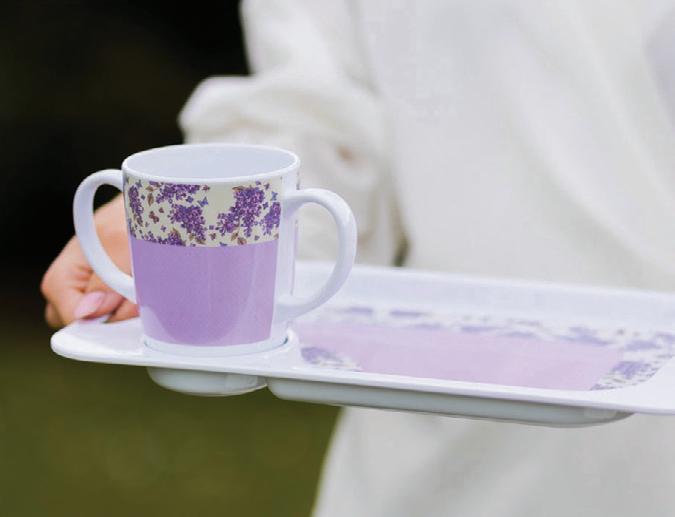
For caregivers, whether professionals or family members, our products are more than tools. They are part of a broader culture of care that values choice, dignity, and self-expression. When a resident or loved one feels more confident and capable using a product that respects their tastes and abilities, the knock-on effects are enormous: greater participation in mealtimes, improved mood, and fewer incidents of frustration or distress.
Our hope is that Rosa Lifestyle products are seen as adaptive homeware rather than clinical aids and become staples in care homes, day centres, and private homes alike - not only because they’re functional, but because they bring a dignified positivity to people’s everyday lives.
In an ever faster moving and busy world, small moments matter. A warm cup of tea enjoyed without fear of spilling. The comfort of a snack on a familiar tray. The joy of choosing a mug that feels personal. These are the moments
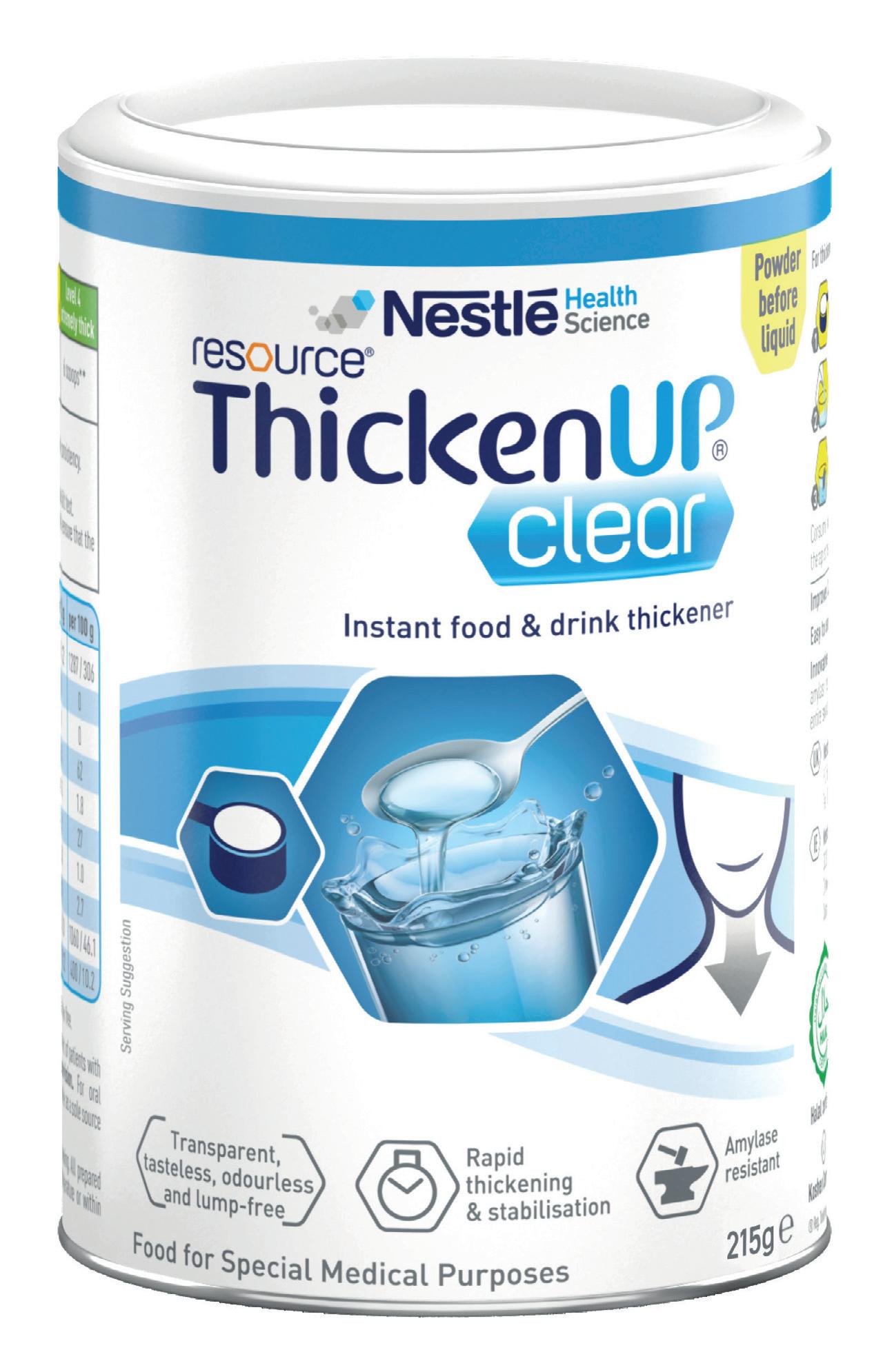
From March 31st, new waste disposal regulations came into effect as part of the Government’s Simpler Recycling initiative.
Designed to reduce waste and increase recycling rates across the country, this has direct and potentially significant implications for the care home and nursing home sector. Anenta, the UK’s leading independent healthcare waste management specialist for the care home sector, explains to issues at hand.
Under the news Simpler Recycling regulations, in addition to segregating clinical waste and offensive waste into separate waste streams, care homes now have a legal duty to separate out all recyclable materials from general waste.

Paper and card, plastic, glass, metal, and food waste all need to be separated and stored in segregated waste collection streams, necessitating larger storage areas, more waste receptacles, and more waste collections.
Although this has implications and associated costs, the new regulations are important because incorrectly disposed waste not only puts a strain on England’s waste capacity – hampering sustainable waste targets – but also significantly adds to the cost of care home waste bills.
FOOD FRUSTRATION
Of all the new waste streams, food waste is likely to be one of the biggest headaches for care homes. That’s because if you produce more than 5kg of food waste per week, you will need to implement a separate food waste disposal system.
Food is a particularly significant form of waste for most care homes as it’s almost impossible to avoid when catering for residents.
In some cases, care homes will have good protocols in place for uneat-
en or waste food, with collections for anaerobic digestion or composting in place. However, for many others this will not be the case, quite simply because it’s always been easier to put waste food into general waste.
And while food waste from canteens or communal eating areas may be relatively easy to collect and recycle, it’s important to remember that a significant amount of other food waste – resulting from items being consumed by both staff and residents in other areas – have the potential to end up in general waste too. Under the new rules that cannot be allowed to happen and that means you now need to make separate food waste bins readily available in public areas.
WHAT IF YOU DON’T COMPLY?
Under the new legislation, if you put food waste into the wrong bins, your supplier will not be permitted to collect them. However, you’ll still be charged, and repeated non-compliance could result in fines or other penalties, which could be as high as £5,000 or more.
To avoid this, you’ll not only need to have sufficient food waste bins in place within your care home, but appropriate training to ensure that all staff are aware of the importance of segregating waste correctly. Here, appropriate signage is also advised to avoid any confusion.
You’ll also need to ensure that food waste collected within your care home – including inedible food parts such as bones, eggshells, fruit and vegetable skins, tea bags and coffee grounds – actually make it into the designated food waste bin for collection.
When you consider that general waste for care homes costs anything between £180 and £250 a tonne, whereas food waste – collected for
Mobile Kitchens Ltd specialises in the hire or sale of temporary catering facilities and foodservice equipment. Ideal for events or to provide temporary catering facilities during your kitchen refurbishment, our versatile units and equipment offer an efficient and economic solution to the caterers’ needs.
Production Kitchens, Preparation Kitchens, Ware-washing Units, Dry Store Units, Cold Rooms and Restaurant Units are available as individual units in their own right or they can be linked together on site to form a complete complex.
Alternatively, we can offer modular, open-plan facilities, usually for larger, longer-term hires.
We offer a free design service, and project management from concept through to delivery and installation on site, plus full technical support throughout the hire period.
The standard specification of our smallest Production Kitchen unit includes a six burner oven range, sala-

anaerobic digestion – costs between £105 to £190 per tonne, it simply doesn’t make sense to continue putting food in your general waste.
Quite apart from avoiding large fines – which could affect your reputation – switching from using the general waste stream for food disposal to anaerobic digestion will save your business anything between 8% and 16%. That’s a saving of £60-£120 per 1,100 litre bin per annum. For care home groups with multiple locations, that’s a saving that soon mounts up.
So, far from being a bad thing financially, the new recycling regulations actually have the potential to bring about long-term cost savings for care homes throughout England. Viewed through that lens switching to segregation makes complete sense.
But it’s not the only benefit. By diverting your food waste from general waste into a separate food waste recycling stream, it can be reprocessed through anaerobic digestion to create organic fertiliser and biogas, helping your business move one step closer to becoming zero-to-landfill and achieving your environmental targets.
This avoids your care home food ending up in landfill where it would release methane, a gas which, according to the UN Environmental Programme, is 80 times more harmful than carbon dioxide
Adopting this process will help to ensure that the correct waste goes into the correct channels, saving your care home money, keeping you compliant, minimising environmental impact, and avoiding inadvertent contamination that could cause issues with your waste collection, leading to extra cost, and stringent action by the authorities.
Far from being feared, the new Simpler Recycling regulations should be embraced, saving your care home money and playing a part in saving the future of the planet.
For guidance and advice on how to meet the Simpler Recycling Workplace Rules, and for information on the best systems to adopt for waste storage and collection, email Anenta at contact@anenta.com or call 033 0122 2143. www.anentawaste.com
mander grill, twin basket fryer, upright fridge, hot cupboard, single bowl sink unit with integral hand wash basin, plus ample power points to plug in Microwaves, Food Processors, Toasters etc. Internal equipment can be interchanged and clients can effectively specify their preferred layout.
We have many tried and tested design layouts and would be pleased to put forward our recommendations for your project.
So if you’re planning a refurbishment or need to cater for an event then why not give us a call and we’ll be happy to provide advice and put forward a competitive proposal.
For further information or to arrange a site visit, email: sales@mk-hire.co.uk or call us on 0345 812 0800, or visit our website: www.mk-hire.co.uk
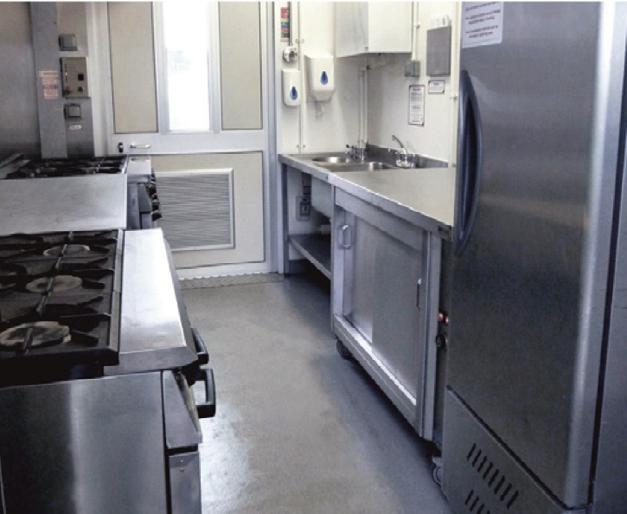
Following the British Dietetic Association’s (BDA) rollout of the Care Home Digest last year, Bidfood, one of the UK’s leading wholesalers, has produced an industry-leading, four-weekly menu cycle, aligned with the Care Home Digest.
Designed to support care operators in implementing the guidelines, the menu cycle offers unrivalled inspiration for Bidfood’s care customers, featuring over 300 Care Home Digest-aligned recipes available for download.
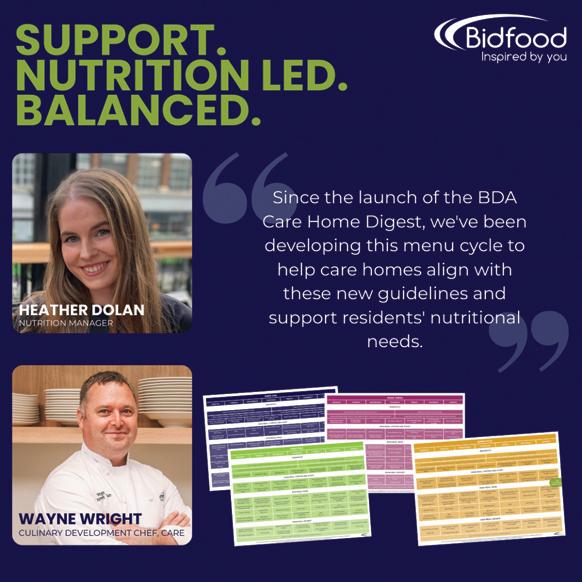
Until last year, healthcare foodservice guidelines were mainly aimed at hospitals, leaving care operators, many of which don’t have access to a dietitian, without tailored resource to support with menu planning.
However, using the new Digest, Bidfood’s expert chef and nutrition team have collaborated to develop this extensive bank of recipes and four-week menu cycle. The cycle demonstrates how operators can align their menus to meet the unique needs and preferences of their individual residents, incorporating food waste tips and a variety of dish types to suit a range of kitchen skill levels.
The menu plan features a balance of food groups including both animal and plant-based proteins, higher-fibre carbohydrates, “healthy” fats and plenty of fruit and vegetables, maximising levels of key nutrients such as protein, fibre and essential vitamins and minerals. The team have also worked hard to reduce sources of saturated fat, free sugars and salt where
possible.
What’s more, every recipe has been nutritionally analysed and adjusted, tweaking both the ingredients used and the quantities, to ensure that nutrition is prioritised whilst also balancing taste, cost and other factors.
Nutrition Manager, Heather Dolan said “At Bidfood we pride ourselves on an evidence-based approach to nutrition, so we were delighted when the BDA’s Care Home Digest was released. We’ve been working on this menu ever since, with the aim of helping care homes to implement the Digest, and ultimately, supporting them in meeting residents’ nutrition and hydration needs.
“It’s been a pleasure collaborating with our healthcare chefs on this project. They’ve brought a wealth of culinary expertise and creative flair to the project. Together, I believe we’ve struck the perfect balance of classic dishes and fresh, innovative concepts.”
To view the four week menu cycle, please visit https://view.bidfood.co.uk/bidfoods-four-weeklymenu-cycle/?page=1
The British Dietetic Association’s Care Home Digest was created to support care homes in developing varied and balanced menus that will tempt residents to eat and drink well, whilst being designed as a toolkit that makes it easy for care operators to dip in and out of chapters as needed. For more information on the Care Home Digest, visit www.bidfood.co.uk/blog/what-you-need-to-knowabout-the-new-bda-care-home-digest/
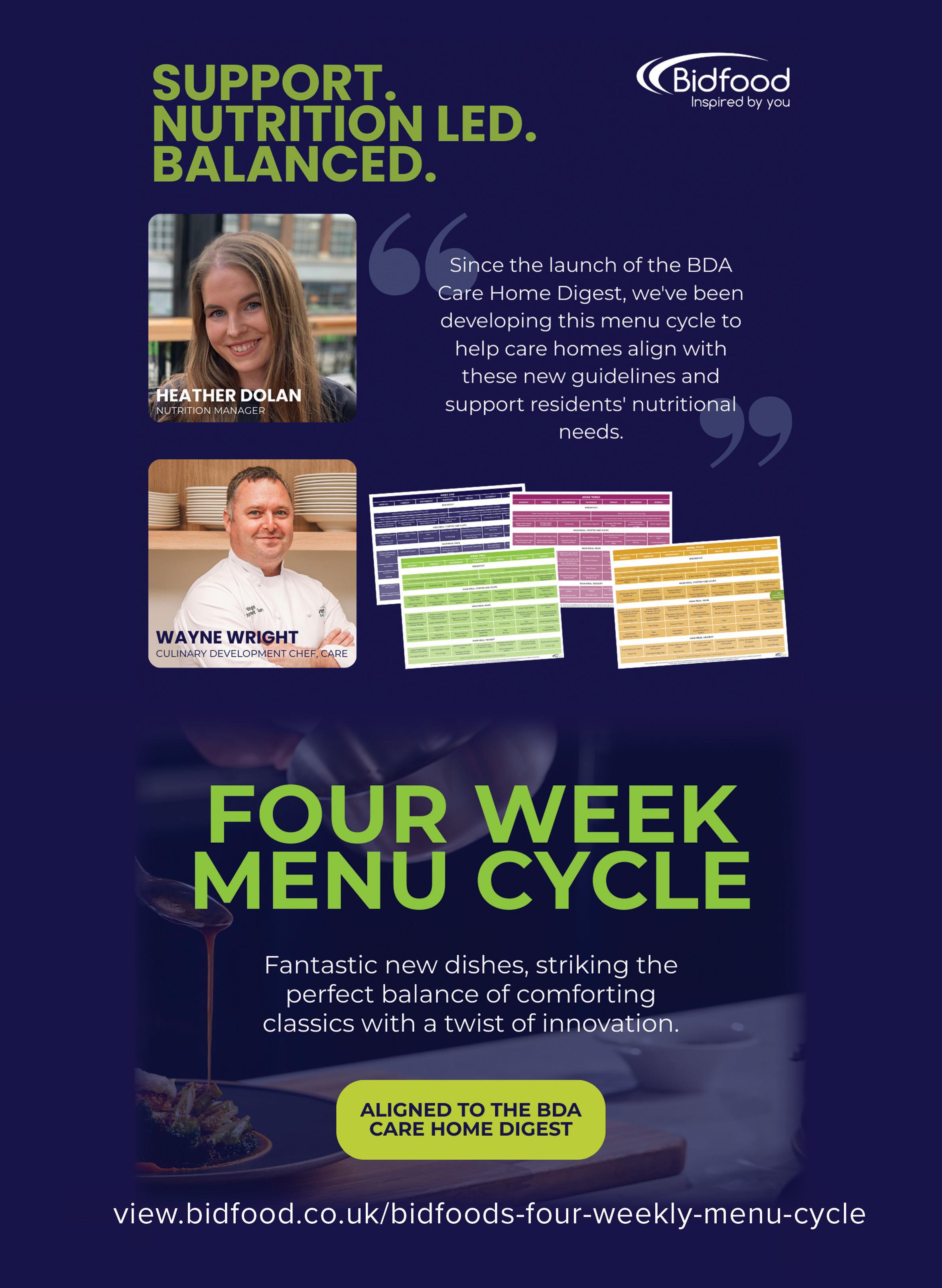
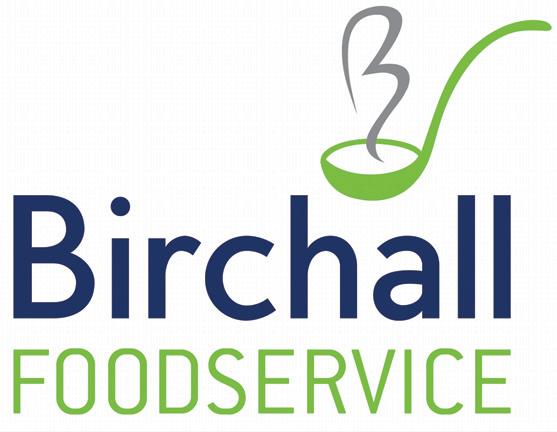
Burnley-based wholesaler and founder Country Range member, Birchall Foodservice, has launched its first-ever Care Home Activity Pack — a 62-page guide designed to support activity coordinators and caterers working within the healthcare sectors.
Recognising the challenges that care home teams face in delivering engaging, enjoyable, and meaningful activities for residents, the pack offers a comprehensive range of creative ideas built around food. Its aim is simple: to spark joy and connection through shared experiences that centre on mealtimes, cultural celebrations, and interactive activities.
At the heart of the pack is a month-by-month events calendar, highlighting key seasonal dates such as Valentine’s Day, Easter, and Remembrance Sunday — each paired with activity suggestions, food ideas, games, and even suggested decorations. These are supported by easy-to-follow recipes and product recommendations.
Popular food-themed games include Biscuit Jenga, Build Your Own Pizza nights, and Food Bingo, which are designed to encourage motor skills, social interaction, and laughter. There's also a "World on a Plate" section, offering immersive cultural experiences for countries including Italy, Mexico, Spain, France, China, and the UK — complete with themed menus, music ideas, and crafts.
To help tackle hydration in fun and engaging ways, the pack features ideas such as mocktail parties, milkshake decorating, and “Guess the Drink” challenges — all designed to improve fluid intake without it feeling like a chore.
Joe Moulton, Marketing Manager at Birchall Foodservice, said: "This pack combines food and fun to help care homes deliver meaningful activities that residents will genuinely enjoy. It’s all about sparking joy through shared experiences, whether that’s a themed afternoon tea or a game of Food Bingo."
The pack has been developed with support from trusted foodservice brands including Albany, Soreen, McVitie’s, Kellogg’s, Lakeland Dairies, and Nestlé. It offers a mix of inspiration and practicality, helping care teams save valuable planning time while delivering enriching experiences. Available now to all Birchall Foodservice customers and care homes across the UK, the pack is free to download.
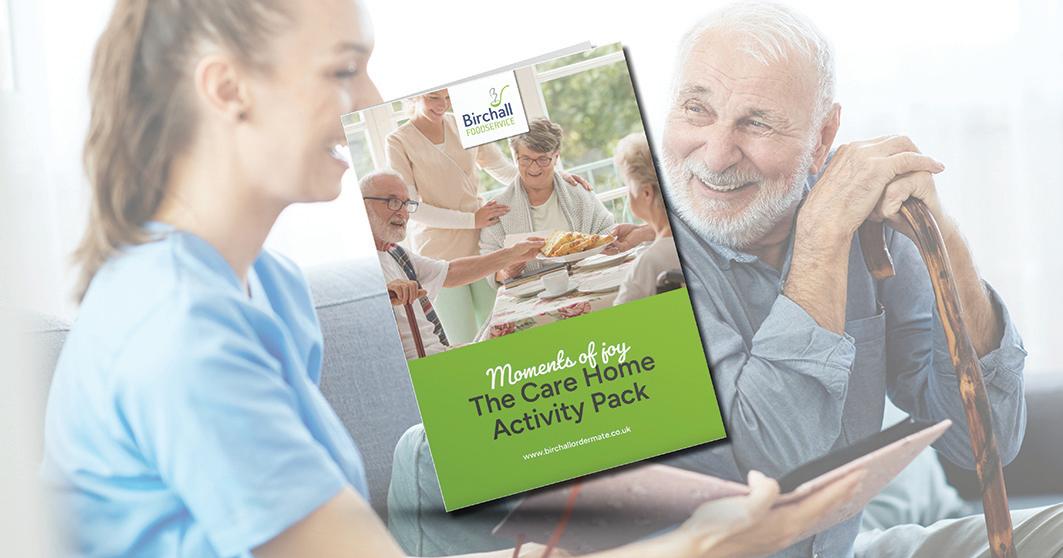
To access the Care Home Activity Pack, visit: www.birchallfoodservice.co.uk/resources or get in touch with the Birchall team by calling 01282 429446.
Jelly Drops (backed by the Alzheimer's Society through their Innovation Accelerator programme) have announced a new 288 pot ‘bulk’ pack for the care sector allowing care homes and in-home agencies to buy in bulk at a reduced rate, ahead of the anticipated warmer summer weather. These award-winning water sweets with added electrolytes boost hydration for people living with dementia and others that struggle to adequately hydrate. By eating two to three pots of Jelly Drops throughout the day, residents with hydration challenges can easily top up their fluid intake in a dignified and independent way.
Dehydration is a common challenge for people living with dementia and aspects like memory problems, potential lack of dexterity and/or avoiding drinks due to fear of incontinence or confusion about where
the toilet is, can all make individuals more susceptible to the dangers of dehydration. Conversely, being well hydrated supports brain function, reduces the risk of urinary tract infections (UTI’s) and unnecessary hospital visits. Even mild dehydration can significantly impact an individual’s wellbeing when they are already dealing with cognitive challenges like dementia.
Jelly Drops have supported over 100,000 families since being developed by Lewis Hornby for his late Grandma Pat who struggled with staying hydrated whilst living with dementia.
If you are interested in learning more about the 288 pot ‘bulk’ case of Jelly Drops to support hydration for your residents or clients,, please contact hello@jellydrops.com or visit www.jellydrops.com

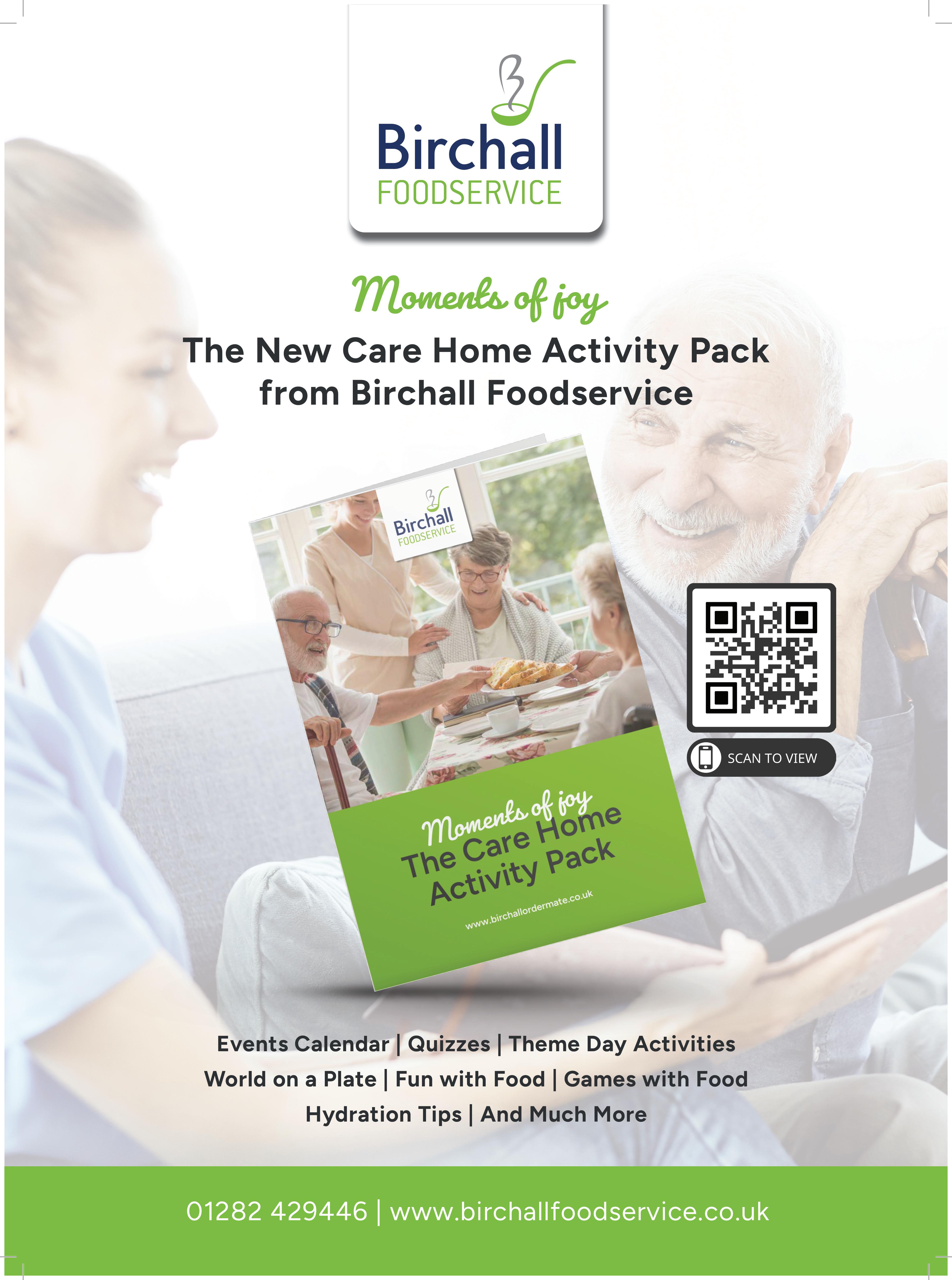
The Treat-Eezi full length pressure relieving mattress overlay (very high risk to stage 4 pressure ulcers) is designed to be laid on top of mattresses. It naturally and gently moves with the patient creating an almost zero chafing area allowing the patient a silent, comfortable sleep along with the assurance any pressure sores present are given the best possible chance to breathe and heal.
Quotations available via checkout.
£241.40p (Exclusive of VAT)
PRODUCT BENEFITS

• Precision Relief: Using advanced 3D pressure sensor mapping, our pressure-relieving mattress overlays provide targeted relief by accurately identifying pressure points, ensuring optimal support for patients.
• Pressure Relief: Our unique 4-layer pressure-relieving mattress overlays offer unique pressure sore prevention, trusted by over 10,000 medical professionals since 2016.
• Sleep Benefits: No noisy pump systems; our static solution guarantees a peaceful sleep environment, free from disruptions or maintenance hassles and allows the patient to sleep with their partner.
• Breathability: Enhanced breathability ensures optimal airflow for keeping patients comfortable and cool.
• Endorsements and Warranty: Backed by endorsements from NHS community services and a full two-year warranty.
• Easy Application: Our pressure-relieving mattress overlays have easy-to-follow instructions.
WHO IS IT FOR
The Treat-Eezi full-length pressure relieving mattress overlay is ideal for individuals who spend prolonged periods in bed or seated, including:
• Elderly individuals with limited mobility
• Patients recovering from surgery or injury
• Those at risk of developing pressure sores
• Caregivers looking to enhance comfort for their loved
ones
Sales/General Inquiries: 0208 133 2851 www.danmedicasouth.co.uk
See the advert on page 11 for more information.
At Novamed, we understand the daily challenges that incontinence brings.
With that in mind, our specialist team, which includes a retired NHS continence nurse, have developed a premium product range designed to give users comfort, protection, and dignity, as well as being manufactured to ISO 13485 quality standards. Our comprehensive incontinence care solutions include: All-in-one (slips) for moderate to heavy use Pull-up pants for light to moderate needs Disposable underpads to protect beds and furniture

• Biodegradable bamboo pads for light protection with an eco-conscious approach Each product provides skin-friendliness, odour
control, and ease of use. With consistent quality and comfort, Novamed are trusted by care professionals across the UK. Our Devon-based warehouse ensures fast, discreet delivery throughout the country. We offer free samples to help you assess the best fit. Novamed products are also trusted internationally, with distribution in Gibraltar, Montenegro, the Middle East, and Europe. For continence care you can depend on, contact Novamed today to learn more or request your free samples 0808 196 2070 www.novamedpads.co.uk info@novamedeurope.com
See the advert on page 4 for details.
CareZips® Classic are patented, easy dressing unisex adaptive pants designed for older and disabled people suffering with problems associated with continence, mobility, mental function and cognition. Suitable for persons living in care institutions, receiving care at home or living independently at home, CareZips® Classic enable people to dress themselves or with assistance from carers.
CareZips® Classic feature patented 3-zipper system, which opens the front of the pants from the waist to the knees for quicker access during toileting, continence pads changes and personal hygiene.

The forward positioning of the two side zippers lessens pressure on sensitive hip areas, helping to eliminate discomfort. The third zipper facilitates simple full frontal opening for faster more dignified diaper changes, catheter adjustments, personal cleansing and hygiene routines.
CareZips® Classic have many benefits for the older and disabled users and their carers:
• People dressing themselves enjoy the practical
Based in Derbyshire, we’re a family-run business with over 30 years of experience committed to helping care homes create safe, welcoming outdoor spaces for residents, staff and visitors.
We offer a wide range of garden furniture, including benches, companion seats, dining sets, picnic tables and planters, all crafted to be strong, durable and splinter-free. Unlike traditional timber, our furniture won’t rot, warp, or require painting, making it a low-maintenance, long-term solution for care environments.
Our products support the circular economy by transforming waste plastic into something both functional and stylish. Each piece is made here in the UK and built to withstand all weathers, year after year. In recognition of our sustainable practices, we’ve been awarded the King’s Award for Enterprise in Sustainable Development. Here’s what Darley Hall Care Home had to say
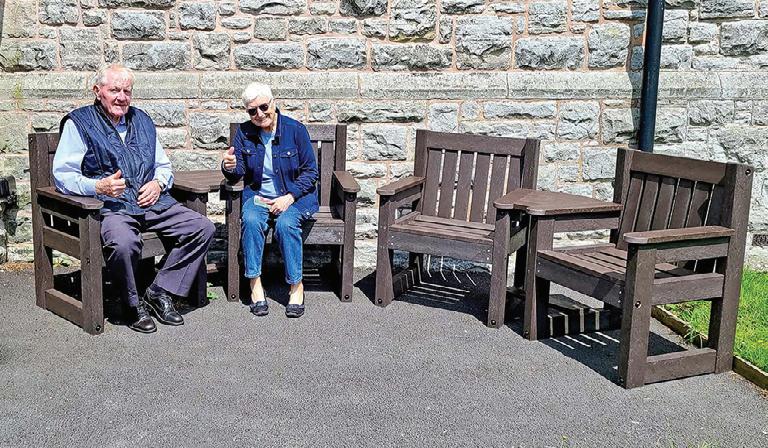
Watch your resident's eyes light up when the trolley arrives! Euroservice trolleys can also be used as a vending trolley or to sell personal care products to residents. How about a delicious snack/pastry trolley or even a drinks trolley for that afternoon tipple? Your lovely trolley could do so much for you and your residents! Visit the website at www.euroservice-uk.com to see the full range.
Or see the advert on page 13.

Angloplas are a UK manufacturer who specialise in producing dispensers for the health and hygiene industry. Although these are designed to keep the workplace tidy and uncluttered they are, more importantly, built knowing the control of healthcare-associated infections (HCAIs) are a priority for healthcare providers, and who are employing a combination of infection prevention and control strategies, including hand hygiene, cleaning, training and the adoption of new technologies, to tackle the problem.

As a result, a wide range of infection control products and technologies are emerging on the market, including antimicrobial technology. Angloplas’ range of dispensers are produced in the world’s first
proven Antimicrobial PVC with silver ion technology and which is exclusive to Angloplas. This helps reduce the risk of cross infection by stopping the growth of bacteria and mould and works continuously for the lifetime of the product, reducing levels of bacteria such as MRSA, E Coli, Legionella, Salmonella and mould by up to 99.99%.
For non-clinical environments Angloplas has recently launched its new Budget Range of products which are made to the same exacting standards as the antimicrobial protected ones but with lower price tags.
You can order Angloplas products directly from its website at www.angloplas.co.uk
See the advert on page 9.
functionality and versatility of the CareZips® Classic, all day comfort and easy garment care.
• People dependent on assisted dressing appreciate quick easy dressing process with less stress, embarrassment and greater dignity offered by CareZips® Classic.
• CareZips® Classic offer practical gains to the carers, helping them to provide better care, whilst reducing physical efforts and saving valuable time.
CareZips® Classic are unisex, available in 6 sizes and 3 practical colours (i.e. black, charcoal and navy). Tapered fit at the ankles gives a tidy appearance. Made from breathable moisture-wicking 4-way stretchy crease-free and easycare durable fabric, CareZips® Classic are comfortable, practical and conveniently functional. For more information, contact Win Health Medical Ltd - 01835 864866www.win-health.com
See the advert on page 3 for further information on Win Health’s product range.
Since our founding in 2010, Activities to Share has been dedicated to enhancing the lives of those in care by providing thoughtfully designed activity products. Our mission is to support activity coordinators in delivering uplifting, engaging experiences that foster connection, joy, and well-being.
We achieve this by listening closely to your feedback and evolving with your needs. Whether over the phone, via email, WhatsApp, or Live Chat on our website, our team is always ready to offer advice and help you find just the right products to bring your ideas to life.

While we embrace the convenience of technology to expand our resources and share knowledge, we remain firm believers in the irreplaceable power of sensory engagement. That’s why we continue to
make our Reminiscence Kits and Sensory Bags with real, tactile items that stimulate the senses. Some experiences— like popping bubbles for the splash, breathing in a familiar scent, or piecing together a puzzle with others—simply can’t be replicated on a screen. These sensory moments are invaluable in encouraging storytelling, sparking memories, and fostering conversation. Our values remain rooted in this commitment to meaningful connection. We’re here to partner with you—the professionals on the front lines of care—to create a sense of structure, well-being, and fun for those who need it most.
for your activity diary

In the evolving landscape of residential and nursing home care, technology now plays an increasingly pivotal role in enhancing said patient safety, staff responsiveness, and overall operational efficiency.
One of the most critical technologies at the heart of this transformation is the nurse call monitoring system. These systems serve as the backbone of communication between residents and care staff, and their importance cannot be overstated in delivering timely and effective care.

UNDERSTANDING NURSE CALL MONITORING SYSTEMS
A nurse call system enables residents to quickly and easily summon assistance. However, modern systems have evolved far beyond simple buzzers. Today, care facilities can choose from wireless, integrated, and modular systems—each designed to meet different operational needs, with modern solutions now connecting with fall detection sensors, electronic patient records (EPR), and mobile caregiver apps. This integration not only streamlines workflows but also helps care homes meet Care Quality Commission (CQC) compliance requirements while delivering faster, more personalised care.
Wireless Systems are ideal for facilities seeking flexibility and ease of installation. Without the need for extensive cabling, these systems can be deployed rapidly and expanded as needed.
Integrated Systems tie into a facility’s broader infrastructure—such as fire alarms, CCTV, and building management systems—allowing for a holistic response to emergencies and enhanced safety protocols.
Modular Systems provide a customisable solution, enabling care homes to scale up or down based on the size of the facility or changing care requirements.
The implementation of an advanced nurse call monitoring system delivers measurable benefits across multiple areas:
• Improved Staff Efficiency: With real-time alerts and data analytics, care teams can streamline workflows and focus attention where it’s most needed, reducing unnecessary checks and overlaps.
• Enhanced Patient Safety: Immediate access to assistance reduces the risk of falls, unattended health episodes, and delayed medication administration.
• Greater Resident Satisfaction: Prompt responses foster a sense of security and dignity among residents, improving their overall experience.
Operational Cost Savings: Efficient use of staff resources and reduced emergency incidents contribute to long-term financial sustainability for care providers.
As regulatory expectations and resident needs continue to rise, nurse call monitoring systems are no longer a luxury but a necessity. They not only support compliance with Care Quality Commission (CQC) standards but also set the tone for a culture of responsive, resident-centred care.
Implementing a nurse call system offers numerous benefits, including improved communication, enhanced safety, increased staff efficiency, better resource allocation, and improved documentation. These advantages contribute to a higher quality of care, improved patient/resident satisfaction, and a more efficient and effective healthcare environment
Investing in the right system requires careful evaluation of a care home’s size, staffing levels, and longterm care strategy. However, the return on investment—in terms of safety, efficiency, and satisfaction—makes it one of the most impactful upgrades a care home can undertake.
In today’s care environment, technology must work in harmony with human compassion.
Nurse call monitoring systems exemplify this synergy, serving as a quiet but powerful ally in the mission to deliver safe, dignified, and effective care.
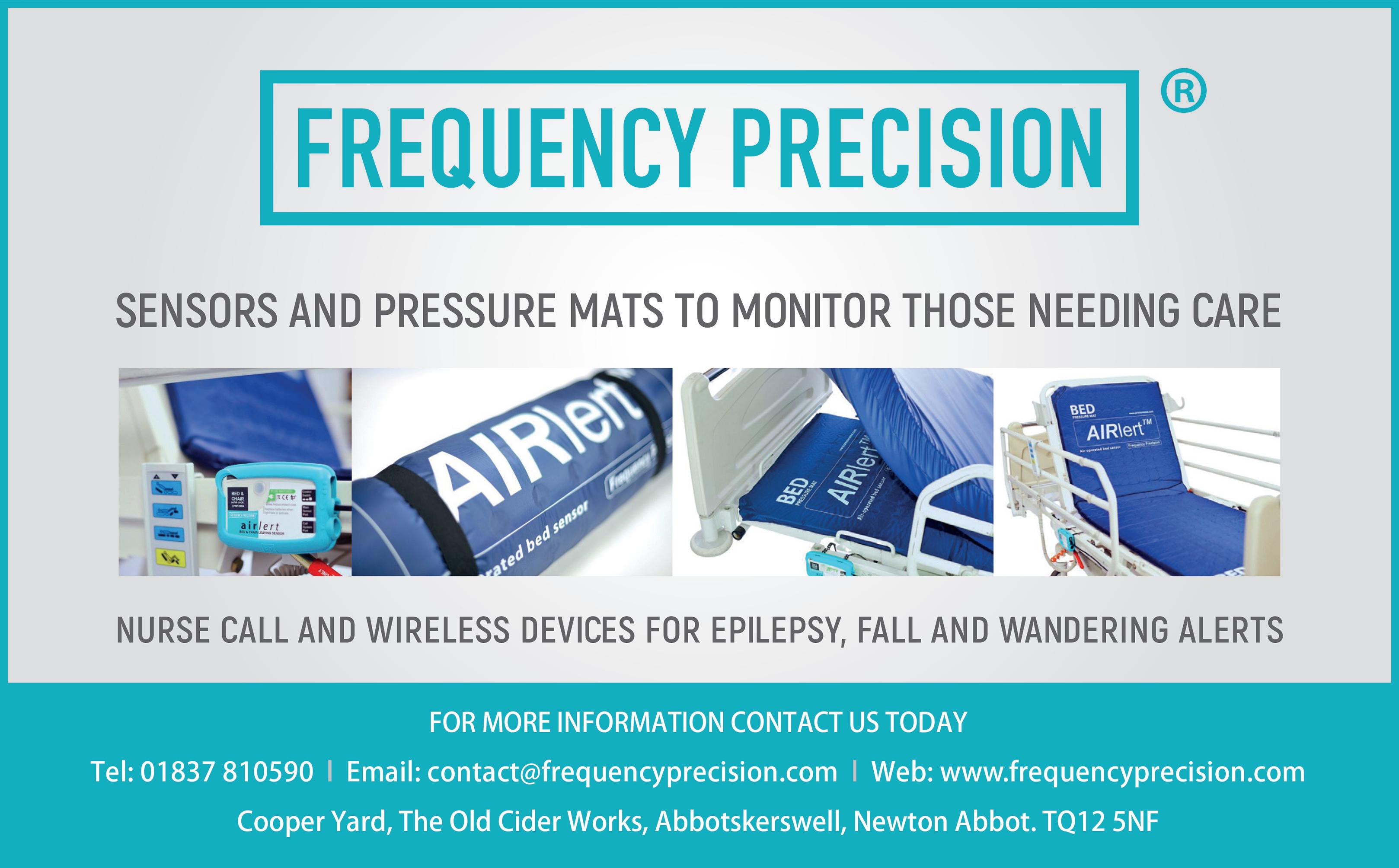
Technology has made people more connected with the world around them and the revolution in assistive care devices has made it possible for the elderly to spend their last years in a comfortable and familiar environment. These devices have also made it easier for home carers to provide quality care for their loved ones while managing their own lives. They allow you to care for your elderly whether they are travelling in the city for errands, staying alone at home, or staying in the same home as you. They are also helping nursing homes provide better care for them with discrete monitoring and quick responses to emergencies.
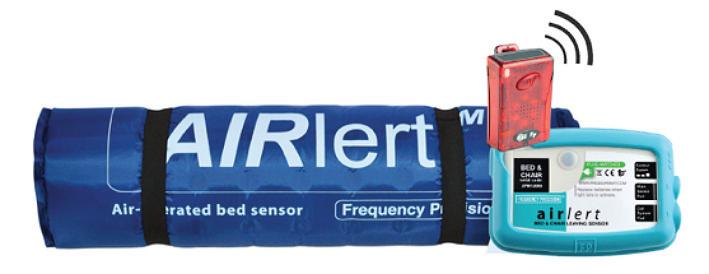
If you’re looking for these kinds of assistive care devices for your loved ones or nursing home, Frequency Precision produce some of the best systems available to help you with elderly care and mobility monitoring, ranging from bed, chair and floor sensor mats through fall monitoring and GPS tracking to fully integrated nurse call plug or wireless systems.
Phone: 01837 810590
Email: contact@frequencyprecision.com
Website: www.frequencyprecision.com
Blaucomm’s Nurse Call Messaging Service (NMS) is the market leading solution to remove the dependency on noisy nurse call panels and pagers, through its intelligent software, which delivers the alerts straight to the care staff who need them.
Care homes are rapidly introducing smartphones for digital care planning and eMar - now, the same devices can be used to receive the nurse call alerts they need for the residents under their care.
Furthermore, Blaucomm NMS is deeply linked into Person Centred Software MCM, so call bell data is linked straight to care plans. This unlocks a huge benefit to care homes to enhance the staff performance with how they accept and respond to residents, which ultimate-
ly promotes better response times and visibility for management to audit their performance.
The best part is that Blaucomm NMS links into your existing nurse call system - we work with all major brands such as Aidcall, ARM, Courtney Thorne, C-TEC, ENS, Intercall, Medicare, SAS and TeleAlarm.
Care operators are constantly recognising Blaucomm NMS for its reliability and dependability to their care operations, which is why we’ve been chosen time and time again over other solutions.
Head of IT Trudi Harrow at WCS Care had this to say about Blaucomm NMS:
“We find Blaucomm is a genuinely fantastic company with a reliable product.
"We would highly recommend this to anybody who wants to replace expensive pagers and silence those annoyingly loud nurse call screens!” To find out more about Blaucomm NMS, visit www.blaucomm.co.uk/healthcare

Fall Savers®, are an experienced market leading healthcare provider of resident safety solutions for over 15 years.
FALL SAVERS ® WIRELESS MONITOR
Eliminate all cables with our new generation falls management solutions!
Upgrade your falls programme with the latest technology from Fall Savers®. The NEW Fall Savers® Wireless eliminates the cord between the monitor and sensor pad. This results in less work for nursing staff, improved safety for patients and reduced wear and tear on sensor pads. Wireless advantages include the ability to use one monitor with two sensor pads simultaneously and support for many new wireless devices. BENEFITS INCLUDE:
Safer for patients; less work for staff

Bed and chair pads available
One monitor works with two sensor pads
Integrates with most nurse call systems
A variety of options, including: Call button
sensor mat Wireless door/window exit alerts TREADNOUGHT ®FLOOR SENSOR PAD
The TreadNought® Floor Sensor Pad is built to last with a durable construction that far out lasts the competition. Our anti-bacterial floor sensor pad is compatible with most nurse call systems or can be used with a portable pager to sound an alert when a person steps on to the sensor pad. Caregivers typically place the sensor
pad at the bedside, in a doorway or other locations to monitor persons at risk for falls or wandering. An optional anti-slip mesh reduces the potential for slippage on hard surface floors.
FEATURES INCLUDE:
Connects directly to most nurse call systems
High Quality anti-bacterial Floor Sensor Pad
Large Size Pad: Measures (L) 91cm x (H) 61cm
Options (sold separately): Anti-slip mesh for hard surface floors

See the advert on this page for further details or visit www.fallsavers.co.uk.

Falls are a significant concern for vulnerable individuals, especially seniors and patients at risk. Medpage, a leader in assistive technology, offers a range of cuttingedge products designed to enhance safety and provide peace of mind for caregivers and families. Here’s an in-depth look at some of their standout solutions:
MPRCG1 (2023) BED LEAVING DETECTION ALARM WITH CAREGIVER RADIO PAGER
The MPRCG1 is a comprehensive system tailored for fall prevention in domestic, commercial, and NHS care settings. This all-inclusive kit includes a bed pressure mat sensor, a BTX21-MP alarm sensor transmitter, and an MP-PAG31 radio pager. The system is designed to alert caregivers when a patient leaves their bed, reducing the risk of falls. Key features include:
Wireless Alerts: Notifications are sent to the caregiver’s pager via tone or vibration.
Customizable Alarm Delays: Options for instant, 15-minute, or 30-minute delays.
Durable Design: Antimicrobial and disinfectant-resistant materials ensure longevity.
• Ease of Use: Minimal installation required, making it user-friendly and portable.
HDKMB2 HOSPITAL DISCHARGE KIT FOR FALLS RISK PATIENTS
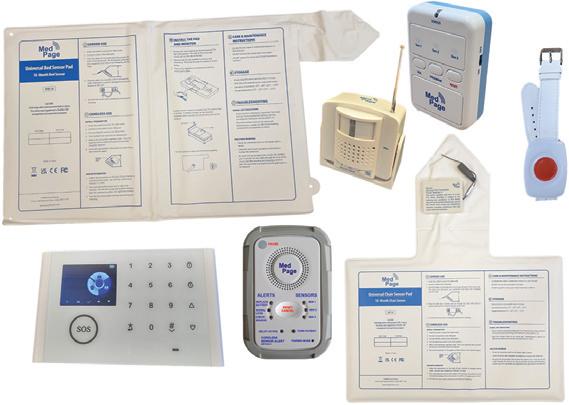
monitoring capabilities of healthcare facilities. Its versatility makes it a valuable addition to any care environment, ensuring timely responses to patient needs.
RON-WC2 WATERPROOF DISABLED PULL CORD ALARM TRANSMITTER WITH WIRELESS ALARM RECEIVER
The RON-WC2 is a robust solution for disabled individuals requiring immediate assistance. This waterproof pull cord alarm is ideal for use in bathrooms and other high-risk areas. Paired with a wireless alarm receiver, it ensures that help is just a pull away.
Features include:
Waterproof Design: Suitable for wet environments.
Wireless Connectivity: Reliable transmission to the alarm receiver.
Ease of Installation: Simple setup for quick deployment.
WHY CHOOSE MEDPAGE?
Medpage’s commitment to innovation and quality is evident in their product range. Each solution is designed with the user’s safety and convenience in mind, making them a trusted choice for caregivers and healthcare providers alike.
The HDKMB2 is a thoughtfully curated kit aimed at supporting patients transitioning from hospital to home care. It includes essential tools to mitigate fall risks and promote recovery. This kit is ideal for caregivers seeking a comprehensive solution to enhance patient safety during the critical post-discharge period.
CMEX-21 MULTI-PORT WIRELESS SENSOR INPUT EXPANDER FOR NURSE CALL CONNECTION
The CMEX-21 is Medpage’s latest innovation, designed to integrate seamlessly with existing nurse call systems. This multi-port expander allows for the connection of multiple wireless sensors, enhancing the
By investing in these advanced fall prevention tools, families and facilities can create safer environments for those at risk. Medpage continues to lead the way in providing practical, reliable solutions that make a real difference.
For more information, visit Medpage’s official website or contact their team to explore these products further. Safety starts with the right tools, and Medpage delivers just that. www.easylinkuk.co.uk
T: 01536 264 869
Courtney Thorne, a long-standing innovator in healthcare communication systems, is setting new standards in the care home sector with its advanced wireless nurse call technology—designed to improve resident safety, enhance staff efficiency, and support a more responsive care environment.
With over 30 years of experience serving the UK healthcare market, Courtney Thorne’s systems are now trusted by thousands of care homes nationwide. Unlike traditional hardwired solutions, their wireless nurse call systems offer non-invasive installation, scalability, and smart analytics—making them ideal for both new builds and retrofit projects.
“At the heart of our technology is the belief that better communication leads to better care,” says Graham Vickrage, Managing Director at Courtney Thorne. “Our wireless systems not only reduce response times but also empower staff
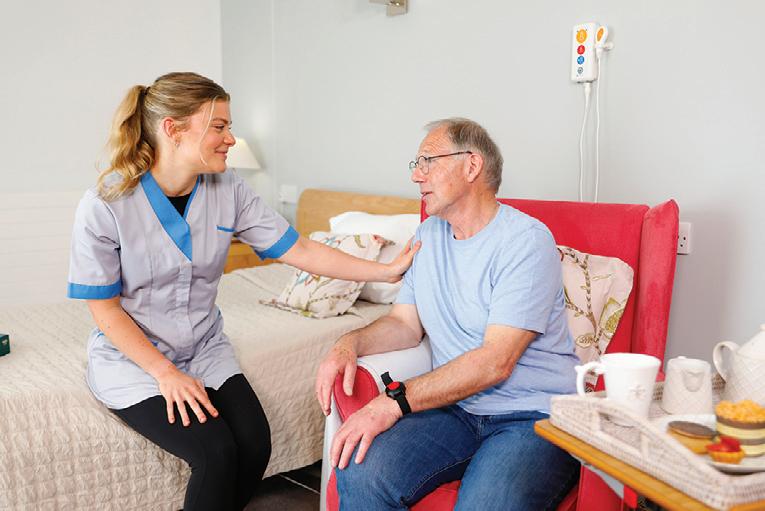
with the tools they need to deliver safe, person-centred care.”
Care providers are increasingly choosing wireless systems for their flexibility, reliability, and cost-effectiveness. With a full suite of accessories—including neck pendants, door monitors, fall detection, and bed sensors—Courtney Thorne systems can be tailored to meet the specific needs of each home and resident.
In an industry where compliance, safety, and staff pressures are always front of mind, Courtney Thorne provides more than just products—they offer ongoing support, training, and a commitment to innovation that helps care homes futureproof their operations.
For more information or to book a free demo, visit www.c-t.co.uk or contact info@c-t.co.uk.
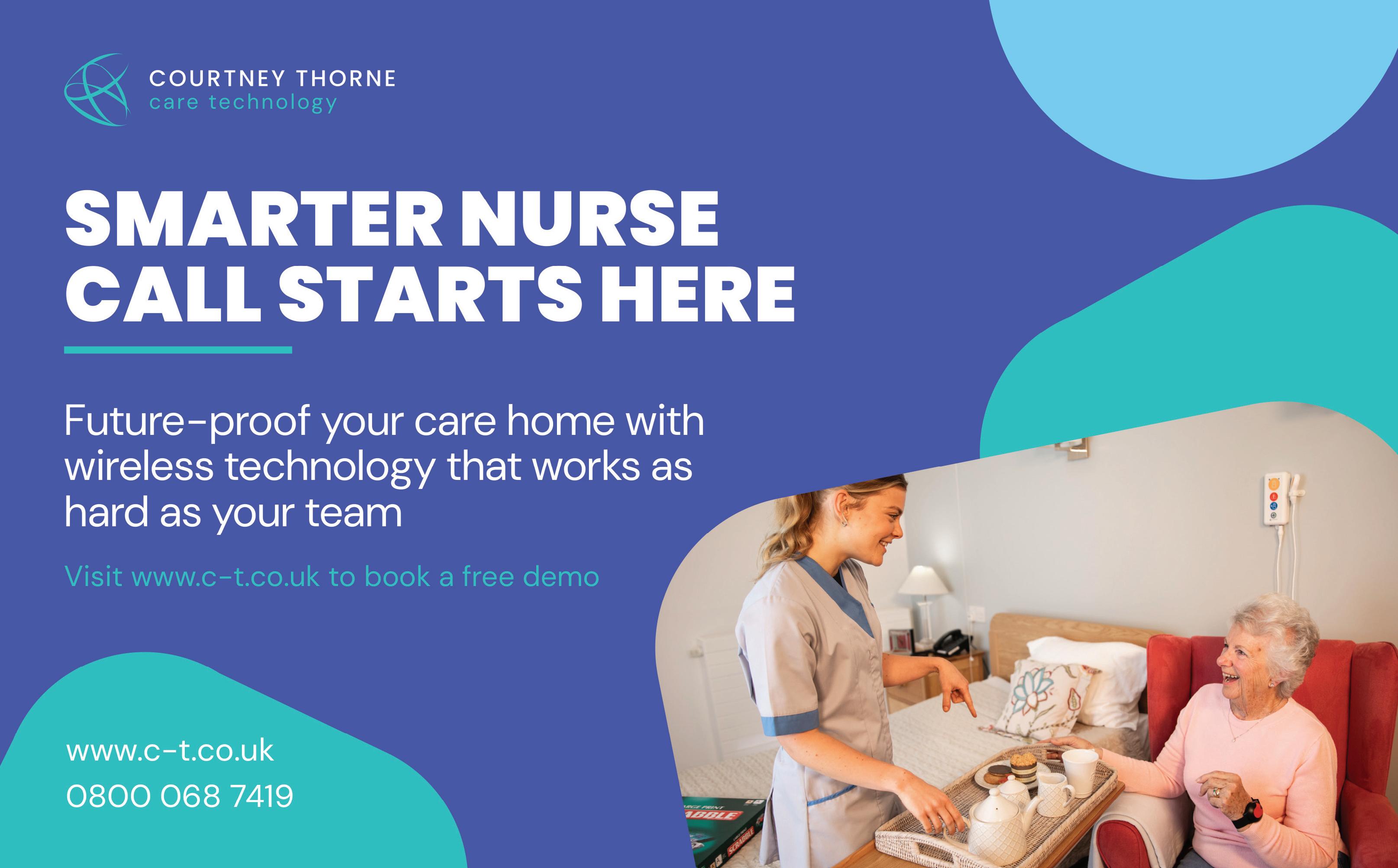
Adult social care is changing fast. Across England, providers are swapping paper and patched-together systems for complete digital records, in step with the government’s Digitising Social Care programme.
Primera Healthcare, which supports people at home in Birmingham and London, has moved early and decisively.
The team started 2025 by upgrading their older care system to Allin-one PASS, adding digital care planning, rostering and finance tools so that every part of the service now sits under a single platform.
The switch felt less like a software update and more like turning on the lights. Travel times, staff skills and visit continuity now feed automatically into the rota, so late or missed calls are spotted and fixed before they become problems.

Medication notes flow straight into electronic MAR charts, and live GPS data shows managers exactly where carers are, cutting the need for frantic phone calls on busy shifts.
Most striking of all is GP Connect. With one tap, authorised staff can see up-to-date diagnoses and prescriptions, saving time and keeping visits focused on the person rather than the paperwork.
“The transition was seamless,” says Shaelene Dewar, Quality Assurance Auditor. “The journal view gives us a live window on the whole business, and the Data Creation Team at PASS built our new forms in record time. GP Connect is brilliant. Reliable information in seconds, and the new charts help us spot patterns we never saw before.”
3. ENHANCED MONITORING
many care settings, the impact it can have is huge.
Here’s a closer look at why AI is set to make waves in social care:
1. BOOSTING EFFICIENCY
AI can help handle those resource-draining tasks in seconds. Whether it’s crunching a mountain of data, summarising care notes, or suggesting next steps, it frees up your team to do what they do best.
It can also improve communication, such as helping new team members quickly access policies or answer routine questions without waiting for assistance. By handling these background tasks, AI allows organisations to redirect resources to other core priorities.
2. ENSURING PERSON-CENTRED CARE
AI can support your teams when providing persona-centred care by analysing data over time, so they can build tailored plans that align with each individual’s goals, preferences, and abilities. It can even predict future needs, flagging issues before they arise so your team can act proactively.
Care organisations often operate round-the-clock, and AI can offer real-time monitoring to support this. For example, AI can highlight subtle behavioural changes, like someone sleeping poorly or becoming more withdrawn. These insights can alert your teams to potential concerns early, which means better, faster decisions can be made to support your clients.
For organisations, this level of tracking ensures care quality stays high, without adding to the workload. It’s like having an extra layer of support that’s always on duty.
4. EMPOWERING TEAMS
AI is here to help empower your care teams, not replace them. AI tools can provide instant recommendations or resources, which could help your newer employees confidently manage unexpected situations. Similarly, AI can assist with summarising care notes or giving quick access to up-to-date best practices, helping your teams provide the high-quality care they work so hard to deliver.
5. OPTIMISING COSTS
One of the big wins of AI is its ability to do more with less. By automating tasks and making resource allocation more efficient, it
Those changes have delivered quick, concrete gains. Oversight is tighter, risk is lower, and staff spend more minutes each day with the people they support.
Everything is logged, time-stamped and ready for inspection, which reassures families and pleases regulators.
As everyLIFE Technologies marks ten years of PASS, Primera’s experience shows what the next decade can look like when digital tools are placed at the heart of care.
Good care can always get better, and better starts with digital.
Ready to explore your own next step? Visit www.everylifetechnologies.com or call the everyLIFE team to see how PASS can help your service.
can help organisations manage tight budgets without compromising on care.
AI can even help reduce staff turnover by easing workload pressures, which means savings on recruitment and training costs too. Plus, because AI solutions are scalable, it can adapt to your organisation's needs.

AI in social care isn’t about replacing people with tech. It’s about giving your teams the time, insights, and tools they need to focus on the people they care for. That’s why OneAdvanced AI, the first UK hosted fully secure, private AI tool for businesses, was created. OneAdvanced AI can help care providers improve efficiency, deliver person-centred care, and empower teams, all while safeguarding your data. This marks a significant step towards a more innovative and sustainable future in social care.
Find out more at: www.oneadvanced.com/ai
See the advert on the back cover of this issue for further info.




People with dementia can enjoy productive and rewarding working lives in the digital era, contrary to the widespread stereotype that dementia is incompatible with the use of modern technology, according to new research from the University of Bath.
The study - Working lives with dementia: A digital futures perspective – argues that the digital revolution risks exacerbating inequalities amongst those with diverse needs but that organisations can and should develop, adapt and deploy digital technology and the working environment to help those with dementia to continue in employment.
“The bottom line is that we have an ageing population and workforce in which dementia will feature and which should, and can be, accommodated by the judicious use of digital technology and adapting working conditions. The reality is, this is not dealt with in any meaningful way right now – there are very rarely strategies in place,” said Dr James Fletcher of the University of Bath School of Management.
“There is widespread prejudice that those with dementia cannot cope with, or benefit from, digital technology, and they often get bundled into the same category as the oldest people. But it’s worth putting some perspective on this – an experienced 60-year-old employee with early stage dementia will have grown up through the digital, internet and social media revolutions – and with the right support, they will still have much to offer,” Dr Fletcher said.
The study was published as the UK government announced its welfare reform plans, part of which is to encourage more disabled people into work. Dr Fletcher said he hoped the research could be a useful example of the prospects and challenges of fulfilling that goal.
Dr Fletcher noted that quite simple adjustments to the working environment, such as improving workstation lighting, using appropriate fonts and colour schemes, and providing workers with calendars, voice activated controls, and automatic reminders could make a big difference for somebody diagnosed with dementia.
“And AI offers really interesting opportunities – it is superb at solving many of the problems faced by those with dementia, such as finding words, organising text and putting words in the right sequence. Couple that with the potential offered by hybrid working for those with dementia, and you can see the benefits for both employees and companies,” he said.
Dr Fletcher and his co-researcher Dr Olivia Brown argue that dementia is not inherently disabling and that its impact depends heavily on the environment and surroundings in which an employee is operating. Employers might consider, for example, that an employee with dementia may be able to access a building with a swipe card but may be foiled if access relies on codes that they have to remember.
“We need to approach this in the way we already respond to people with diverse needs, which is already familiar to most employees. Also, there is a misplaced tendency to see a dementia diagnosis in black and white terms when the reality is, the effects can vary day-to-day and hour-to-hour depending on environment and relationships,” Dr Brown said.
Dr Fletcher said that employees could suffer tremendous stress from a dementia diagnosis and disclosing this to their employer, with some developing strategies to conceal their condition. He said that, while we lack good statistics, it appears that the ‘vast majority’ of those diagnosed with dementia go into unemployment, often unwillingly.
“There are many who could stay in the workforce and don’t. And this is not just an issue for older people –growing numbers of younger people are being diagnosed,” he said.
The researchers noted that dementia is often considered to be a post-retirement phenomenon, but estimates suggest that 9% of the 35.6 million people worldwide with dementia are under 65 years of age, with around 370,000 new cases of young onset dementia annually.
Technology is a key part of the CQC’s improvement agenda; especially when it comes to how care services record performance during inspections.
THE PROBLEM
Many care providers want to move away from pen and paper-based audits and spreadsheets, but most software lacks the capability and flexibility to handle the complexity of the CQC requirements and ratings structure – leading to gaps in oversight and accountability.
THE SOLUTION
Drawing on our experience providing CQC improvement support, we developed an easy-to-use care audit platform designed to help care providers stay on top of their compliance obligations with the user in mind and the CQC framework at its core.
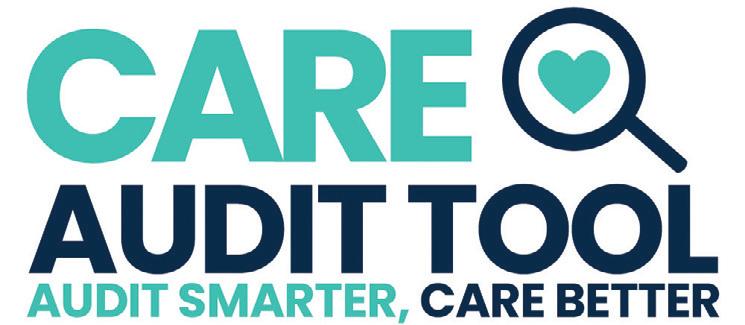
Our Enterprise Care Audit Tool enables care providers to improve oversight and respond to CQC requirements with confidence — delivering greater visibility, accountability, and control.
Now, we’ve made that same expertise and capability more accessible.
Our new cloud-based version is built on the same trusted foundation, giving providers of all sizes a faster, more flexible way to manage compliance with ease.
KEY FEATURES
• CQC-Aligned Dashboard - View audit outcomes and actions against CQC rating thresholds, with drill-down visibility for full organisational oversight.
• 100+ Ready-to-Use Audits - Covering all core operational areas including Care, Health & Safety, Estates, Catering, HR, and more.
• 2,000+ Question Library - Choose from a comprehensive library of questions, each aligned to statutory regulations and the CQC inspection framework.
• Automated Action Management - Audit outcomes that require follow-up are automatically fed into the dashboard and actions portal for clear accountability and tracking.
Reporting - Access a suite of structured reports to support internal reviews and inspection readiness.
• Engagement Surveys - Collect feedback from staff, service users, and relatives
STRESS LESS. TRACK MORE. BE READY.
If you’re spending hours chasing paperwork or stressed about being prepared for any inspection any day
- Care Audit Tool can help.
Website: careaudittool.co.uk
Email: info@careaudittool.co.uk
Phone: 0333 577 0807
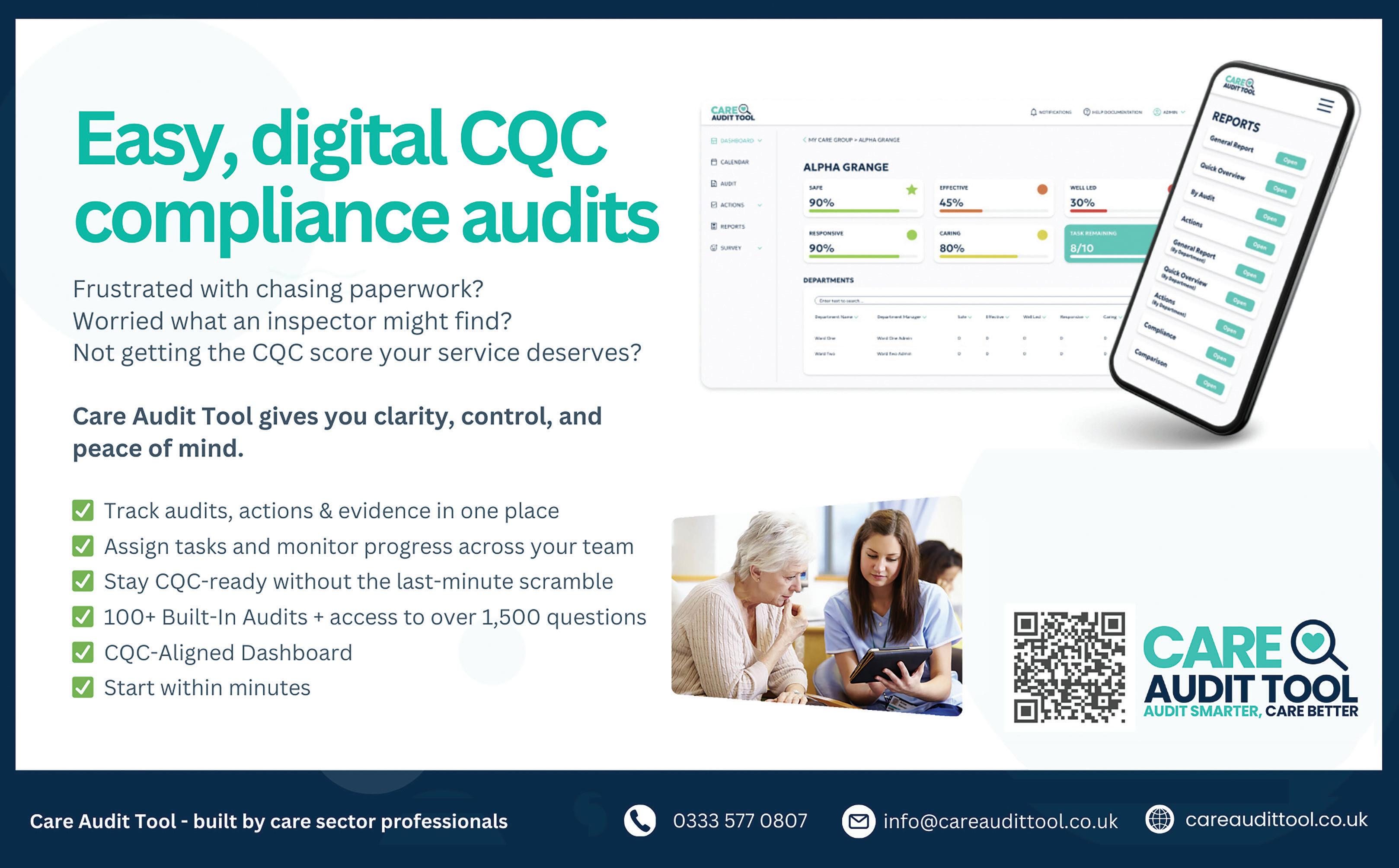
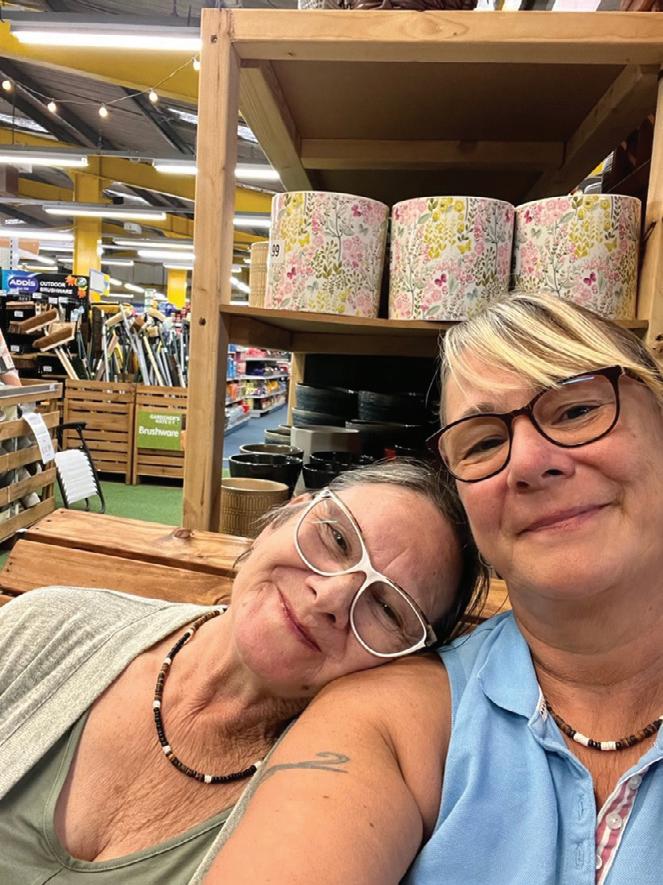
When Sharon’s mum Monica lost her partner and began struggling with her health, Sharon found herself trying to care from a distance—juggling a demanding job in Exeter with near-daily phone calls and constant worry about her mum, who lives alone with her two dogs in Barnstaple, Devon.
“Mum was always independent, but after losing her partner and being told she needed a hip replacement, she became withdrawn and physically frail. I was constantly worried,” said Sharon.
“I’d ring every morning to check she was up, had taken her pills, had something to eat. It was overwhelming.
“She didn’t want a carer. She insisted she didn’t ‘need care.’ But with living over an hour and a half away, I knew I needed to find some kind of support for both of us.”
Sharon learned about new technology being offered by her employer Bluebird Care N.E.W. Devon in partnership with Access Health, Support and Care (HSC), using discreet technology enabled care (TEC) to provide reassurance without intrusion.
The system, Access Assure, uses non-intrusive smart home devices – no cameras, no recordings – just sensors placed around the home to understand daily routines. Movements like opening a cupboard, boiling the kettle, and general mobility patterns are monitored, with alerts sent to family members if anything out of the ordinary occurs or daily living activity patterns change.
For Sharon, the reassurance was instant and the relief had an immediate positive impact on her own wellbeing.
Article supplied by The Access Group
“Suddenly, I wasn’t waking up worried. I knew Mum was up and moving, when the kettle went on, when she’d opened the medicine cupboard. And I knew I’d be alerted if anything changed for Mum.
“It completely changed our dynamic. I could go back to being her daughter again, not just her carer.”
A Bluebird Care N.E.W Devon professional now visits once a week to check the equipment and provide some company.
What started as a technical check-in is now something Sharon’s mum actively enjoys, helping ease the path toward accepting future care, should she need it.
“I didn’t expect technology to bring us closer,” Sharon reflected. “But it has. When I visit now, we go out, we laugh, we just enjoy each other’s company again.”
The smart system behind Sharon’s peace of mind uses AI to learn her mum’s typical routines and flag any irregularities, like missed medication or disrupted sleep, while preserving her Mum’s privacy.
It’s a lifeline that’s helping more families keep loved ones safe at home, without compromising their dignity or sense of autonomy.
“This has been a game changer for us,” Sharon said. “I’d recommend it to anyone.”
William Flint, Director for Bluebird Care N.E.W Devon said: “Using TEC has changed the way we think about care at home. It’s not just about early intervention or risk reduction, it’s about giving families space to reconnect, to be daughters and sons again for example, not just carers.
“It’s a powerful reminder that the right technology, used in the right way, can be deeply human.”
Andy Sparkes, Managing Director for Access TEC, added: “Access Assure is about more than sensors, smart technology, or even an intelligent dashboard that transforms data into meaningful action.
At its core, it’s about reassurance and restoring peace of mind. Families like Sharon’s shouldn’t have to choose between their loved ones living independently and their safety.
“This technology works quietly in the background, empowering individuals to live fulfilling and meaningful lives in the place they choose, while making sure someone’s always on hand if they need that extra layer of support.”
Following stories like Sharon’s, Bluebird Care N.E.W Devon is now preparing to roll out Access Assure across more of its services, bringing the benefits of technology enabled care to families across the region.
PASS by everyLIFE has announced the launch of PASSgenius™, a powerful new suite of data, AI and automation tools built into its award-winning care management software – marking a major step forward in digital innovation for social care.
Designed to turn complex data into clear, actionable insight, PASSgenius™ helps care providers make faster decisions, plan smarter rotas, reduce admin and stay ahead of risk – using the information they already collect.
Commenting on the launch, Robin Batchelor, CEO of PASS by everyLIFE, said: “Care providers are under more pressure than ever. With PASSgenius™, we’re giving them the tools to unlock the power of the data they already hold, helping them make better decisions, deliver safer care and free up time for what really matters.”

One of the standout features of PASSgenius™ is its AI-powered care note summaries – a tool that can scan weeks of care logs in seconds and highlights key changes in behaviour, health or mobility, helping
teams identify risks earlier and provide more responsive, person-centred support. Instead of reviewing long records manually, users receive concise summaries and recommendations that surface what’s changed and what needs attention, improving both care quality and continuity across shifts. At the heart of the new suite is the PASSgenius™ Dashboard – a fully interactive, customisable dashboard that provides real-time oversight across key performance areas, such as:
• Required hours: Spot gaps in care hours early and plan ahead
• Pending hours: See unassigned visits and fill them faster
• Travel time: Flag long journeys and improve routing
• Punctuality: Track lateness trends and take action sooner
• Cancelled hours: See costly cancellations and reduce repeat offenders
• Missed and overdue visits: Catch missed visits fast and protect care quality
PASSgenius™ is available now at no extra cost to All-in-one PASS users.
To learn more or see PASSgenius™ in action, visit: www.everylifetechnologies.com/passgenius
Under-25s (Generation Z) have much to offer the world of care, especially as it progresses. In a constantly adapting industry, young people are key to helping care companies grow with the times, especially surrounding technology.
However, young people make up only 11% of care workers. Why is this? What is keeping Gen-Z from joining and staying in the world of care?
With the average care worker aged 45 and over a quarter of the workforce potentially choosing retirement in the next 10 years, there aren’t enough young workers to pick up the many mantles left behind. With social care already having the highest number of vacancies in the UK, care providers cannot afford for this number to grow and for their workforces to decrease.
Supporting service users is no 9-5 or Monday to Friday job. This alone can be off-putting to the under-25s, who may juggle education and prioritise a larger social life.
This is what Gen-Z values. They have entered the career world understanding the importance of mental health and their worth in the workplace - and they are often viewed negatively for this. But they couldn’t be more correct.
Just as care services get a bad rep for offering a poor work-life balance, Gen-Z gets a bad rep for prioritising a healthy one. You can see the dilemma. So, how can this be fixed?
Irregular, unsociable hours, poor workload management, and low resources can easily lead to poor staff retention. From the most recent

findings in 2021-2022, care saw a high turnover rate of 53% for those under 20 years old while care workers over 60 had a rate of 24%. It’s common for shift-based workers to feel they have very little control over their working lives, leading them to accommodate the shifts they have no say over. Especially due to last-minute scheduling and changes, many shift workers often must change or completely scrap personal plans - or wait until after shifts are allocated - resulting in lives only revolving around work.
As much as someone can be a work-first individual, removing time
By Becky Mundie, RotaCloud (www.rotacloud.com)
for personal and social lives - and simply downtime - can be damaging in the long run, causing stress and mental health issues. Factor in graveyard shifts or being on-call, and the feeling is greatly exacerbated.
Is there any wonder, when combining this with the high workload and responsibility that comes with care, that the under-25s - the generation valuing mental health - make up so few care workers?
There are simple ways to remedy this, however.
Simply offering flexibility, allowing staff to have a say in the days and hours they work, and offering the ability to oversee shifts further in advance, can make all the difference.
Implementing digital automation allows staff to feel more in control of their work and lives. This alone can greatly improve employee experience.
Surprisingly, employee experience can go hand-in-hand with updated technology - and what goes hand-in-hand with technology? The generation that has grown up with it.
Not only does digital automation benefit your service users, employees, and overall business growth, but it will also make your workplace more attractive to the new generation - who, once joining, can make adopting these new technologies and processes all the smoother. Under-25s are the future, as well as new technologies. It’s time to start investing in both.
For further information on RotaCloud, please see facing page.

By Elena Martin, Director of Operations and Commissioning, Langdale Care
Homes Group (www.langdalecarehomes.co.uk)
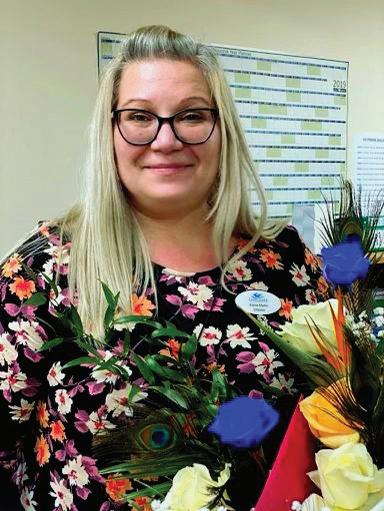
In the ever-evolving landscape of adult social care, it is essential to ensure that training initiatives not only equip care professionals with the necessary knowledge and skills but also nurture an environment where they feel confident and supported to deliver their best.
As a Registered General Nurse with over two decades of experience in the care industry, I have seen first-hand how thoughtfully designed training programmes can bring about meaningful changes that resonate with both staff and residents. These programmes, when aligned with the real-world needs of care professionals, have the power to transform not only the quality of care but also the overall morale and satisfaction within the care setting.
One of the key features of impactful training is its accessibility, relevance, and applicability to the challenges faced by care staff on a daily basis. From comprehensive first aid instruction to specialised courses on dementia care, well-designed training modules can provide care professionals with the tools and techniques required to respond effectively to a variety of situations. By prioritising the development of our staff's clinical proficiency, we enable them to deliver high-quality, person-centred care that focuses on the well-being and dignity of residents.
However, building confidence and capability goes beyond technical skills alone. It is equally vital to focus on the interpersonal skills that underpin meaningful relationships with residents and contribute to their overall happiness and fulfilment. Training programmes that emphasise relational care, for instance, can help care staff appreciate the importance of creating an atmosphere of trust and understanding. By encouraging
staff to focus on these human aspects of care, we cultivate a setting that radiates warmth and kindness, ensuring that residents feel valued and respected.
Moreover, to ensure that staff can consistently provide the best possible care, our training must remain adaptable and responsive to emerging trends and best practices in the sector. By implementing regular refresher courses, we reinforce foundational knowledge, address any skill gaps, and ensure that care professionals are up to date with the latest advancements. Similarly, ongoing supervision and performance evaluations play a vital role in identifying opportunities for professional growth, creating a framework of accountability and continuous development. This commitment to lifelong learning not only enhances the quality of care but also reinforces a sense of purpose and pride among staff.
The ripple effect of robust training programmes extends far beyond individual care professionals. When staff feel confident, valued, and well-equipped, they are better positioned to deliver exceptional care that is tailored to the unique needs and preferences of each resident. This, in turn, results in improved well-being for residents, greater peace of mind for their families, and stronger outcomes for the care community as a whole.
At the core of our training philosophy lies the understanding that empowered staff lead to empowered residents. When care professionals are equipped with the knowledge, skills, and assurance to excel in their roles, they are better able to encourage residents to maintain their independence, involve them in decisionmaking, and take the time to truly listen to their stories and concerns.
In conclusion, aligning training with the practical needs of both staff and residents goes far beyond fulfilling regulatory requirements—it is the foundation for fostering confidence, compassion, and excellence in adult social care. As we look ahead to the challenges and opportunities of the future, let us remain steadfast in our commitment to investing in our staff, enabling them to make a lasting difference in the lives of those they care for.
In today’s care home environment, staff training is under constant pressure. Limited time, tight budgets, and high workloads mean traditional training methods often struggle to keep up. Yet, with complex conditions like diabetes affecting up to one in four residents, there’s never been a greater need for effective, accessible learning.
Game-based learning (GBL) offers a powerful way forward. Whether through board games, card games, or digital tools, GBL turns essential training topics into engaging, memorable learning experiences that fit seamlessly into busy care home routines. It’s proven to boost knowledge retention, spark discussion, and improve practical understanding.

Focus Games (www.focusgames.com) leads the way in this space, with a wide range of evidence-based games developed for health and social care. Their innovative Virtual Care Home is a standout example—a digital environment where staff can explore realistic care scenarios, click on hotspots, and practise deci-
Do you want to provide Gold Standard end of life care in your Care Home?
Sign up to our Training & Accreditation Programme today and receive 50% Off! (Limited-Time Offer)

Offer Includes:
8 live interactive webinars over 6 months, led by a clinical team
Ongoing support and access to the GSF Member’s Area
GSF Accreditation, enhancing your CQC rating and setting your care home apart
Next Steps:
Autumn training begins 10 September – secure your place today by scanning the QR code below. th Use discount code: GSFCarer25 to get the full programme for £1,095 + VAT
Everyone deserves Gold Standard end of life care.


sion-making in a safe, simulated setting. From managing blood glucose to identifying signs of hypoglycaemia, staff gain confidence in handling real-world challenges. All on their pc or smart pnone!
Best of all, these ready-to-use resources are designed to be flexible. Maximising every learning opportunity. With options tailored to your setting, including customisable content and multi-modal learning styles, there's a solution for every home. In a sector facing increasing demands, GBL offers a costeffective, forward-thinking way to build skills and confidence. Whether you're new to game-based learning or ready to take it further, now’s the time to explore the difference it can make. To discuss our virtual care home resource contact info@focusgames.com.
See our cover advert for a special discount code to get started today. Visit www.focusgames.com

As our population ages, the need for compassionate, high-quality end of life care is more pressing than ever. The Gold Standards Framework (GSF)
Charity is helping to meet this challenge by supporting health and social care teams to deliver care that truly makes a difference.
Through its nationally recognised Service Improvement Programme, GSF equips staff with the skills, confidence, and structure to provide proactive, person-centred end of life care. The results speak for themselves: 97% of organisations report better experiences for residents and families.
GSF Accreditation is more than recognition - it’s a mark of quality that is CQC-recognised, sectorendorsed, and impactful across entire organisations.
Whether you're in a care home, GP practice, hospital, or community service, GSF helps embed a culture of dignity, compassion, and coordinated care. Hundreds of organisations have already joined the GSF community, raising the standard of care for those nearing the end of life.
Find out how your team can get involved at: www.goldstandardsframework.org.uk
Future-proof your care. Empower your workforce. Everyone deserves Gold Standard end of life care.


Cyber security is an increasing concern in social care, with data breaches, phishing scams, and cyber attacks putting sensitive information and essential services at risk. However, learning about cyber security can often feel overwhelming, full of jargon, and difficult to apply to everyday situations. That’s where the Digital Care Hub’s new Cyber Game comes in—an engaging, interactive way for adult social care providers to learn vital cyber security skills.
Learning doesn’t have to be dull. In social care, where training is essential but time is scarce, gamification—using game-like elements such as quizzes, rewards, and interactive challenges—makes learning more engaging and memorable. It provides a safe space to learn and make mistakes, increasing engagement, motivation, and knowledge retention. Gamification also allows for instant feedback and supports long-term behaviour change, making it an effective tool for cyber security training.
The Digital Care Hub has launched the first-ever Cyber Game designed specifically for adult social care providers. It offers a fun and practical way to learn about cyber security and data protection, helping care managers, care workers, and other staff members develop the skills they need to keep their organisation safe.
The Cyber Game takes players through real-world scenarios relevant
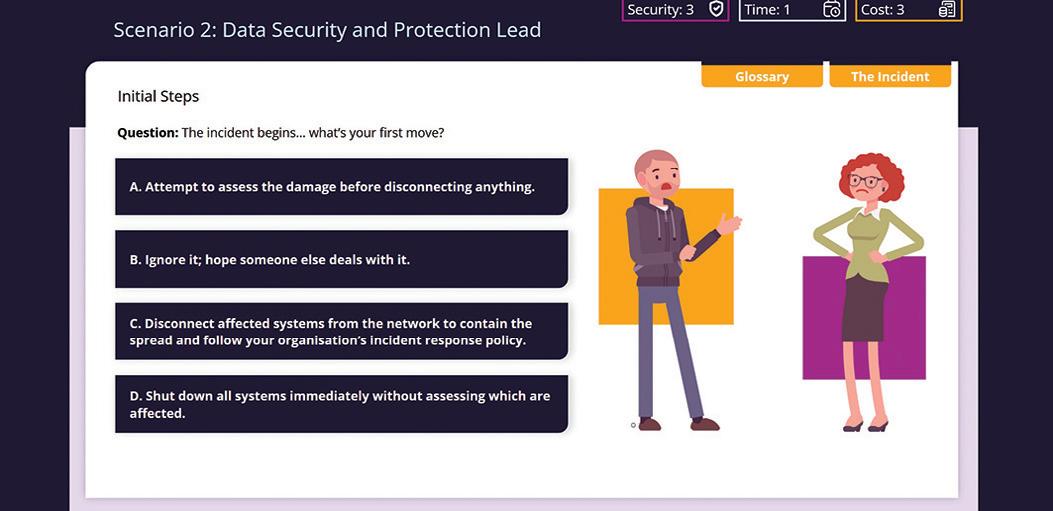
to social care settings, making it easier to recognise and respond to cyber risks in a safe environment. Whether it’s identifying a phishing email, ensuring secure data sharing, or responding to a cyber incident, players gain hands-on experience that translates directly to their work environment.
One of the biggest challenges in cyber security training is making it relatable. The Cyber Game brings cyber risks to life through realistic characters and workplace situations. Players can take on the role of a registered manager, a data protection lead, or a care worker, each facing different cyber threats.
Each scenario is based on real cyber incidents that have affected
social care providers. The goal is to manage the crisis effectively—containing the damage, notifying the right people, and implementing steps to prevent future incidents. Decisions impact security, time, and cost, requiring players to balance risk and consequences.
WHY GAMIFY CYBER SECURITY TRAINING?
Daniel O’Shaughnessy, from the Digital Care Hub, explains:
“We created the Cyber Game to make cyber security training more accessible and engaging. Gamification encourages active participation and helps staff retain information better, making learning feel rewarding and practical.”
WHAT CARE STAFF SAY
Care staff who tested the game found the scenarios helpful and realistic:
“These are good scenarios – typical and indicative of what may occur and give people an idea of what they need to be thinking about.”
Through interactive decision-making, players experience the consequences of their choices, reinforcing key lessons in a way that traditional training cannot.
TRY THE CYBER GAME TODAY!
The Cyber Game is available online, completely free to play. It’s a great way for care providers to improve their cyber security awareness in an engaging and practical way.
Play the game online at: www.digitalcarehub.co.uk/cyber-game
The delivery of safe care is the paramount responsibility of social care providers. Central to achieving this is the governance framework adopted by service providers. And at the core of this framework are policies and procedures. These enable the provider to comply – and evidence compliance – with relevant legislation and regulations, as well as facilitating best practices, supporting business needs, and assisting in recognising and managing risks.
Providers have a legal duty of care to the people they employ. Policies and procedures should provide clear guidelines to staff on how the organisation operates, as well as informing them of best practices and processes to be followed.
Policies should be reviewed annually as a minimum to ensure they are still fit for purpose and align with legal and regulatory requirements. They should be reviewed not only by employees of the business, but also by experts in various subject matters (e.g., infection control or medicines management).
For many small- to medium-sized providers, there may not be the in-house skills, knowledge, and experience to complete such a robust annual review. Many choose instead to purchase their policies and
procedures from a reputable provider like W&P Compliance & Training, who will also complete reviews and ensure their policies and procedures remain up to date. This way a provider not only ensures they remain compliant; they also benefit from best practice policies and procedures that provide a solid foundation for safe working practices and – ultimately – protect and support service users and staff.
Ben Erskine – Director at W&P Compliance & Training www.wandptraining.co.uk | Tel: 01305 767104

See the advert on page

By Satya Cashman, Partnerships Manager for national charity Dementia Carers Count
Here at Dementia Carers Count we’re supporting professional carers, looking after increasing numbers of people with dementia. Day in, day out, we provide emotional advice and practical support to family carers, as they cope with the challenges of dementia care. Those challenges don’t stop when a loved one moves to a care home. They change. And what many families tell us is, they would like better support from the professional carers they meet.
In fact, of the 1,300 family dementia carers who responded to our 2023 survey, only one third agreed that paid carers understood their needs. This is worrying, given the best possible person-centred care is only possible through working in partnership with families
With estimates of the number of professional carers receiving dementia training as low as 29%1, it could be that some carers just don’t have the training or practical experience to support families well. But most care homes invest in regular dementia training, and a host of other professional requirements. Despite this, many families are not confident about paid carers’ understanding of dementia. Only around a quarter (27%) of our 2024 survey respondents said that paid carers had a ‘good understanding of dementia and dementia care2
So, what could you do differently to ensure your busy, committed and hard-working team have everything they need to support residents and families with the care and compassion you’d want?
Well, whilst you’re busy arranging shift patterns, cover, inspections,
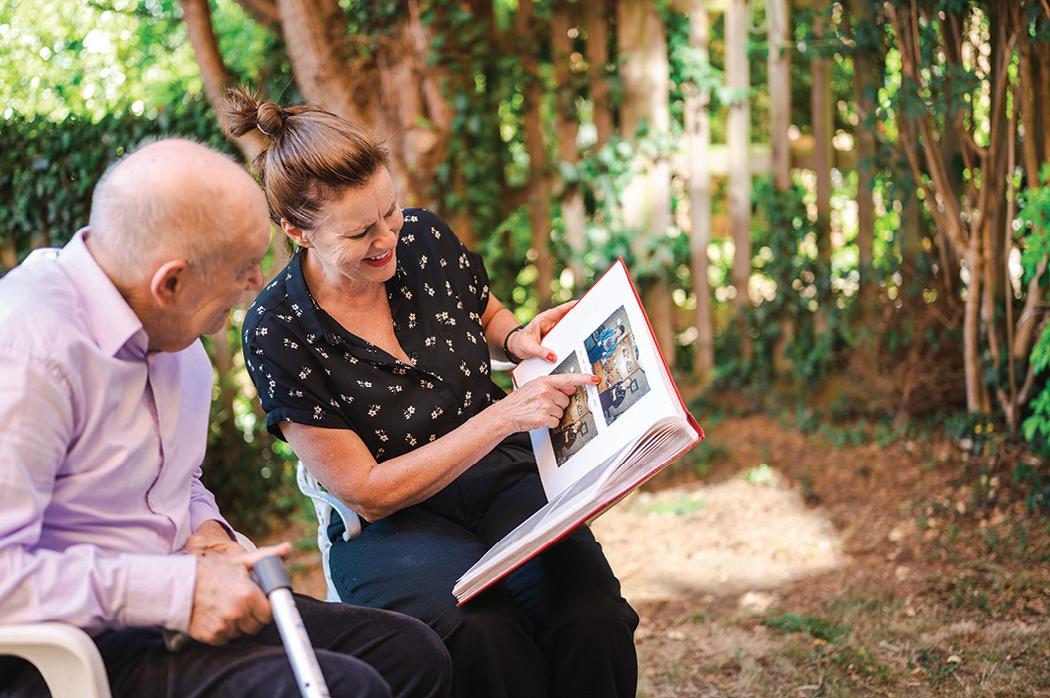
visits and the rest, it’s easy to overlook problems with the current basic training model:
1. Dementia has so many presentations, and no one prognosis, affecting every person differently. To provide high-quality, person-centred care for people with dementia, you need a wide range of knowledge from a broad practice base.
2. Staff churn is challenging for any care business. But all too often, staff
move on because they don't feel confident or supported by low-quality training, when they do face those challenging situations.
3. It’s tough getting carers together for a whole or half day of training. Arranging shift patterns and cover, transport from other sites, or managing sickness and emergencies.
At Dementia Carers Count, we understand the pressures you face and the genuine commitment you have to your residents. As a dedicated charity, our mission is to improve support for anyone caring for someone with dementia. That’s why we’ve developed short, regular interventions, delivered live by trainers with experience and insight, to help your staff understand all the dimensions of expert dementia care for your clients and their families.
Our 90-minute format minimises disruption to your schedules, while maximising learning outcomes. These focused sessions share genuinely useful knowledge in an accessible and engaging way. And as all our CPD accredited training comes from years of experience supporting carers, you can feel confident you’re your staff will learn from the very best. What’s more, proceeds from our training go to our work for family carers across the UK. When you work with us, you're supporting your team and your local community.
To speak to Satya and find out more about training – visit www.dementiacarers.org.uk/what-we-do/dementia-training
A host of health and social care courses delivered by leading training provider Realise have received the new Quality Assurance Care Learning Services (QACLS) endorsement.
The Department of Health and Social Care (DHSC) has taken on responsibility for reviewing the quality of individual courses and qualifications delivered by training providers within the sector.
Realise submitted 11 of its health and social care
programmes to be quality assured – and all received the stamp of approval, including the Level 2 Adult Social Care Certificate.
Funding for health and social care qualifications is now provided through the Government’s Learning and Development Support Scheme (LDSS), which has replaced the Workforce Development Fund.
From April this year, only courses and qualifications delivered by training providers that have been
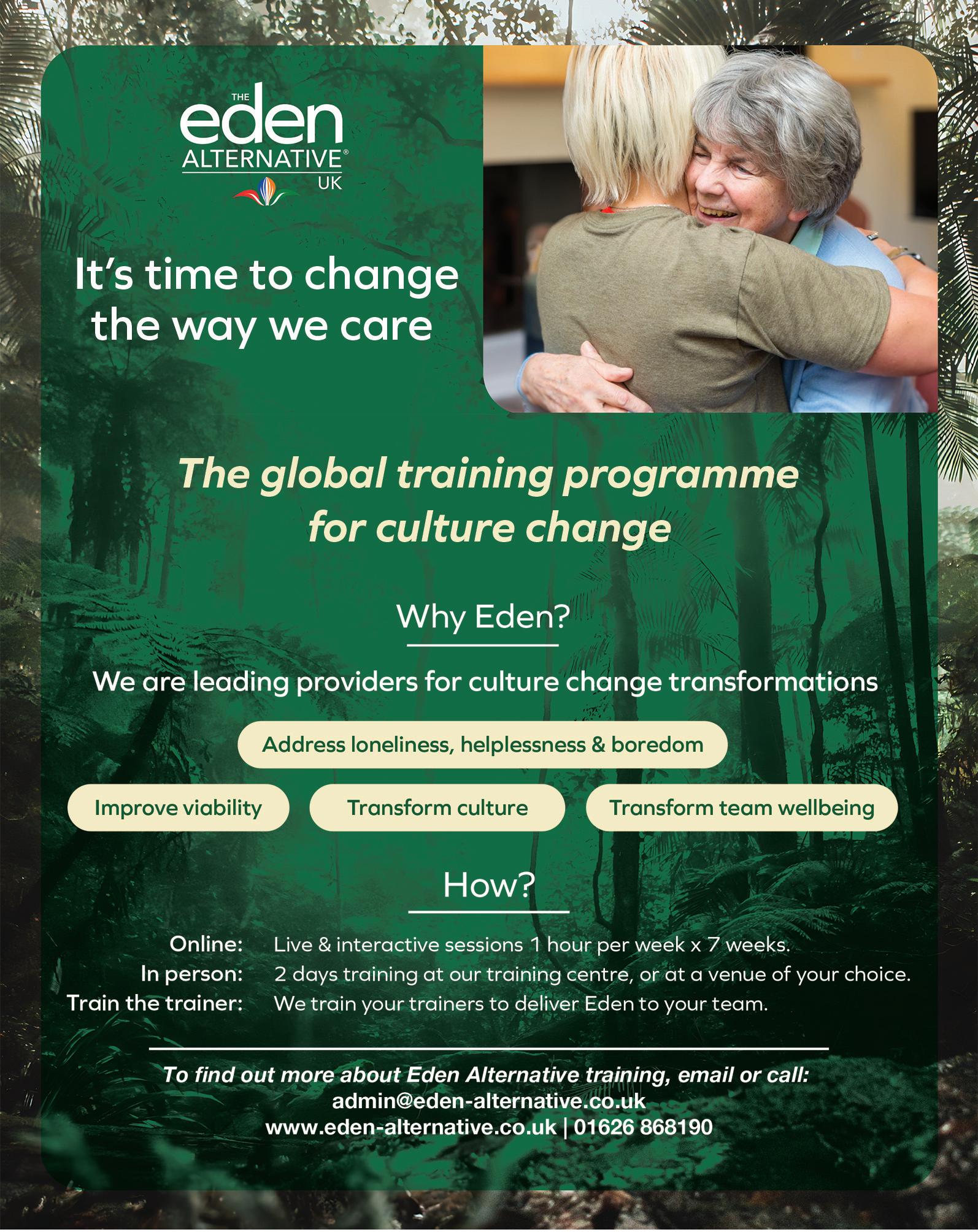
QACLS endorsed will be identified as preferred options by LDSS.
And from next year onwards, employers will only be able to claim LDSS funding for courses that have been quality assured.
Care providers currently have to replace almost a third of their workers each year due to staff leaving their jobs. This high turnover has a negative impact on the quality of care - and the DHSC hopes the QACLS endorsement will help boost retention.

Lesley O’Connor, Head of Strategic Development at Realise, said: “We are absolutely delighted to be one of the first training providers to achieve endorsements across a wide range of courses.
“This new system marks a step-change for the industry as it means, for the first time, individual courses are being reviewed rather than the training provider as a whole in an attempt to drive up standards.
“The approval process was thorough, looking at evidence of quality of delivery, testimonials, achievement rates and policies.
“Being QACLS endorsed is very important as it demonstrates quality and also allows employers to continue to claim LDSS funding. Soon employers will have to pay the full price for programmes that are not endorsed.
“We look forward to working with employers who
"23 years, operating 4 Devon Nursing homes, has been pretty tough, as anyone in social care, knows, only too well. And if it was hard already, after 2024 budget, it's just got harder.
Anyway, at heart, I am just customer of Eden Alternative, and it was a stroke of luck to come across this whilst on holiday in New Zealand in 2009. It started in USA in 1994 and now runs in 22 countries.
The fact that I am now involved with this not-forprofit organisation (in the UK area) came about when one of the 2 main UK directors died suddenly just before Covid. But it's something I have run with for 11 years to help make 'vision' a reality, not a struggle. So, being both a customer and helping the admin seems quite natural.
It is a modern philosophy of care, but moreover, it's
can benefit from quality assured training.”
The QACLS endorsement lasts for three years, with regular monitoring every six to nine months.
Realise will strive to have all its health and social care programmes approved through QACLS during phase two and three of the process. Phase two runs from now until the end of the 2025-26 financial year, and phase three follows immediately after.
The Government says it is "fully committed to a professional, well supported social care workforce" with learning, development and training that is "of outstanding quality, relevant and accessible".
The full list of Realise’s 11 quality assured courses are: Level 2 Certificate in Understanding Autism, Level 3 Certificate in Understanding Autism, Level 2 Adult Social Care Certificate, Level 2 Certificate in Understanding the Care and Management of Diabetes, Level 2 Certificate in Falls Prevention Awareness, Level 2 Certificate in Understanding Nutrition and Health, Level 3 Diploma in Adult Care, Level 4 Diploma in Adult Care, Level 5 Diploma in Leadership and Management for Adult Care, Level 2 Certificate in Understanding the Safe Handling of Medication in Health and Social Care and Level 2 Certificate in Awareness of Mental Health Problems For more information, visit www.realisetraining.com
a programme that is straight forward, tried and tested for 30 years and really works. Its member care organisations generally become trainers for their own teams, and run it themselves. The programme is run in person over 2-3 days or online 1 hr a wk for 7 weeks. You choose. It addresses loneliness, helplessness and boredom and operates through 10 principles to underpin 7 critical domains of wellbeing.
Moreover, it's effective, transformational and really works. As residents, and team members wellbeing, matter so much , it's a must, in my opinion. Geoffrey Cox Southernhealthcare.co.uk eden-alternative.co.uk"



From April 2022, the Health and Care Worker visa route gave UK care providers a desperately needed pipeline to international talent. But with the current Labour Government signalling an end to this route, providers are once again staring into the eye of a workforce storm.
It’s a pivotal moment. The social care sector already faces more than 150,000 vacancies. Labour costs are rising sharply, up to 10% in 2025 alone, driven by increases in the National Living Wage and employer National Insurance contributions. Now, with international recruitment under threat, many operators will see their already narrow options for staffing become even tighter.
Ending the care worker visa route is more than a headline, it has real operational consequences. It’s no secret that providers have leaned heavily on overseas hires to fill roles that remain persistently unattractive to the domestic workforce due to pay, flexibility and public perception.
Cutting off this access will likely drive greater dependence on agency staff, which are not only costly, often commanding 30% premiums, but also disrupt continuity of care and team morale.
Even before this immigration shift, providers were bracing for significant
financial pressure. A typical organisation with a £100m income is already facing £5.5m in additional labour-related costs, including £7m from wage increases and £5m from higher employer NI contributions.
And that’s without factoring in the operational impact of the upcoming Employment Rights Bill. Since April, predictable scheduling, compensation for last-minute changes and stricter zero-hours rules have become mandatory. That means more administrative load, less flexibility and higher staffing costs.
In short, the financial squeeze is very real. And the traditional cost-cutting playbook, reducing staff ratios, asking councils for more funds, or freezing employee benefits, is no longer viable, especially when quality of care and compliance are non-negotiable.
A modern response: smarter operations. So what now?
The good news is that providers aren’t powerless. The most resilient organisations are shifting from reactive crisis management to strategic operational transformation. That means investing in systems that make labour smarter, not just cheaper.
In our latest industry report, we break down how providers are already unlocking significant savings and efficiencies through smarter operations.
Modern shift management platforms, for instance, allow providers to surface open shifts to existing team members quickly, reducing the need to fill gaps with costly agency staff. In one example, agency spend dropped by 38% within four weeks of deploying a new digital scheduling solution.
Additionally, better time tracking tools with geo-fenced clock-ins and payroll integrations have helped providers save up to £4.2m annually by avoiding overpayments and automating manual processes.
Intelligent scheduling systems now also use commissioned hours and
By Abbey Milne, Social Care Lead of Sona (www.getsona.com)
real-time staffing data to avoid both understaffing and costly overstaffing. This has led to 2–5% savings in total labour costs, equivalent to up to £3m for some organisations.
With new compliance demands arriving this year, reducing the administrative burden is critical. Tools that consolidate scheduling, HR and payroll into one workflow can free up hundreds of hours per year, allowing managers to focus on team support and care quality.
This isn’t just about efficiency, it’s about survival. According to a recent Hft and Care England report, a third of providers are now considering exiting the market due to cost pressures and long-term uncertainty. But those who embrace operational transformation stand a chance not just to weather this shift, but to emerge stronger.
At Sona, we help social care providers meet today’s challenges head on, with solutions that drive efficiency, empower teams and elevate care. Advinia, a residential care provider with over 4,000 employees, was spending between £35,000 and £40,000 a week on agency cover. After transforming their internal scheduling strategy, they brought that figure down to £16,000 a week, a change that’s not just financial but operationally transformational.
As leaders, we need to view this moment not just as a policy change but as a call to action. The gap between those who invest in smart systems and those who don’t is widening, and fast. Providers that digitise their operations, empower their teams, and deliver consistently high-quality care will be the ones who thrive in this new era.
While we can’t control the economic landscape, we can control how we adapt. The providers who do so with agility and foresight will help shape the future of social care, not just survive in it.

We are a leading supplier of comprehensive healthcare staffing solutions to care, residential and nursing homes, hospitals, medical facilities and establishments that need person-centred personnel.
By providing staffing solutions that are both cost-effective and highquality, Nexime Healthcare helps with everything that is required. Our extensive database of experienced Support Workers, Carers, Healthcare Assistants and Nurses of various specialities is available to provide highquality care on demand to our clients for:
• One-off shifts, staff absence and shortfalls (often at very short notice),
• Establishing a new unit, whilst permanent staff are recruited,
• Emergency cover during very busy periods,
• Temporary or permanent positions,
• Regular support to full-time teams,
• Contract or SLA (Service Level Agreement) arrangements.
We’re a one-stop, temporary employment business operating nationwide and providing dependable and experienced Nurses, Healthcare Assistants, Carers, Support Workers, domestic and other types of staff.
We are proud of our values, manners, good timing and a friendly ‘can do’ attitude. We’re professional and our clients know that there’s no substitute for our dependability, reliability and our prices.
Owned and managed by people who have years of experience within the healthcare sector, Nexime Healthcare knows what it takes to match the right staff with clients needs. Using our insights into what is required
for each situation, we provide a service with professionals trained for each and every scenario. With access to a broad network of available staff, we can find the right person for the assignment. Nexime Healthcare will make sure you gain access to the reliability, flexibility and experience that you need to support your own clients. We know how critical these are to you.
What we have always done better than anybody else is to provide the highest quality care staff. We apply internal Quality Assurance Systems, that are continually being improved, during our rigorous hiring process. It is essential to us and our clients that our staff are compliant. 0151 673 1899
info@neximehealthcare.co.uk www.neximehealthcare.co.uk
A TEAM of experts have come together to disrupt the expensive and complex social care system by launching an ‘app’ to bring care homes/providers and carers together using AI.
AgoraStaff, a temporary staffing app for the social care sector, is the brainchild of Richard Williams-Pears, a longstanding Cornwall councillor and former mayor of St Austell, who saw firsthand the rising costs and inefficiencies in social care.
He teamed up with his wife Jolene, AgoraStaff’s Director of Outstanding Compliance, who has an extensive background in operating theatres, and Janet Shreeve, who brings hands-on care sector experience from running Shreeve Care Services, based in Wiltshire.
Together, they partnered with tech experts Ben Grave and Simon Wetherell —creators of the UK’s leading asbestos management system - to bring the app to life.
Richard said: “Providing care is expensive and it’s even more expensive if a care home, local authority, or other care provider has to pay an agency to find carers, particularly at the last minute. The carer gets minimum wage, or just above and the agency takes a hefty cut on

average around 30% of the fee from the provider.
“We felt there had to be a better way, using modern technology, to speed up this process leaving more money available for carers and providers. So much money is lost on agencies sitting in the middle between providers and carers, our app is designed to cut through this inefficiency.
“We have therefore combined deep sector knowledge with smart tech.”
Janet Shreeve is the Chief Business Development Officer

for AgoraStaff. She said:
“Many carers throughout the UK are self-employed and rely upon agencies to find them suitable shifts. Our marketplace gives them the opportunity to not only register for free but have complete control over the shifts they apply for and undertake.
“We are committed to ensuring the carers within our marketplace are the best professionals for individual roles. We achieve this with a vetting process to ensure they are legally entitled to work in the UK (if relevant) and must register their relevant training. They will also have the option to undertake more training to enhance their rolesa concept not commonly found within traditional agencies.”
AgoraStaff goes live week commencing May 19th in Somerset and the surrounding counties.
Care providers can sign up for the app for a monthly fee of £34.99 per location (plus five per cent from the agreed daily shift fee) and trained carers sign up FREE once they have completed the vetting process.

Jennifer
Moore, Director at Leonard Curtis Legal

Succession is one of the most pressing and personal decisions a care business owner will make. For many founders, particularly those who have built a service rooted in compassion, community and quality of care, handing over the reins is far more than a financial transaction. It’s also about legacy.
Increasingly, owners in the care sector are choosing to exit through Employee Ownership Trust (EOT); a structure that avoids the disruption that can often accompany third party sales, while simultaneously safeguarding their values, rewarding their team and securing long-term continuity.
At Leonard Curtis Legal, we’ve supported a growing number of businesses through the transition to employee ownership. In our experience, it’s not just a legal process, it’s a cultural shift that is transforming how businesses plan for the future.
An EOT is a government-backed ownership model that allows a business owner to sell a controlling interest (more than 50%) of their company to a trust set up for the benefit of all employees. If certain conditions are met, the sale is then exempt from Capital Gains Tax
(www.leonardcurtis.co.uk) discusses the growing number of care home businesses choosing Employee Ownership Trusts and explores the benefits for founders within the care industry.
(CGT), which is an obvious benefit for those planning retirement or succession.
While the trust doesn’t run the business, it does own it on behalf of the workforce. Decisions continue to be made by a management team, but under a new structure where the staff are the ultimate beneficiaries. In an industry where staff retention, engagement and continuity of care are vital, EOTs offer a compelling alternative to trade sales or private equity investment.
The values behind employee ownership align closely with the realities of social care. Businesses succeed here because of their people –the carers who turn up day after day to deliver life-changing support. Yet many of these same staff face limited recognition or reward. EOTs done well can help to rebalance that.
Businesses adopting the EOT model often benefit from improved staff retention and morale, a stronger sense of shared purpose and an increased perception of trust and credibility both internally and externally.
EOT-owned companies can also pay staff annual tax-free bonuses of up to £3,600, providing a meaningful benefit in a sector struggling to compete on wages alone.
LEGAL AND PRACTICAL CONSIDERATIONS
It’s important to remember that this is a legal transaction and one that must be carefully structured. To qualify for CGT relief, several conditions must be met. The EOT must acquire more than 50% of shares and voting rights, and the company must be a trading business and not an investment vehicle. It must also benefit all employees on equal terms and the former owners must not retain control.

Once established, the trust is governed by a board of trustees usually including independent members and employee representatives. It’s vital that the governance structure reflects both the legal requirements and operational needs of a care provider.
However, in the care industry it’s not only about meeting technical criteria, we must also think about designing governance models that work for regulated services. That means considering CQC implications, continuity of leadership and long-term financial planning.
FUNDING THE TRANSITION
A common concern is whether a care business can afford to buy itself. In most cases, the purchase is funded through future profits of the company with the outgoing owner receiving deferred payments over time. Some providers also access third-party lending to accelerate the process.
Robust cash flow forecasting is key. Margins in the sector are often tight, so careful modelling is essential to ensure the business remains stable while making repayments. We work alongside accountants and lenders to manage this risk.
A FUTURE-PROOF MODEL FOR VALUES-LED CARE
What sets EOTs apart is the ability to exit and secure a fair financial return while keeping the culture and purpose of the business intact. In a sector increasingly shaped by scale and commercial pressure, that’s a powerful proposition.
For owners who have built care services with love and long hours and who want to leave something meaningful behind, employee ownership is more than a tax-efficient exit. It’s a legacy model.
In the care sector, time is one of the most precious—and limited—resources. Whether it’s a nurse supporting an elderly resident or a finance officer reconciling invoices across multiple funding streams, every hour counts. Yet while much attention is given to frontline care, a quieter crisis is unfolding behind the scenes: payment inefficiencies.
Care providers operate in one of the most complex funding landscapes in the UK. Between over 150 local authorities, 42 Integrated Care Boards, and thousands of self-funders, the process of paying and being paid is often fragmented and manual. That complexity doesn’t just create paperwork—it creates risk.
Late supplier payments can disrupt services. Missed payroll deadlines can cause stress for care workers, many of whom live paycheque to paycheque. In a sector where emotional labour is high and financial stability is rare, a delayed or inaccurate payslip can tip the balance from just coping to burning out. When the back office falters, it impacts the front line.
As Victoria Ramsay, founder of Aequalis Accountancy, put it: “There’s a vicious circle. Late invoices mean poor cash flow, which means providers can’t afford to invest in the very systems that would solve the problem.”
And with care workers under unprecedented strain, payroll isn’t just an admin task—it’s a matter of respect. Timely, accurate payments send a clear message: we value you. Delays or errors, on the other
hand, erode morale and trust at a time when retention is already a challenge.
The good news? Change doesn’t always require sweeping reform. One of the biggest wins can come from automating payroll and payments. Faster Payments, for example, allow providers to process transactions in seconds—not days—giving finance teams the flexibility to act quickly and confidently.
Crucially, automation frees up time. According to industry data, automating care payroll can reduce processing time by up to 90%. That’s hours saved every week—time that can be redirected back into care, strategy, and staff support.
What’s often missing from transformation conversations is this: operational efficiency is human efficiency. Every error avoided, every minute saved, helps build a care system that’s not just compliant, but compassionate.
In a sector stretched thin, improving payments isn’t a “nice to have.” It’s a foundation for dignity, stability, and sustainable care.
To learn more about how care providers are modernising payments, visit Modulr at www.modulrfinance.com/care-payments



Aston Brooke Solicitors provides sponsors with an invaluable insight in the Home Office interview and inspection process and how to remain compliant.
Request a UKVI mock audit to see if you are compliant
Email Visit our website km@astonbrooke.co.uk www.astonbrooke.co.uk


